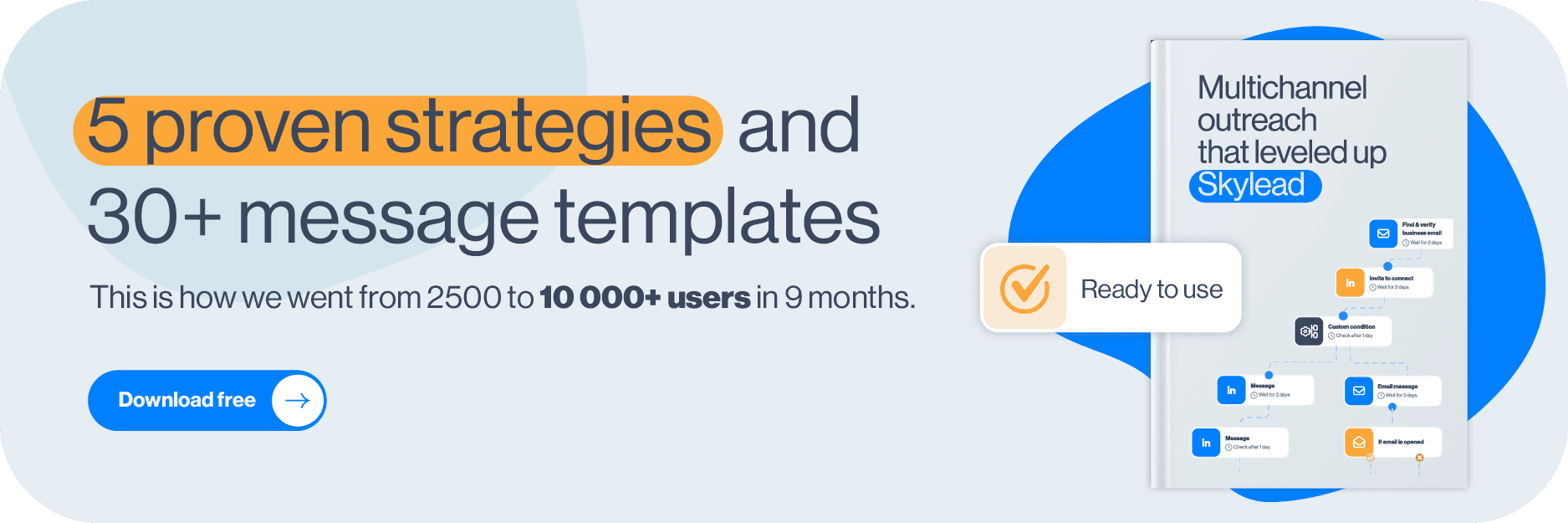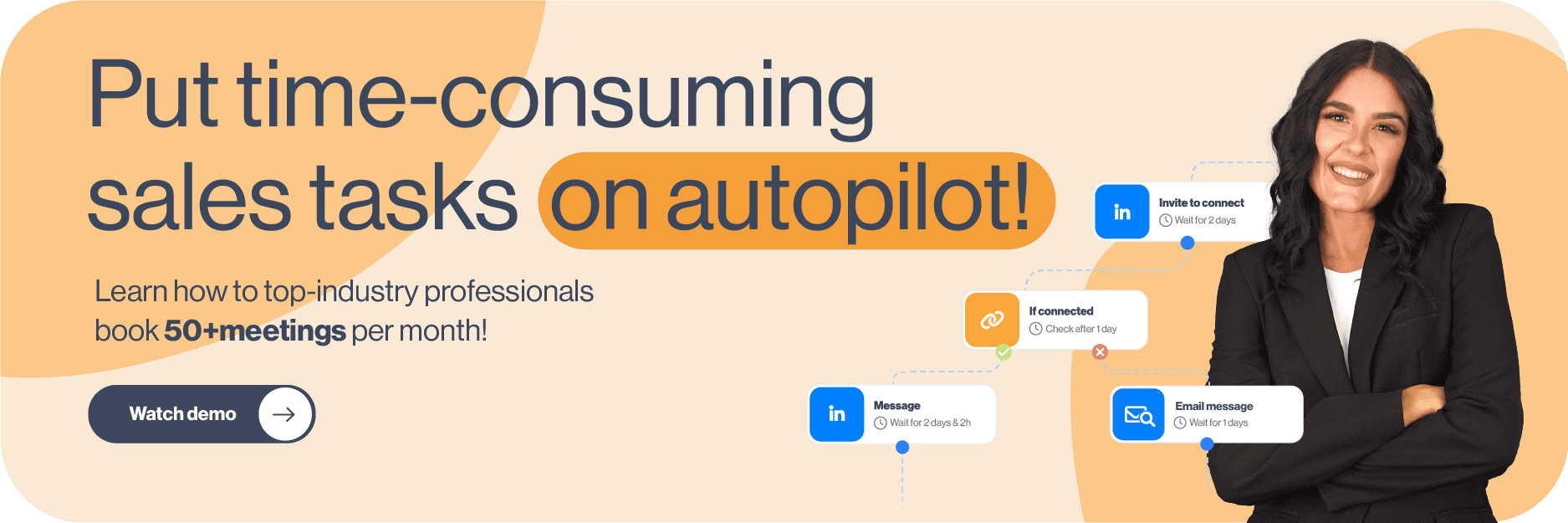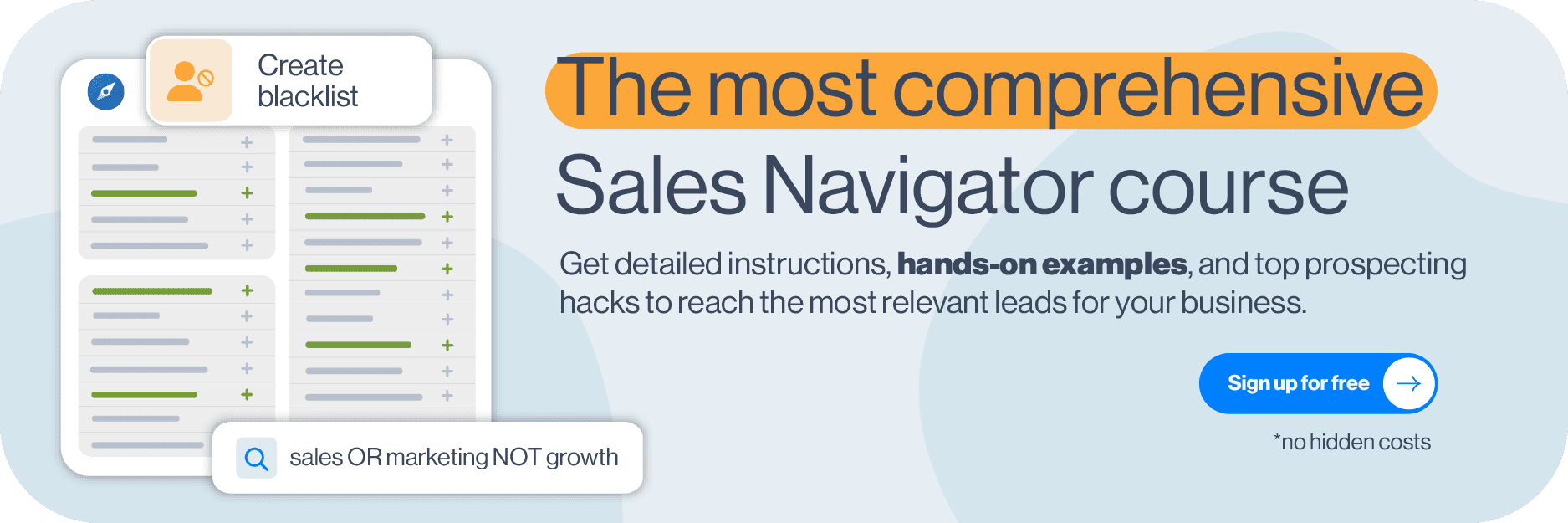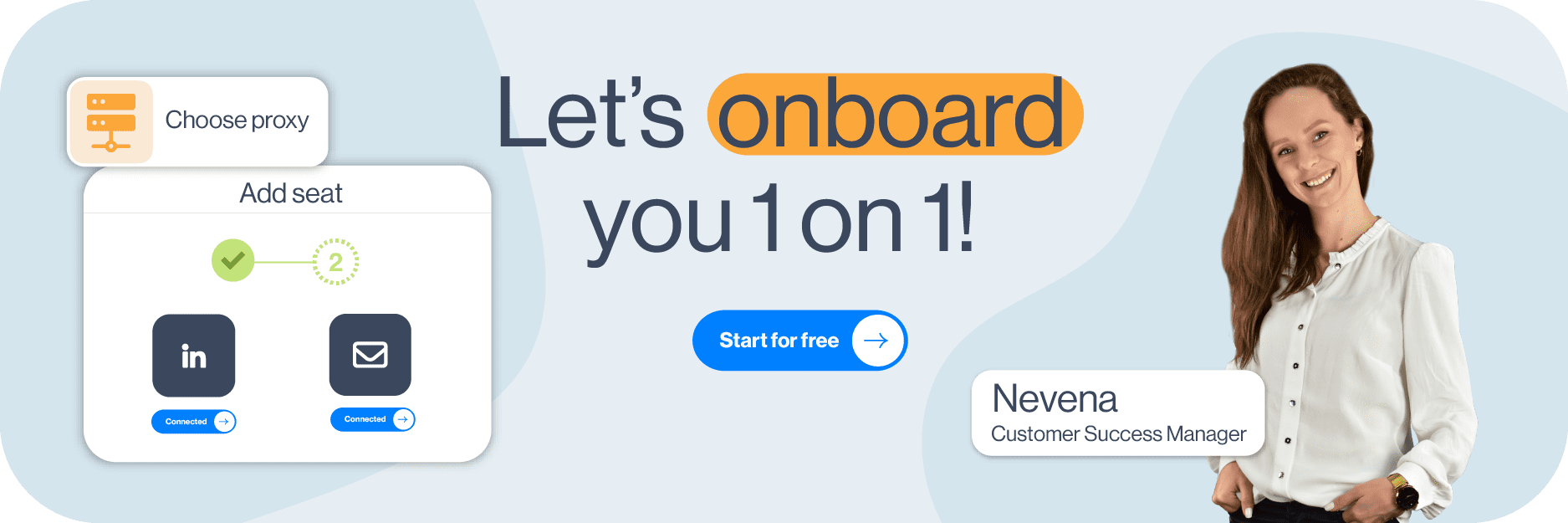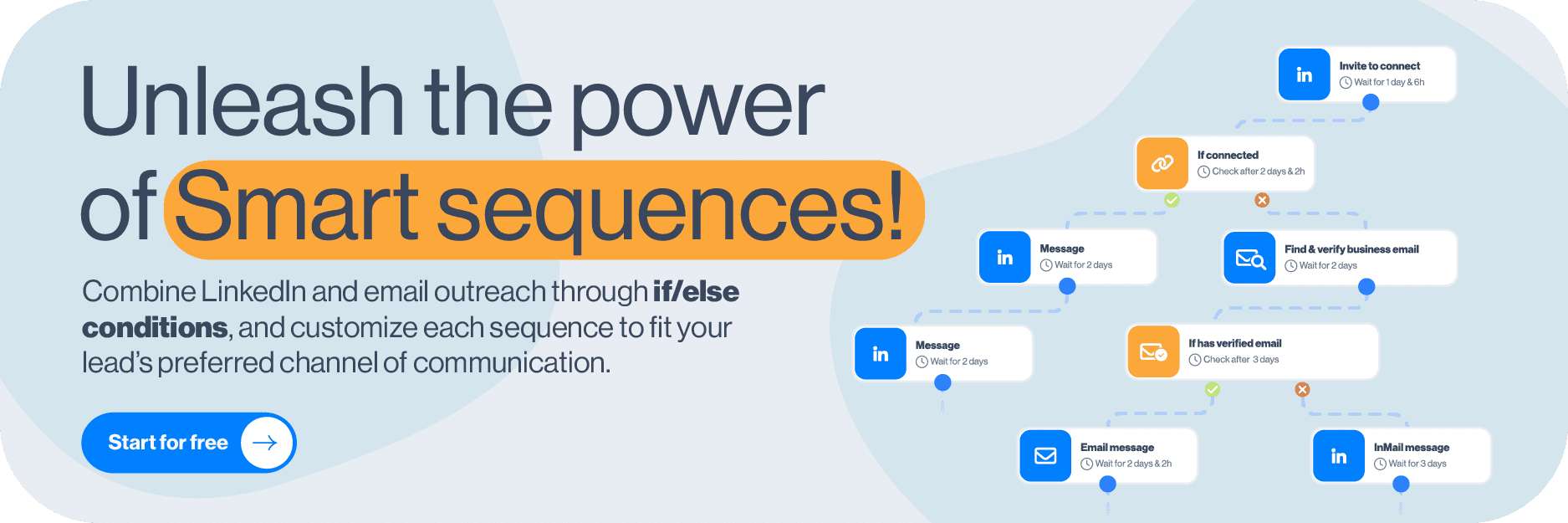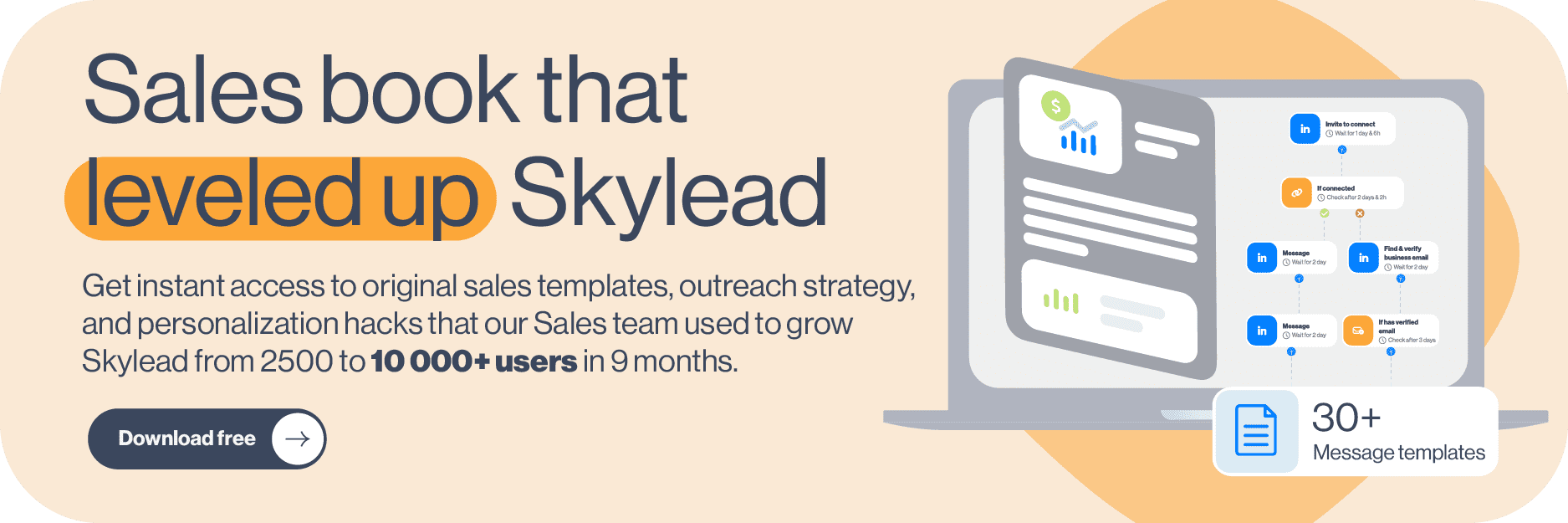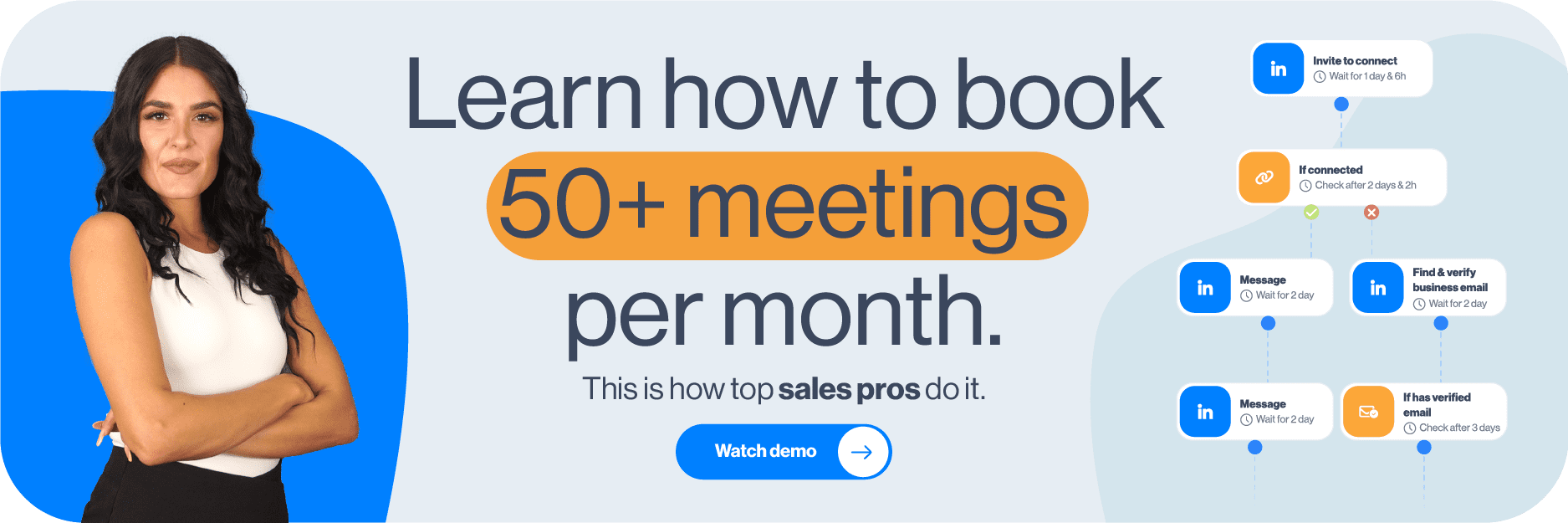In business, no deal is made without one person: a decision maker. Business decision makers are the ones who have the power to turn your pitch into a yes—or shut it down completely.
But the thing is, they aren't always so easy to find and reach out to. Not to mention, even when you think you're talking to one, there’s a chance you’re not.
So, how do you actually get your product/service in front of those who call the shots?
Since our Head of Sales, Andrea, has plenty of experience talking to business decision makers, we consulted her on the matter. And now, we are bringing her findings to help you:
- Identify B2B decision makers based on role, hierarchy, and behavior,
- Find them in real-life situations,
- And reach out to them effectively.
We’ll also teach you the right way to pitch to these individuals to close 3 times the deals!
Shall we?
What are business decision makers?
Business decision makers are the people in a company who have the authority to make important calls. For example, they approve budgets, sign off on partnerships, and decide which products or services to buy. Without them, no major decision moves forward.
Why are decision makers important in business?
Decision makers are responsible for shaping the direction of a business. In other words, their choices directly impact a company’s success—or failure.
They are especially invaluable in B2B environments because they:
- Drive progress - By deciding where resources go, which strategies to pursue, which partnerships to form, and more.
- Maximize efficiency - They prioritize initiatives and allocate resources in ways that ensure teams focus on what truly matters without getting distracted.
- Shape the future - They identify trends and adapt strategies to keep the company ahead of the competition, thereby setting the foundation for long-term success.
- Create opportunities - They explore new possibilities through strategic decision-making. This can include entering untapped markets, facilitating collaboration with key industry players, or supporting initiatives that lead to fresh revenue streams.
- Unlock potential - Their approval enables teams and companies to act on ideas, scale operations, and achieve goals faster.
Who are business decision makers by role and hierarchy?
Some titles have become synonymous with decision-making.
But the truth is, whether or not someone is considered a decision-maker depends not so much on their title but more on the company’s size, structure, and the type of decisions being made.
Regardless, there are certain roles and hierarchical levels where they’re commonly found.
C-Level executives
These are the ultimate decision makers in most organizations and are defined by titles such as:
- CEO - Chief executive officer
- CFO - Chief financial officer
- CTO - Chief technical officer
- CMO - Chief marketing officer
C-level executives are responsible for the big-picture strategy, resource allocation, and final approvals on major decisions (e.g., high-stakes partnerships, significant investments, organizational changes).
Department heads and directors
Another type of decision makers are department heads (e.g., Head of Sales, Head of Marketing, IT Director, etc.).
These individuals don’t have the final say in multi-million-dollar deals. Nonetheless, since they know their departments best, they often make decisions on a department level. This is especially true in larger organizations.
Managers and team leads
At a more granular level, managers and team leads can make decisions about operational matters. They don’t control the company’s overall direction, but they often influence decisions by identifying needs, shortlisting options, and providing feedback to higher-ups. If you’re pitching a service or product that solves everyday challenges, these individuals can be your entry point.
Hierarchy matters—but so does context
No company has the same structure, and who’s in charge will often depend on the size of the organization.
For example, in small business environments, decision-making may rest solely on the owner or founder.
Meanwhile, in mid-sized companies, decisions typically involve multiple layers of authority, starting from managers to directors.
As for enterprise-level organizations, these often require consultation between cross-departmental teams and C-level executives.
Thus, you need to understand where decision makers sit within the specific company’s hierarchy. Only then can you be sure you’re targeting the right individuals.
5 Types of business decision makers based on behavior
Job titles and hierarchy can clue you in on who decision makers might be. But it’s their behavior that tells the full story.
That said, here are 5 types of business decision makers according to the way they make decisions. You’ll also find questions they may ask to help you recognize them, actionable tips on how to approach them, along with message templates.
1. Brand centric
These decision makers are heavily influenced by a brand’s reputation and image. For them, trust in your company is just as important as the quality of your product or service.
They’ll ask questions like:
- What’s your track record in the industry?
- Who else have you worked with?
- Is your company seen as an industry leader?
How to approach them:
Highlight your brand’s credibility because that’s what they are drawn to. To do so, use case studies, testimonials, or showcase awards your company has received.
Template:
Hi {{FirstName}},
I’ve noticed how {{CompanyName}} consistently stands out in the {{Industry}} space.
Companies like yours have, with our help, won industry awards, built credibility, and boosted customer trust by {{X%}} in under {{Timeframe}}.
I’d love to explore how we can enhance your brand’s reputation and set you apart from the competition. Would you be open to a quick call this week?
Best,
Real-life example:
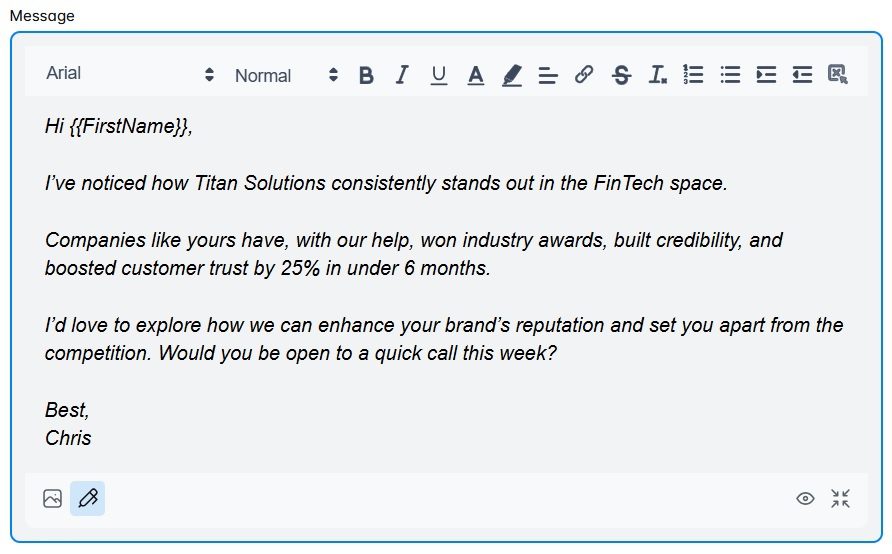
2. Multifocal
Multifocal decision makers consider multiple angles when making a choice. They look at how a decision impacts various aspects of the business, including budget, operations, scalability, and team morale.
They’re the ones saying:
- How does this fit with our long-term strategy?
- Will this disrupt existing workflows?
- What are the potential trade-offs?
How to approach them:
Show how your product or service benefits their organization across the board.
Template:
Hey {{FirstName}},
It must be hard juggling costs, operations, and long-term growth at {{CompanyName}}.
At {{YourCompany}}, we specialize in {{YourSpecialty}} that {{SpecificBenefit}}.
I’d love to share a quick overview of how our platform adapts seamlessly across various departments, ensuring every angle of your operation is covered. Care for a quick demo or call?
Best,
Real-life example:
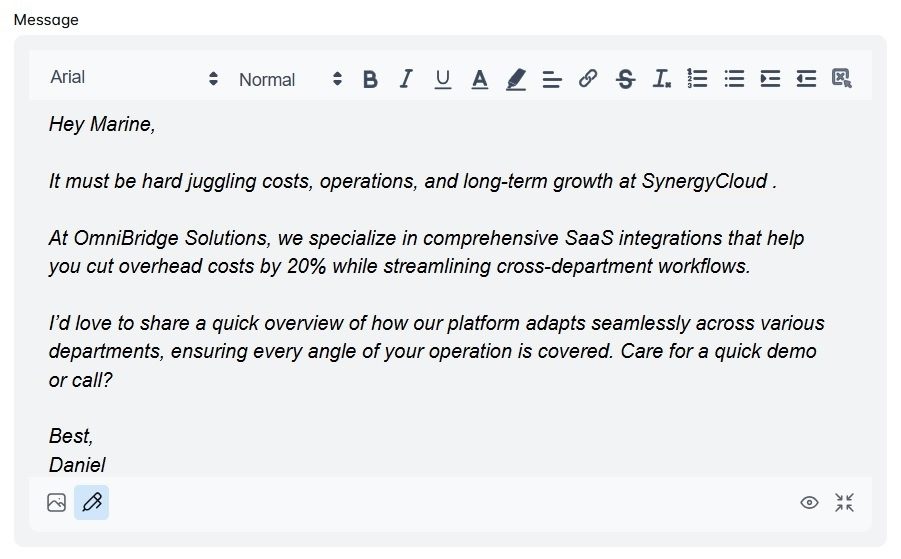
3. Aggregators
Aggregators are all about gathering data, input, and opinions before making a decision. In other words, they seek consensus and rely on feedback from their teams or peers.
You’ll commonly find them saying:
- I’ll need to discuss this with my team.
- Can you provide more information for us to review?
How to approach them:
Equip them with detailed resources and supporting materials such as product demos, white papers, or detailed proposals they can share with their team. Be patient, though, as these process-oriented individuals value thoroughness over speed.
Template:
Hi {{FirstName}},
I understand you often gather input from various stakeholders before making big decisions at {{CompanyName}}.
To help streamline that process, I have a comprehensive set of resources—{{SpecificResources}}—that you can share with your team.
Once everyone has had a chance to review, I’d be happy to discuss specific needs and concerns to ensure a perfect fit.
Interested in getting these materials?
Best,
Real-life example:
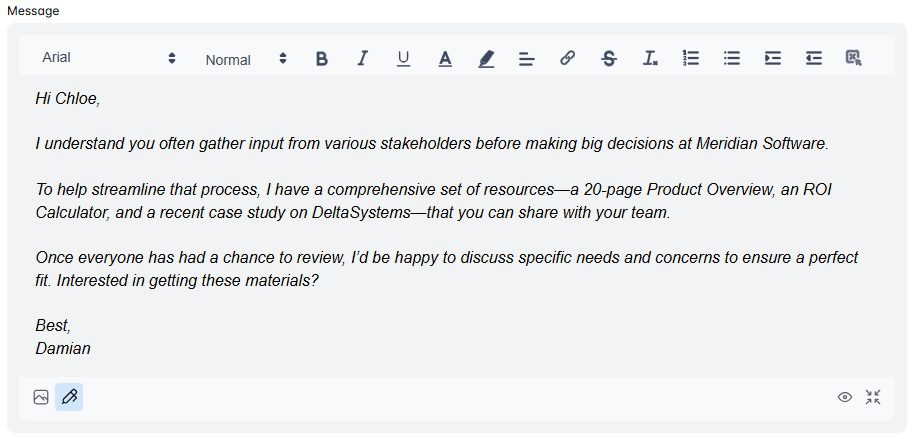
4. Risk-takers
Risk-takers are bold business decision makers who prioritize innovation and speed. As such, they’re willing to embrace uncertainty for the potential of big rewards.
You’ll hear them say things like:
- Let’s be the first to try this out.
- We’re looking for a game-changer.
How to approach them:
Focus on innovation and differentiation, all while emphasizing what makes your solution unique and how it can give them a competitive edge. Nonetheless, be ready to discuss contingency plans, to let them know you’ve considered potential risks.
Template:
Hi {{FirstName}},
I noticed your track record at {{CompanyName}}, and it shows me you’re open to bold moves that can give you a competitive edge.
Our latest solution, {{YourProduct}}, is still in development but has already shown a {{X%}} increase in efficiency among early adopters.
If you’re interested in pioneering something fresh and innovative, let’s chat. I’d be happy to share how we handle any potential bumps in the road.
Best,
Real-life example:
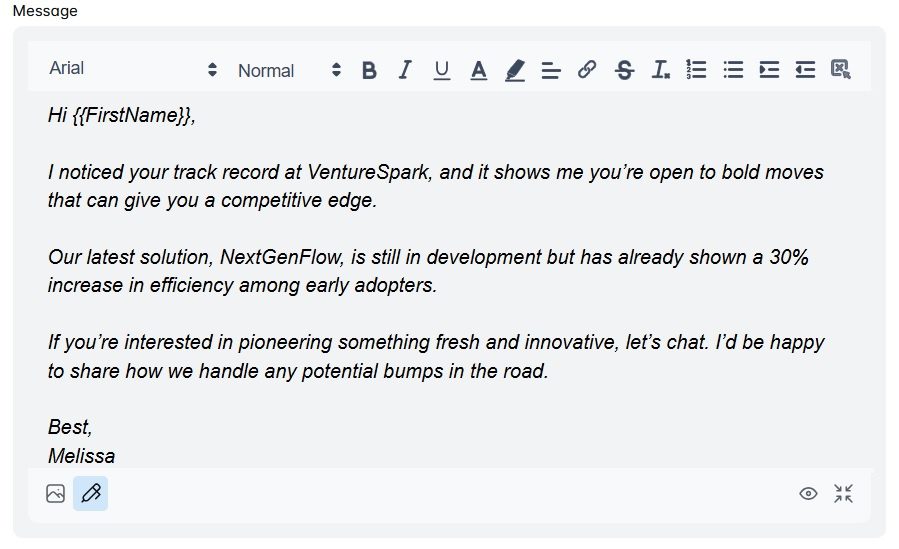
5. Cautious
The opposite of risk-takers, cautious decision makers prioritize safety and predictability. Thus, they’re methodical and prefer to stick with tried-and-true solutions.
Common phrases include:
- Has this been proven in similar industries?
- What’s the guarantee this will work?
- What’s the ROI, and how soon can we expect it?
How to approach them:
Provide reassurance. In other words, use proven results, ROI data, and clear timelines to put their minds at ease.
Template:
Hi {{FirstName}},
I noticed you value tried-and-true solutions with clear payback.
{{YourCompanyName}}’s approach has helped clients across {{Industry}} achieve up to {{X%}} ROI within {{Timeframe}}—and we document every stage to keep you informed and reduce uncertainty.
I’d be happy to walk you through these results and answer any questions about the timeline or implementation. Interested in a brief call?
Best,
Real-life example:
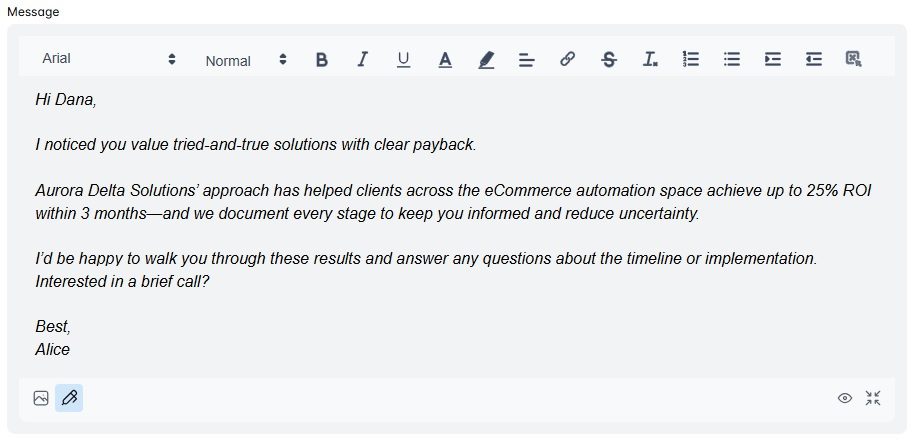
How to find the right business decision makers for your business
Now that you know who business decision makers are and how they think, it’s time to find them.
Decision makers may not always be visible, but they’re not hiding either.
That said, here are 3 steps to take to make sure you catch them where they are.
Step 1: Develop your ICP and Buyer Persona
Before you start searching for business decision makers, you need to know exactly who you’re looking for. And that starts with creating your Ideal Customer Profile (ICP) and Buyer Persona.
Although these 2 terms are interchangeable, they differ in that:
- ICP defines the perfect company for your product or service based on factors like industry, company size, revenue, and pain points.
- Buyer Persona focuses on the individual within that company, covering their role, goals, challenges, and decision-making behavior.
Why is it important to define both, though?
Because, by doing so, you’ll know:
- Which companies to target (e.g., mid-sized tech firms with 200-500 employees facing scaling challenges).
- Who the decision makers are (e.g., CTOs struggling with operational efficiency).
- What messaging resonates with them (e.g., cost-saving benefits, operational improvements, or competitive advantages).
That said, to actually define both your ICP and Buyer Persona, start by:
- Analyzing your existing customers and identifying patterns in their industry, company size, and pain points.
- Talking to your sales and support team, seeing as they interact with potential and existing customers daily. Thereby, they can provide valuable insight into their requirements and common objections.
- Defining key attributes. For ICP, these can be location, industry, revenue, and the growth stage. Meanwhile, when it comes to your Buyer Persona, you can concentrate on the job title, responsibilities, challenges, and goals.
We wrote 2 detailed blogs that explain exactly how you can create both your Ideal Customer Profile and Buyer Persona. So, be sure to check those out!
Step 2: Zero in on them using LinkedIn or Sales Navigator
Given that LinkedIn is home to over 65 million business decision makers across the globe, including over 10 million C-level executives, it's clear it's THE place to hunt them.
There are a few ways to go about it, and they involve using:
- LinkedIn search
- Sales Navigator
- LinkedIn Boolean search
That said, let’s show you exactly how you can use all of these for LinkedIn prospecting.
1. Finding business decision makers using LinkedIn search
The simplest way is to type specific job titles into the search bar (e.g., CEO, Head of Sales, Marketing Director, etc).
However, if you want to get more precise results, we recommend you further refine the search using LinkedIn filters.
To activate filters, type anything you want in the search bar, be that a job title, a company name, etc., and hit enter. Alternatively, you can run a blank search.
Then, right under the Navigation bar, you’ll find a couple of highlighted filters, along with the ‘’All filters’’ button.
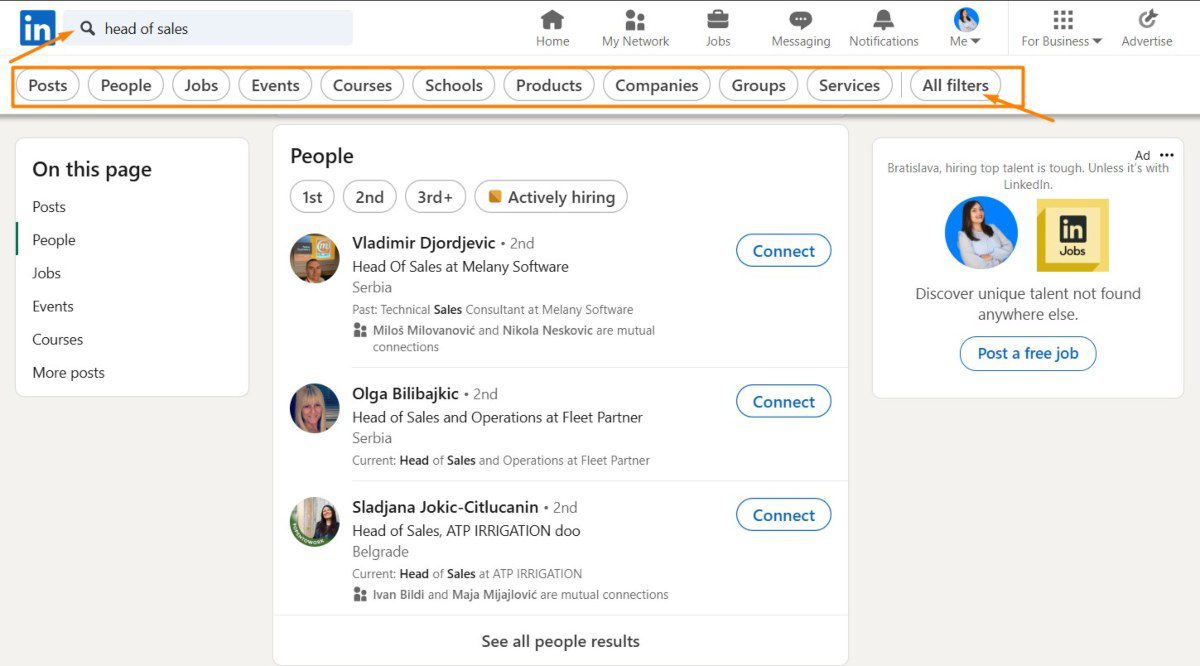
Click it to open a sidebar menu that contains all filters you can apply to your search, such as:
- Current company
- Past company
- School
- Industry
- Location
- etc.
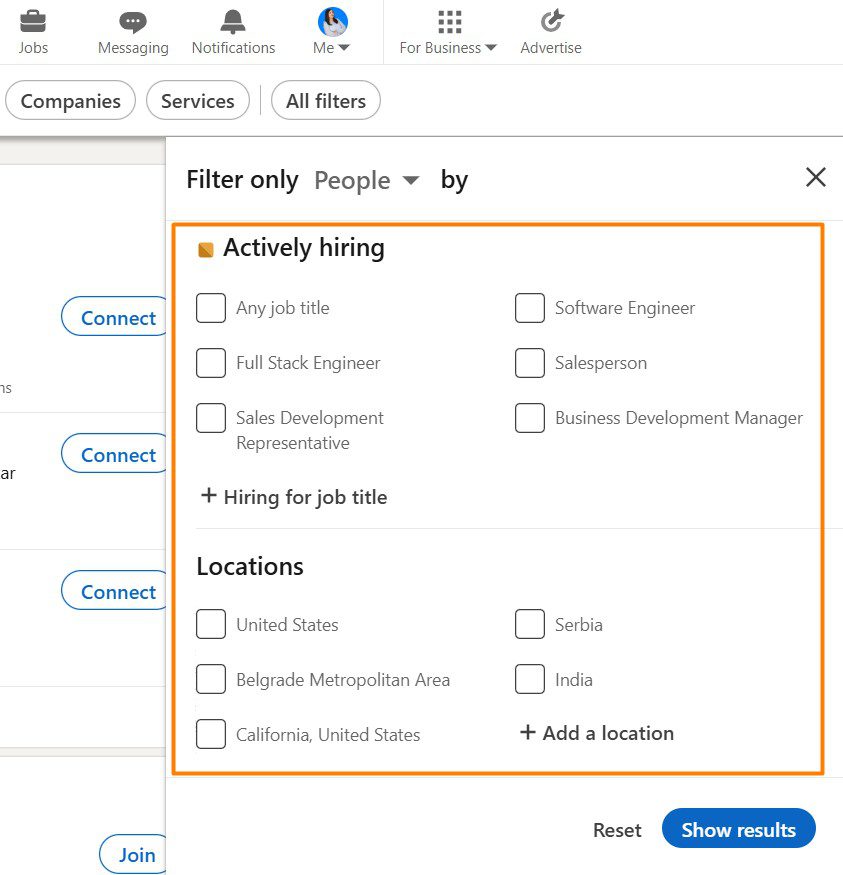
The next step is to select filters relevant to your ICP and Buyer Persona and click ‘’Show results’’.
As a result, you’ll get a list of all LinkedIn profiles that match your requirements.
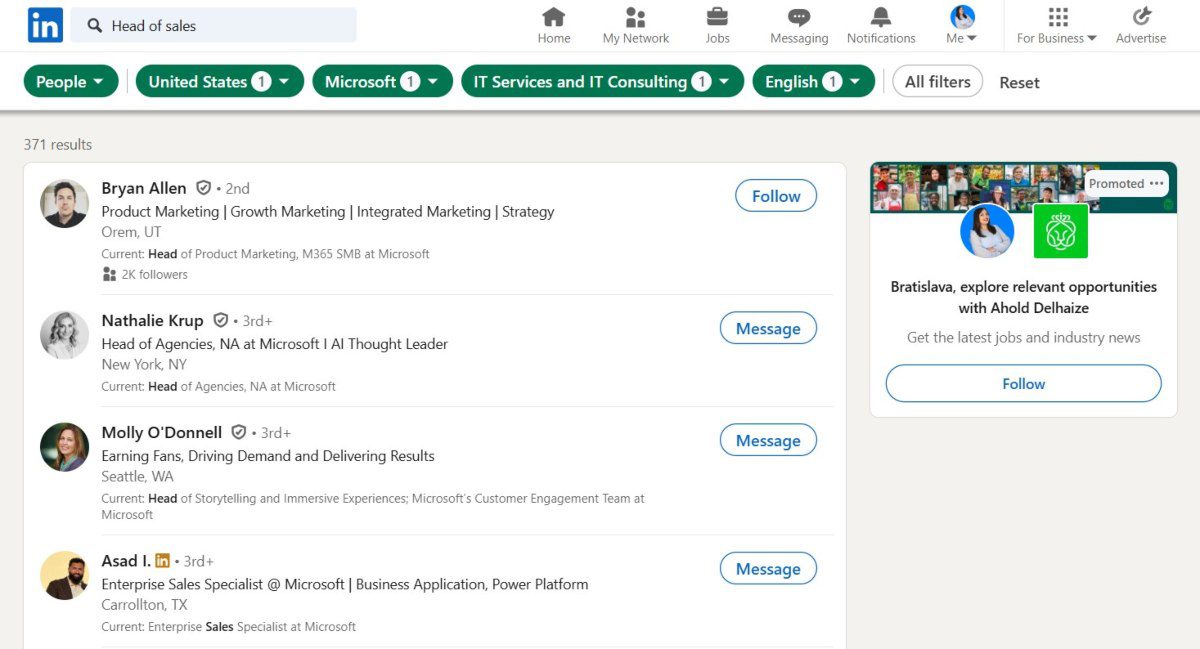
📝 Note: No matter how many profiles show up in your search, LinkedIn only lets you see the first 1,000 results (that’s 100 pages with 10 profiles each). So, it’s best to refine your search as much as possible. Or, better yet—use Skylead to discover leads. But we’ll talk more about that later.
2. Finding business decision makers using Sales Navigator
If you thought LinkedIn search filters were powerful, wait till you see what Sales Navigator has got!
In fact, LinkedIn Sales Navigator Filters include a total of 29 Lead filters and 15 Account filters that allow you to target decision makers with laser precision, 27 of which are exclusive to the platform. In other words, the latter aren’t available to subscribers to LinkedIn Premium, Recruiter, or basic LinkedIn users.
To get to these, go to the search bar and select either “Lead” or “Account” filters, depending on whether you’re looking for business decision makers directly or companies they work for.

Once you do, you’ll be able to apply any filters you wish to refine search results.
Here’s a sneak peek into all the available filters.
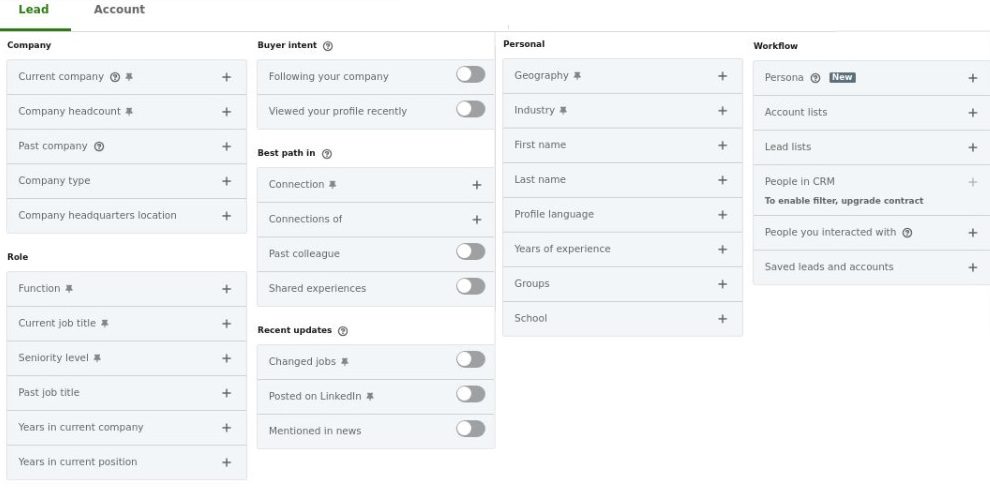
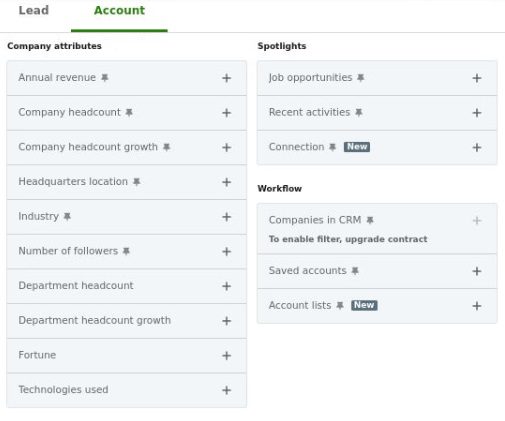
After applying filters, Sales Navigator will list all leads that fit your criteria on the right side of the screen.
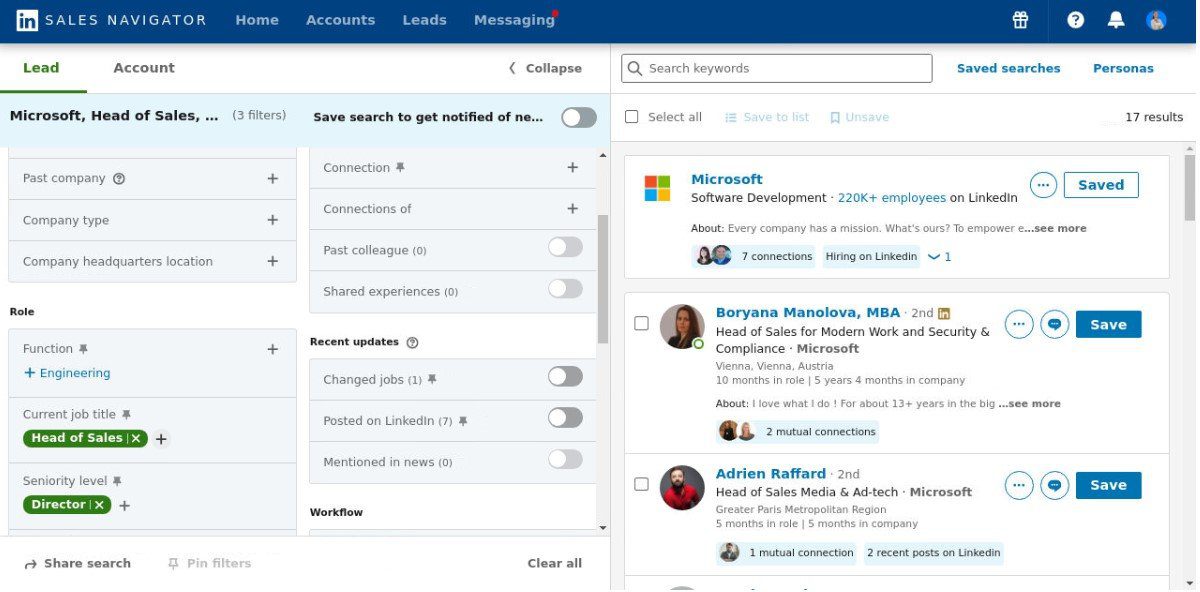
What’s more, the platform even lets you save your search with all applied filters. Thanks to this feature, you can revisit your search anytime instead of setting it up all over again.
To actually save your search, just toggle the corresponding button to the right.
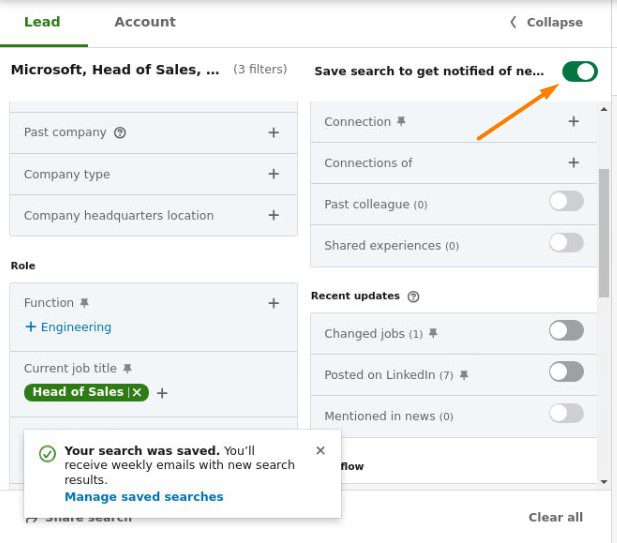
Then, every time you go to the Saved search dashboard, you’ll see:
- The last time you accessed the Saved search.
- The number of new leads added since your last visit.
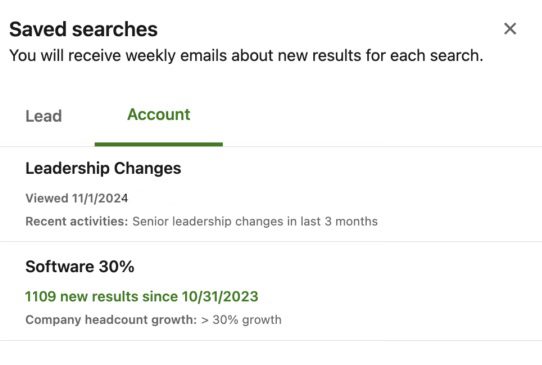
Rather than saving the entire search, you can also organize your leads into Lead lists.
To do so, identify leads you believe are the decision makers you wish to keep tabs on.
Then, click “Save” and either create a new list or add them to an existing one.
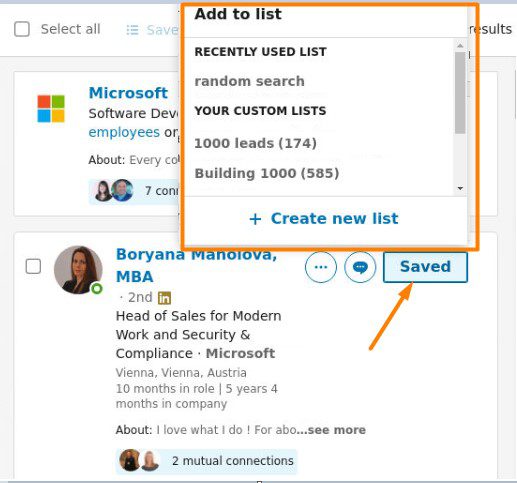
Finally, the last way you can find business decision makers on Sales Navigator involves using its Personas feature.
To use it, go to the “Personas” tab (you can access it via search or the homepage).
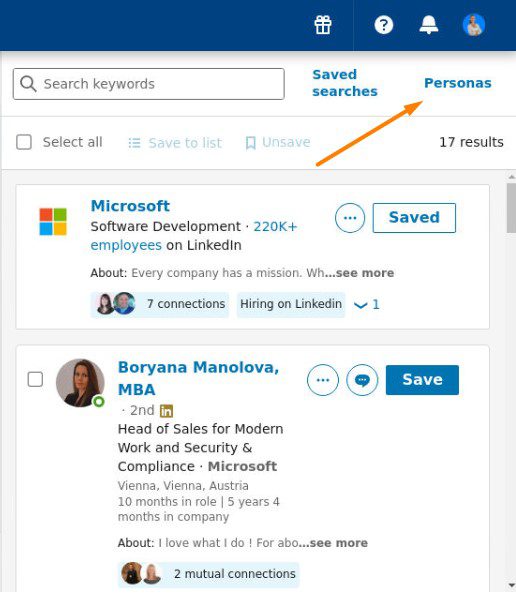
Then, click “Create a new persona”...
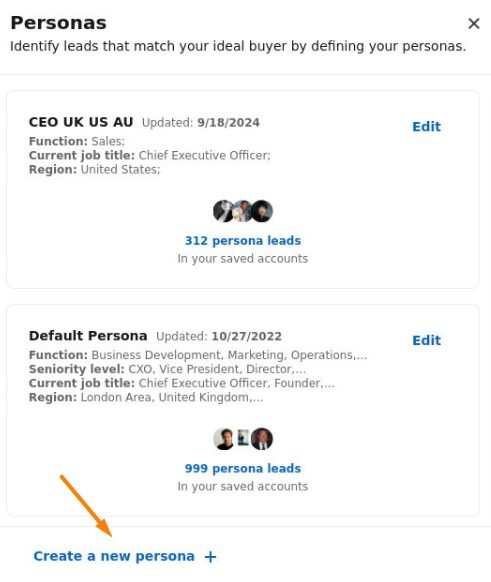
…define the following:
- Job title (e.g., Director of Sales)
- Function (e.g., Marketing, Sales)
- Seniority level (e.g., Director)
- Current job title (e.g., Director of Sales Operations)
- Geography (e.g., North America)
…and save.
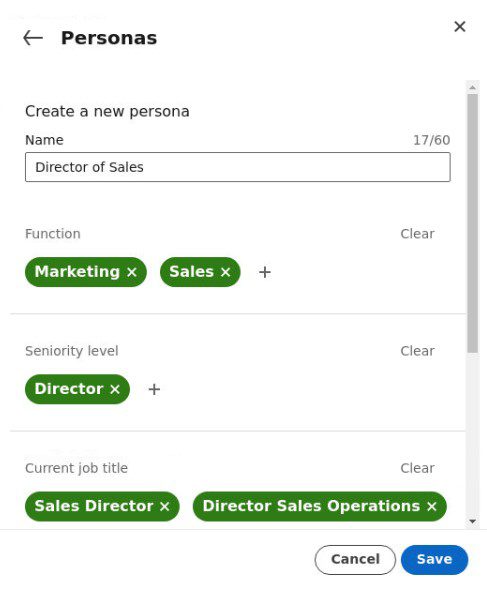
Once your Persona is created, Sales Navigator will automatically add leads that match these criteria.
By default, Sales Navigator provides 2 preset Personas: Director+ and CXO. Nonetheless, you can create up to 3 additional custom ones according to your LinkedIn sales strategy.
📝 Note: Much like LinkedIn, Sales Navigator also has a search limit, meaning you can only view up to 2,500 profiles per search. Thus, we recommend you refine your search as much as possible using the available filters.
Bonus: Monitor job changes to find new decision makers
People change jobs, get promoted, or switch roles, which can impact your targeted outreach strategy.
To make sure this doesn’t happen (and stay ahead of your competition), it’s important to keep track of job changes.
One of the best ways to do so is by using the Sales Navigator Alerts feature, which notifies you of important updates related to your leads and accounts, including when a decision-maker moves to a new role or company (among other things).
All you have to do to receive alerts is save a lead or account. Then, you’ll find all the updates on the Sales Navigator homepage.
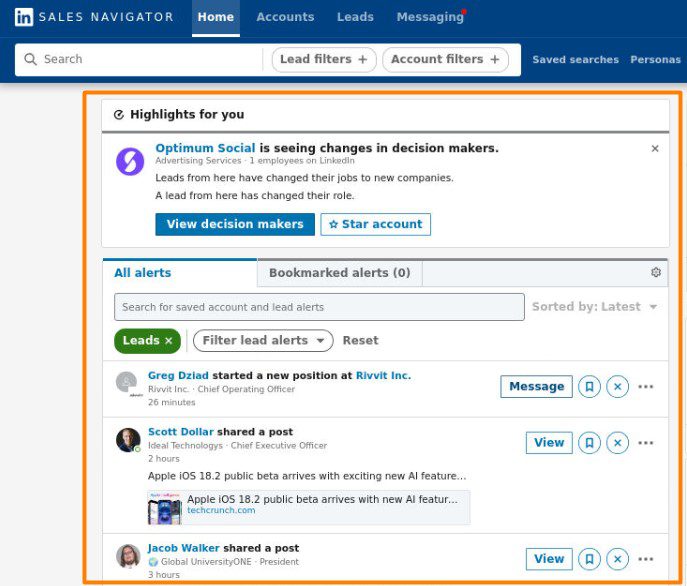
But why track job changes? Because doing so allows you to:
- Reach out to decision makers at the right time since new hires and promotions often come with fresh budgets and opportunities.
- Gain a competitive edge by reaching out to them before your competitors.
- Strengthen relationships. For example, you can congratulate these individuals on their new roles to build rapport naturally.
📝 Pro tip: Set up ‘’New Decision Makers’’ alerts for specific companies (accounts) to get wind of new business decision makers as soon as they enter the picture.
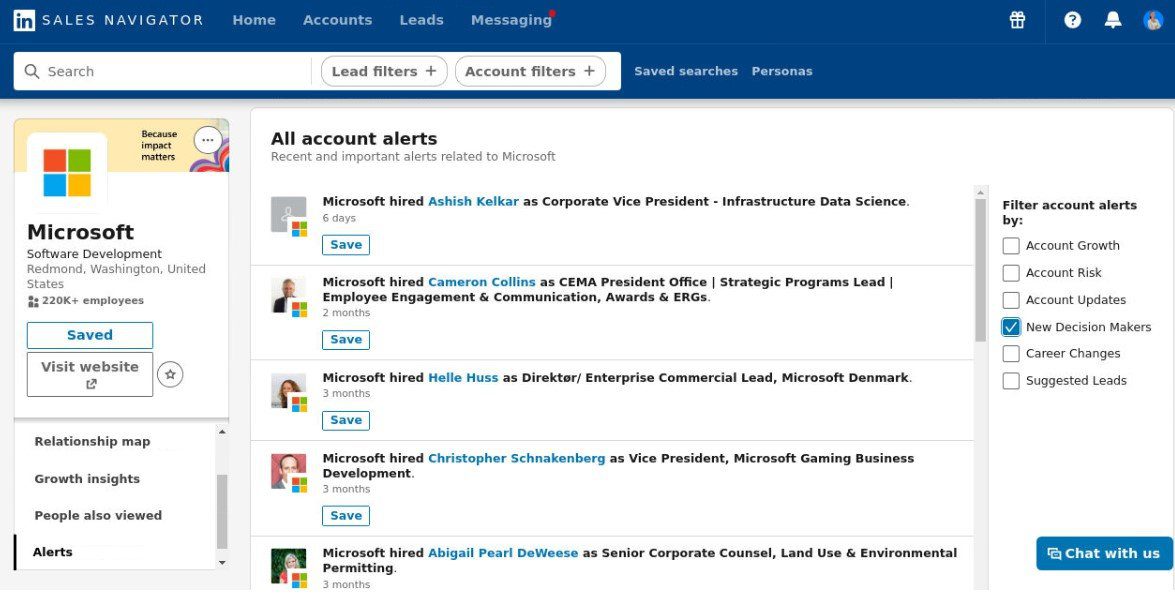
3. Finding business decision makers using Boolean search
Want to take your search up a notch? Boolean search is a powerful way to do just that.
It’s a simple search technique that helps you filter through large amounts of data and zero in on exactly what (or who) you’re looking for. What’s more, it works in any field where you can type keywords.
That said, these are the Boolean operators you can use across LinkedIn and Sales Navigator:
- AND – Shows results that include both terms. (e.g., CMO AND B2B)
- OR – finds profiles containing either term. (e.g., CEO OR Founder)
- NOT – Excludes unwanted terms from your search. (e.g., Manager NOT Assistant)
- Quotation Marks (“ ”) – Searches for exact phrases. (e.g., ‘’Chief Technology Officer’’)
- Parentheses ( ) – Groups search terms for more complex queries. ( e.g., (“Marketing Director” OR “CMO”) AND “SaaS”)
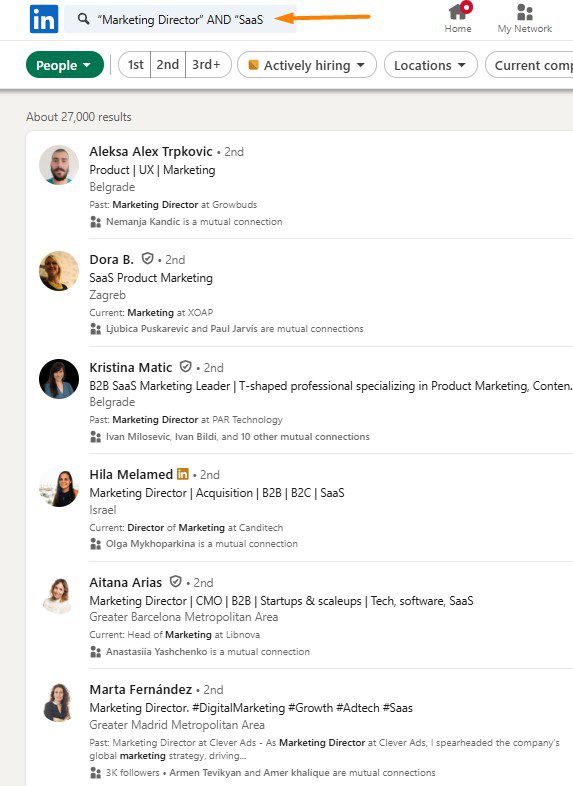
💡 Pro tip: To make the most of Boolean search, mix and match these operators.
Step 3: Research and compile lead data
So, you’ve identified business decision makers through LinkedIn or Sales Navigator?
Then it’s time to research deep into them and compile data that you’ll later use for outreach.
You can do this manually by reviewing your leads’ LinkedIn profiles, focusing on their LinkedIn headline, LinkedIn summary, work experience, posts, and activity.
While this manual approach can provide you with valuable information, it can be time-consuming. Thus, to speed things up, you are better off using LinkedIn automation tools. And our very own Skylead is one of the best such tools for the job!
Namely, Skylead has a handy Discover leads feature that automates the process of gathering valuable data about prospects. This feature collects all publicly available information from a LinkedIn profile, thereby helping you save 11+ hours a week on research alone.
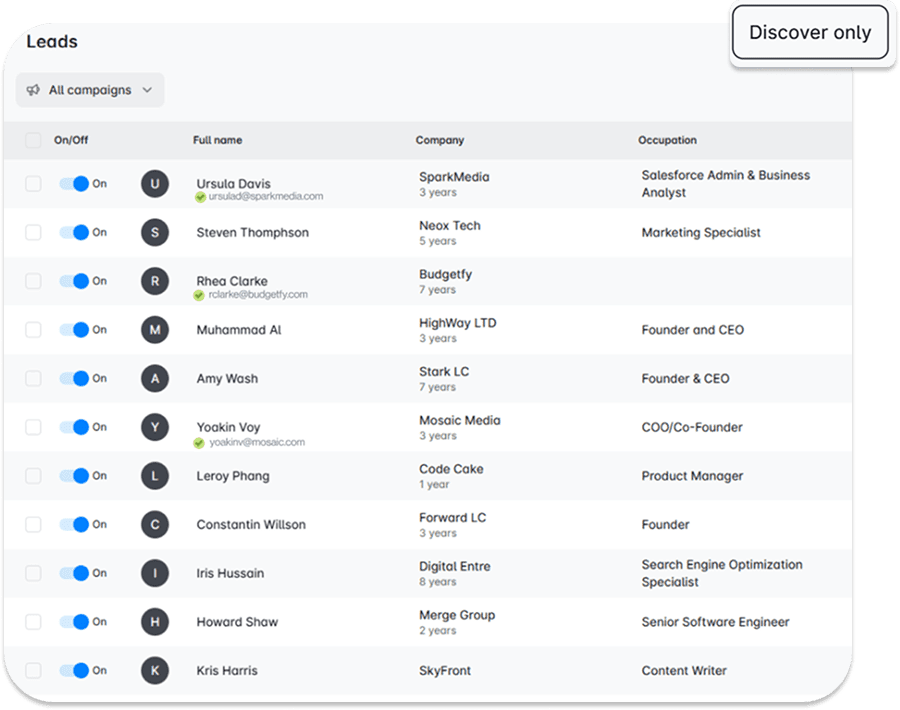
What’s more, if you're using a LinkedIn or Sales Navigator search URL as your lead source, Skylead can refresh the search periodically to capture new leads that fit your criteria and, thus, help you bypass the search limits. Provided you turn the option on, that is.
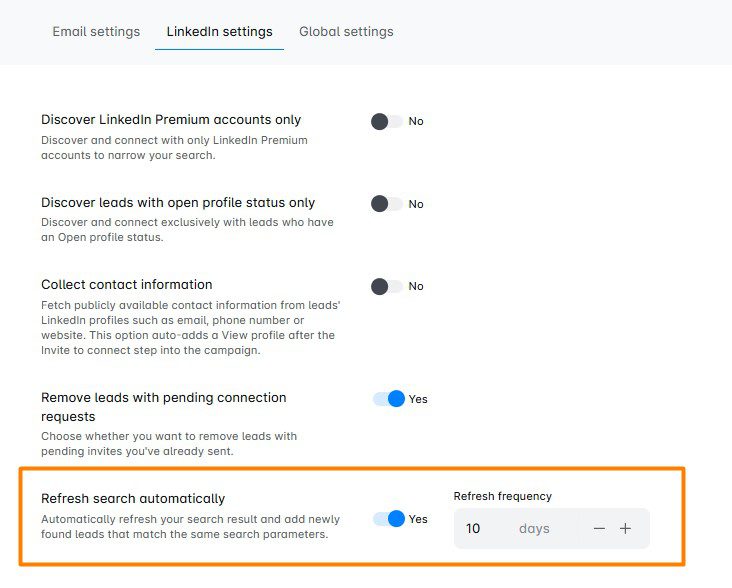
After gathering all the necessary details—whether manually or through Skylead—compile everything into a CSV file. Then, you can upload that same CSV file into Skylead to reach out to business decision makers at scale.
But more on that in a bit. 🙂
How to reach business decision makers
You know who you should be contacting. Now, it’s the time to actually do so.
You could go about cold outreach manually, but why not put it all on autopilot with Skylead?
Skylead is a one-stop-shop LinkedIn automation and cold email software that works with all LinkedIn Premium, Sales Navigator, and Recruiter accounts
That said, it lets you create outreach campaigns that incorporate automated LinkedIn and email actions using:
- LinkedIn, Sales Navigator, or Recruiter Search URLs
- Sales Navigator Lead lists
- LinkedIn Post
- Recruiter Pipeline URLs
- Recruiter Talent Pool
- CSV files
Today, we’ll show you how to launch a CSV-based campaign.
Start by manually reviewing your leads’ LinkedIn profiles, paying special attention to:
- Job title and responsibilities – To verify they truly hold the decision-making position.
- Company size, industry, and locale – To make sure they match your target market.
- Recent activity – Posts, shares, and engagement can give you insights into their interests and pain points.
- Connections – To see if you have any mutual connections who can introduce you.
Once you’ve got the details, it’s time to create a Skylead-friendly CSV file.
Here, you can find detailed instructions on how to format it and what columns to include to ensure Skylead picks up proper information. This is especially true if you’d like to use our native message variables for personalized outreach, a.k.a. placeholders that automatically get populated with your leads’ information.
Skylead has these predefined…

…which you add to the file by including columns with names formatted like this:

Nonetheless, you can add as many columns as you want to to create your own custom variables that our tool will pick up.
These can be custom icebreakers based on the information you compiled through their LinkedIn profiles, intros…or anything else you believe will catch the attention of business decision makers.

If you’re not quite sure what that something is, you can add multiple custom variables, and later A/B test them in up to 5 different versions of your copy.
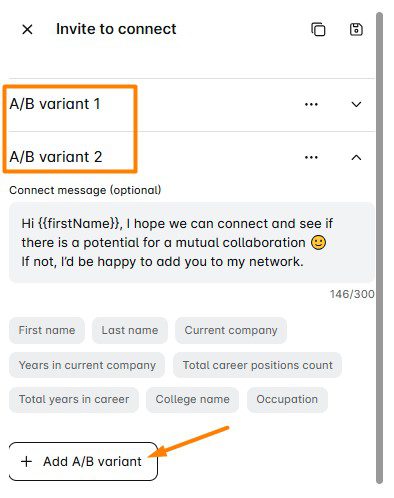
On the other hand, if you used Skylead to discover leads, you can also download the CSV from the Leads page directly. It is preformatted to fit our tool, so you can immediately use it in your outreach campaign. Additionally, you can add more columns to it to serve as custom variables.
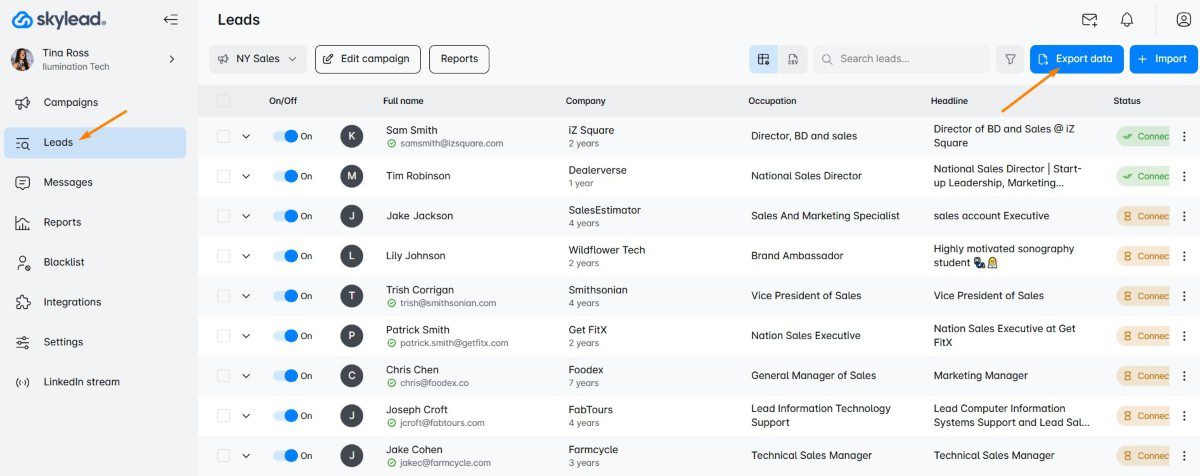
Now, to create a campaign, navigate to the Campaigns page and click ‘’Create’’ to start the process.
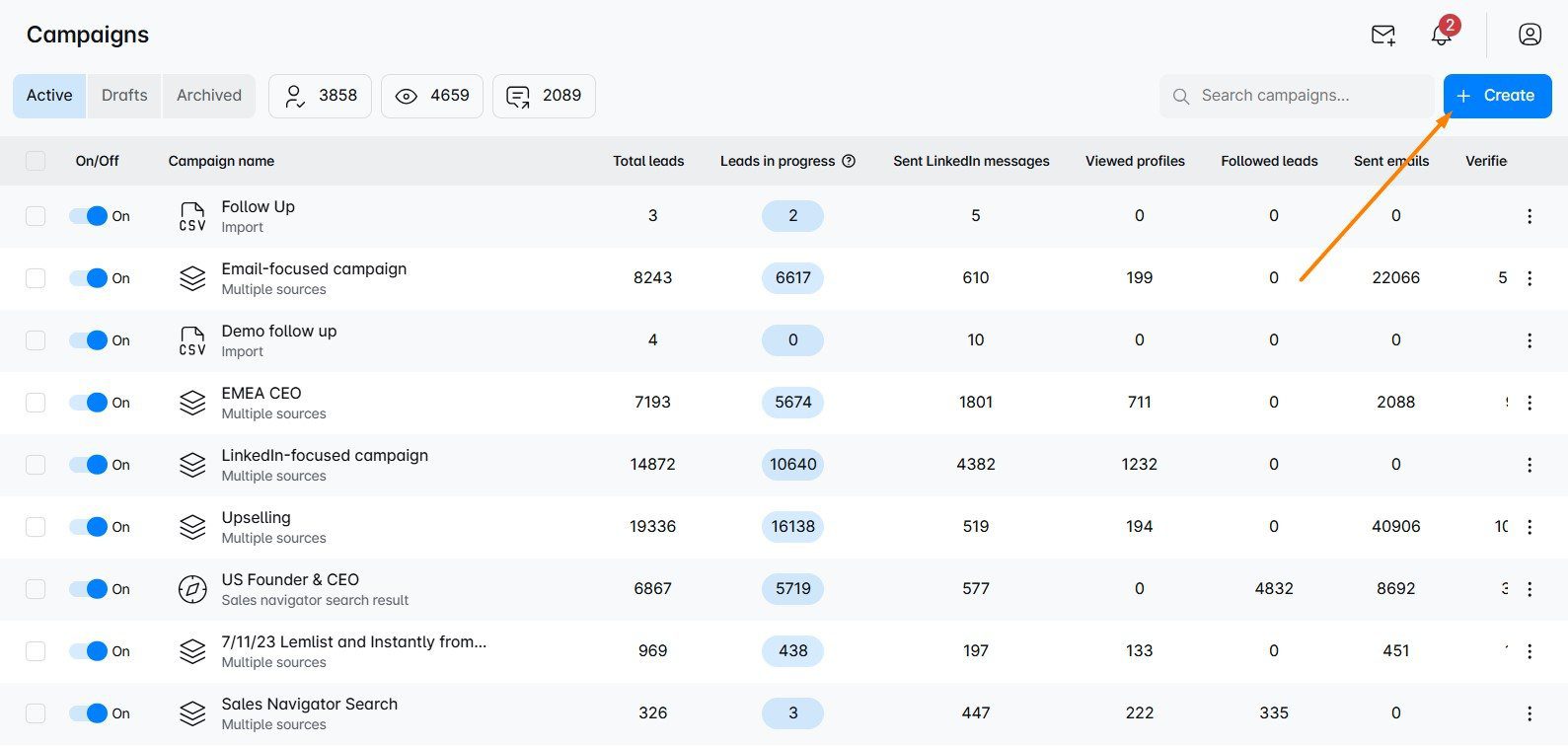
Give your campaign a name and import your CSV file. Then, click Next.
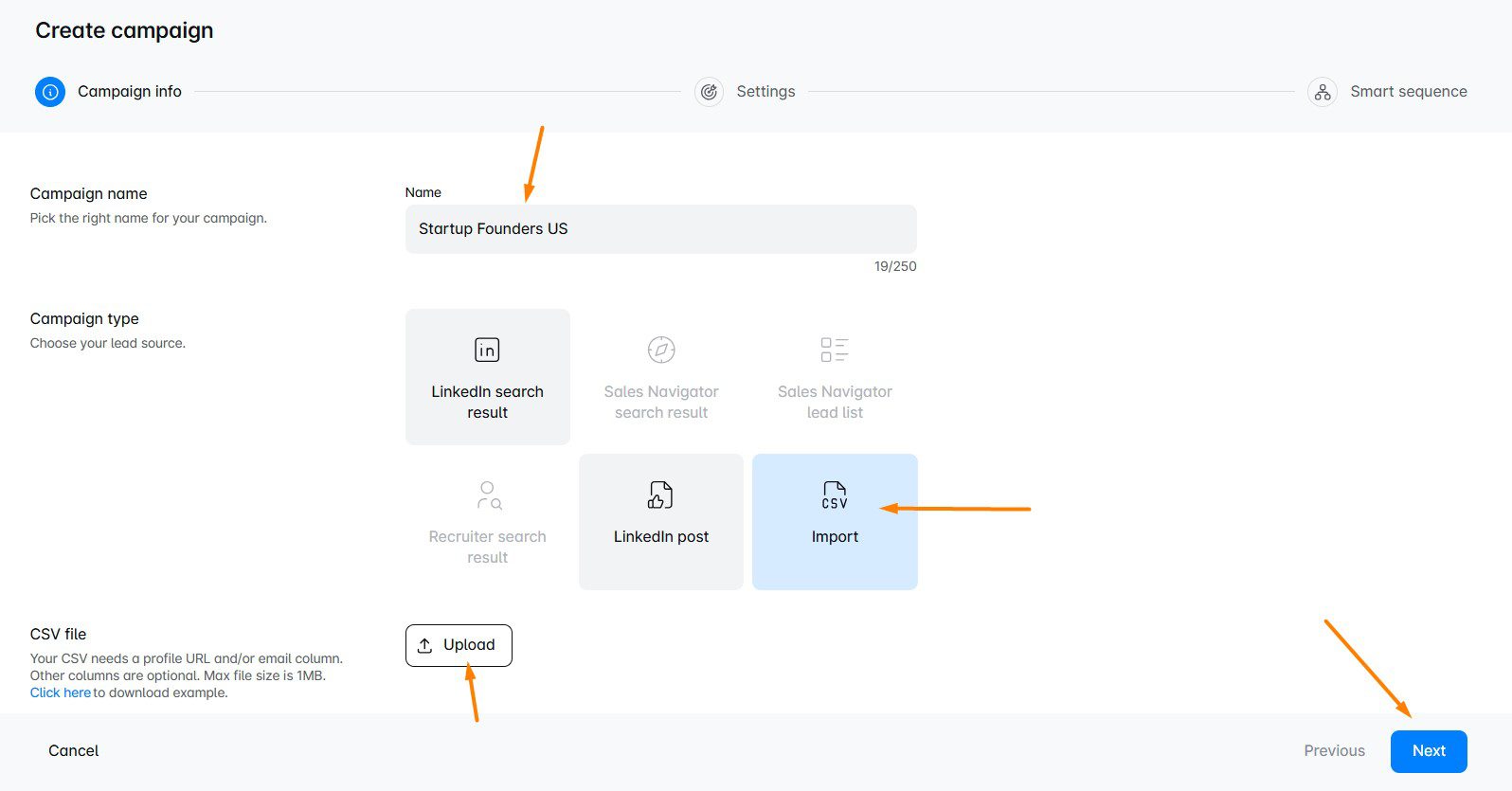
The next step is to define email, LinkedIn, and global settings.
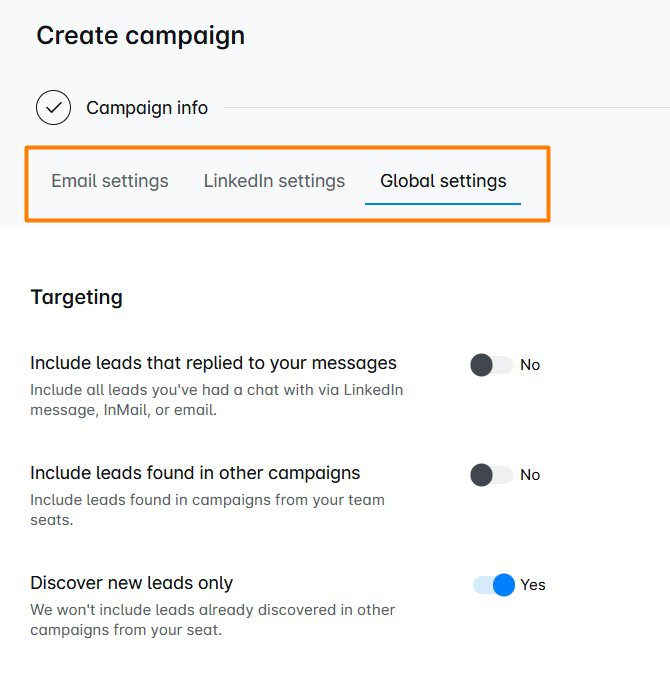
Feel free to explore the options you have.
Nonetheless, we’d like to emphasize that under email settings, you can find the option to select unlimited mailboxes to send tens of thousands of emails a month at no extra cost.
What’s more, each Skylead user gets to prepare these same mailboxes for outreach free of charge. How? By using an infinite email warm-up feature provided by our partner—an email warm-up tool, InboxFlare.
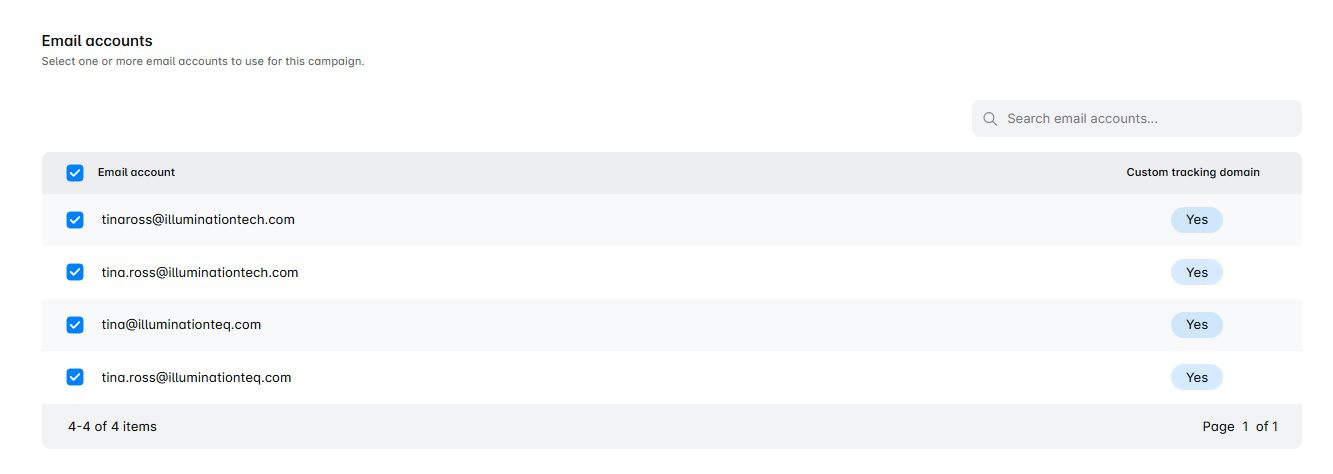
Once you’re happy with your settings, proceed to the Smart sequence builder page, where, on the right side, you’ll see different LinkedIn and email actions & conditions.
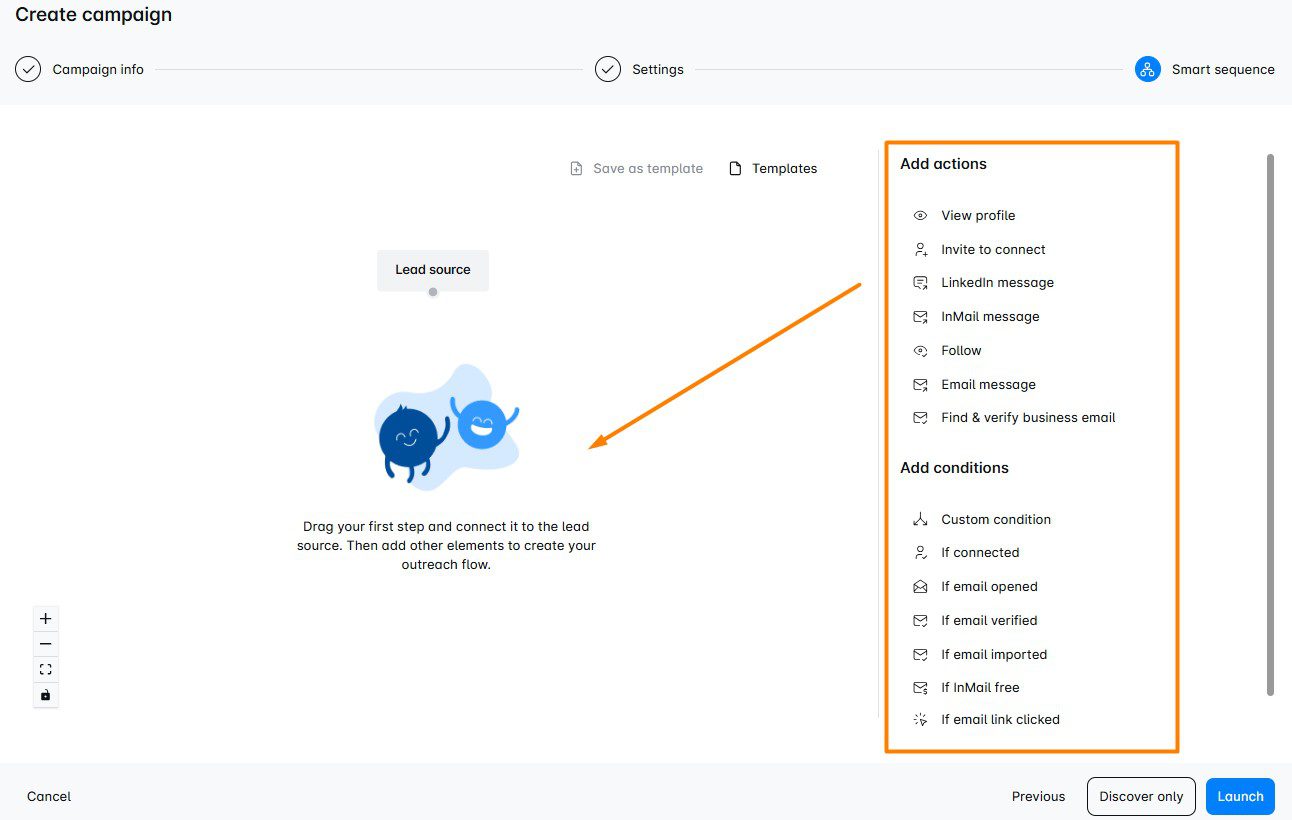
Drag and drop them into the white space and connect them to each other to create your Smart sequence. In other words, a coherent outreach flow that acts according to prospect behavior to reach them in the fastest possible way.
Here is an example of a Smart sequence.
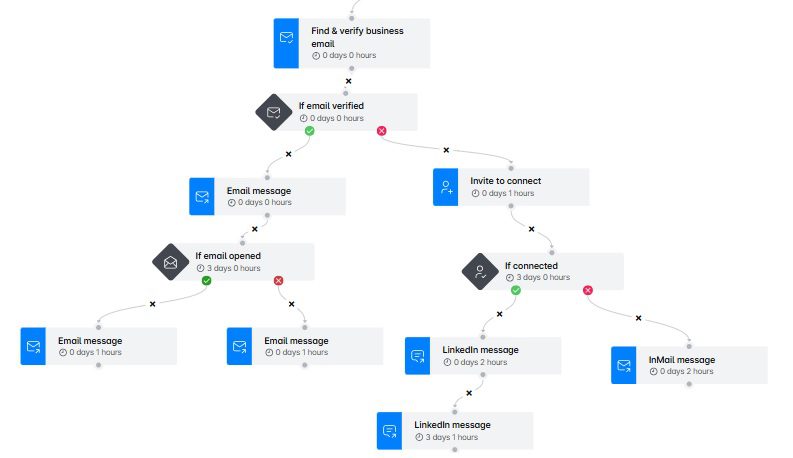
If the goal is to combine both email and LinkedIn outreach, the best course of action is to have Skylead first discover and verify leads’ business emails.
If it does so successfully, it can proceed to send an email, as you can see above.
Now, say a few days have passed, and you haven’t received any word. Has your email been opened? Skylead can check that. If yes, it can send a follow-up email after no response. Whereas, if not, it can also send a follow-up, but with a different copy.
But what if the tool wasn’t able to find your lead’s email to begin with? Then, it can continue down the LinkedIn lead generation road and send an invite to connect instead. If your lead accepts it, it can follow up with a LinkedIn message and another one if there’s no response.
However, if your connection request goes unanswered, the final resort can be a LinkedIn inMail, which you can also use to bypass the LinkedIn connection limit to get to as many business decision makers as possible.
Personalize your outreach for maximum impact
Want to truly stand out in the decision makers' inboxes? Take your outreach up a notch with our Image and GIF personalization feature to increase your response rate to 76% and more!
Using it, you can personalize visuals with:
- Custom text
- LinkedIn profile images
- Company logos
…and insert them into any message-based step.
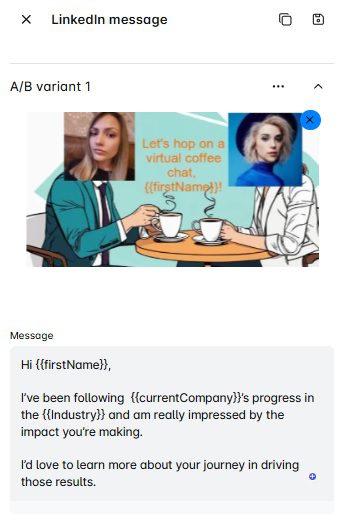
After you’re done tweaking your sequence and personalizing your messaging, set delays between steps.
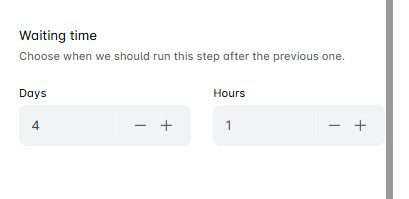
And finally, launch your campaign!

Respond & track replies with ease
Skylead can help you reach out to business decision makers on autopilot.
But it's up to you to nurture relationships after they reply.
Luckily, Smart Inbox makes this rather simple, seeing as it lets you:
- View all LinkedIn messages, inMails, and emails in a single dashboard.
- Respond to them directly without switching between different platforms.
- Label your conversations to keep track of conversions and measure ROI.
- Leave notes about leads so you don't have to memorize important details.
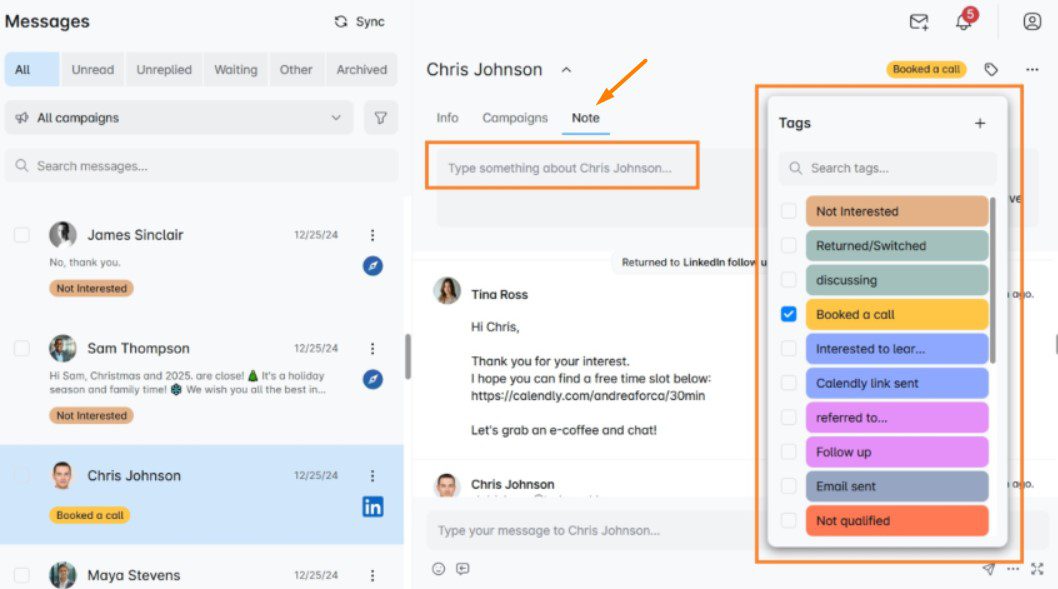
Want to know how many leads have replied without manually counting your chats?
Visit the Reports page, where you can keep track of your response rate, along with other metrics, such as:
- Acceptance rate
- Email open rate
- Email click rate
- Bounce rate
- Emails verified
- etc.
You can do so in 3 different view modes:
- Graph — to get a visual overview of campaign performance and spot oscillations easily.
- Table — to analyze your campaign day-by-date and identify patterns.
- Side-by-side — to track each stage of your outreach sequence to see where prospects are engaging or dropping off.
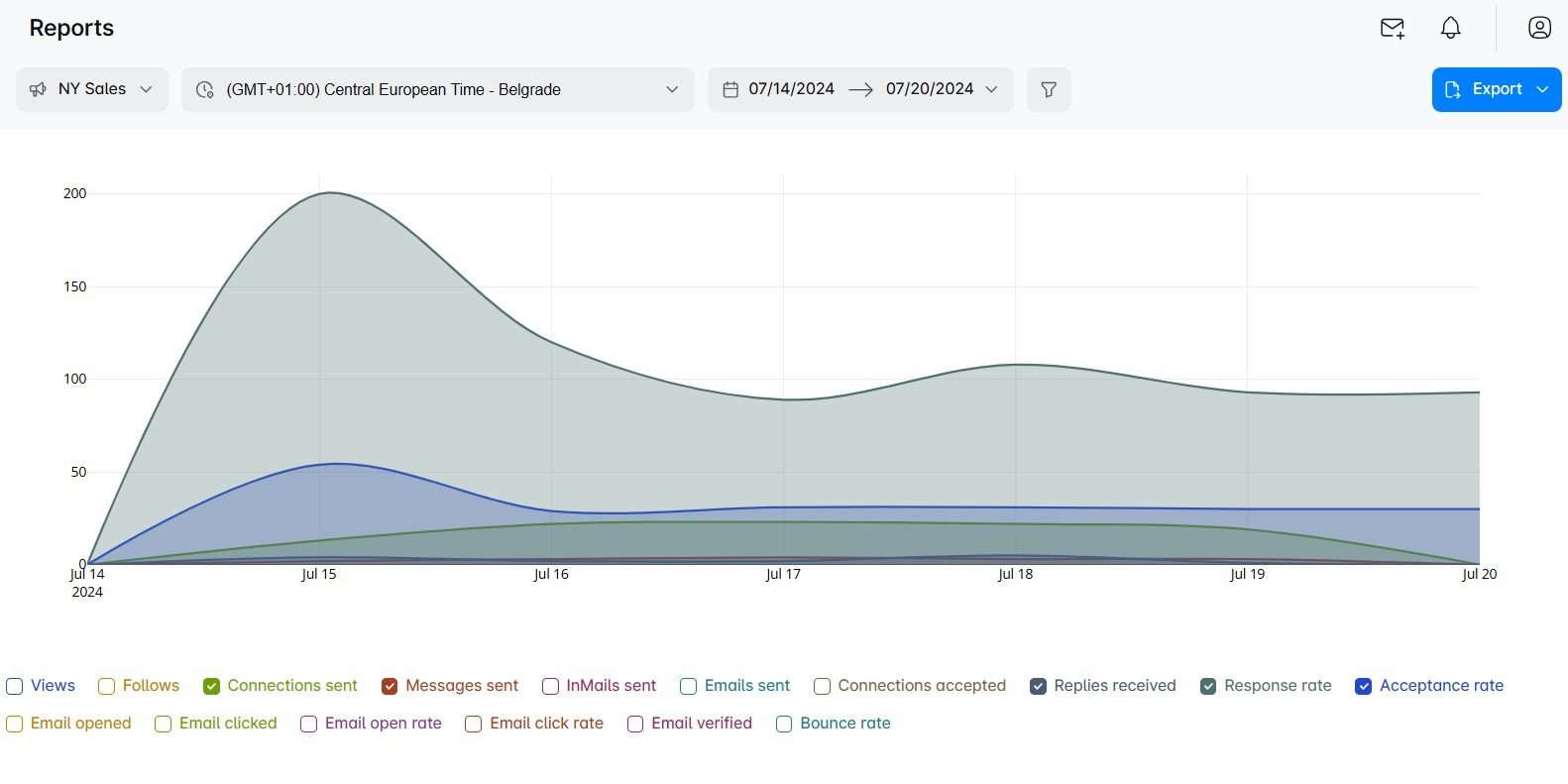
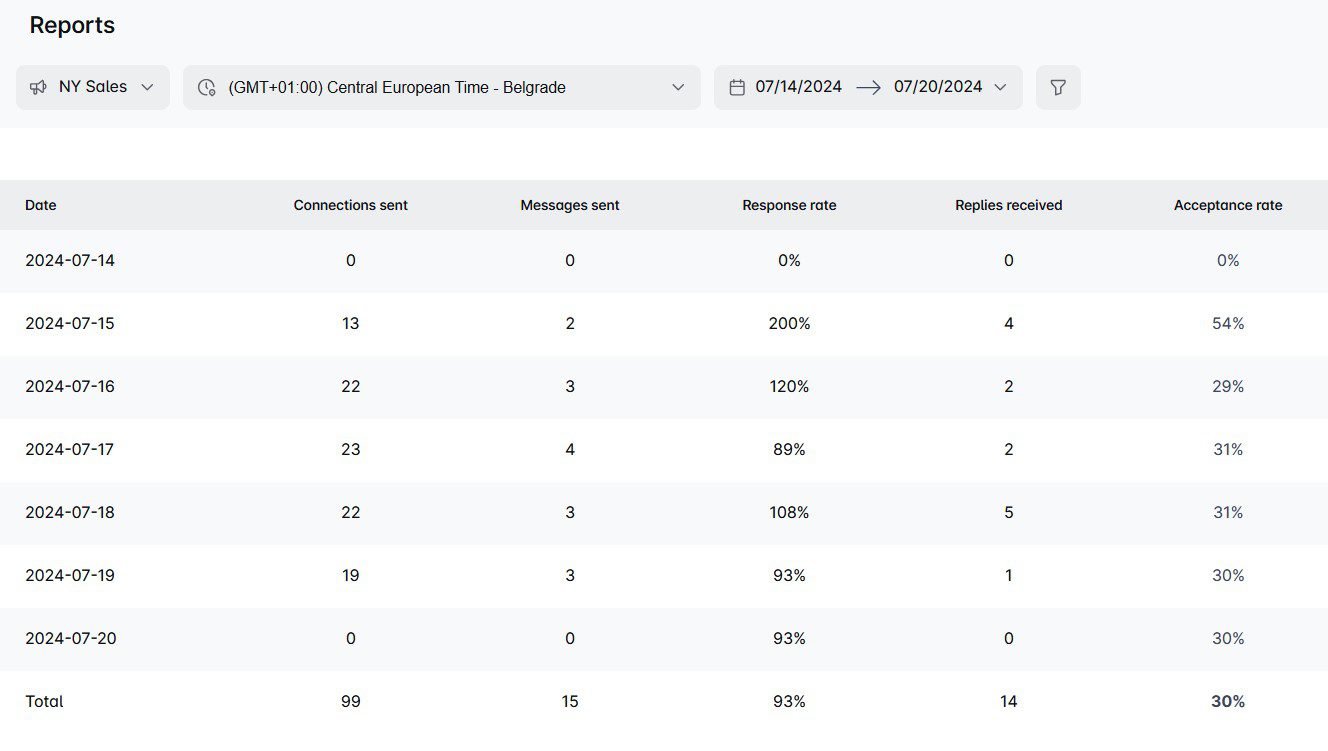
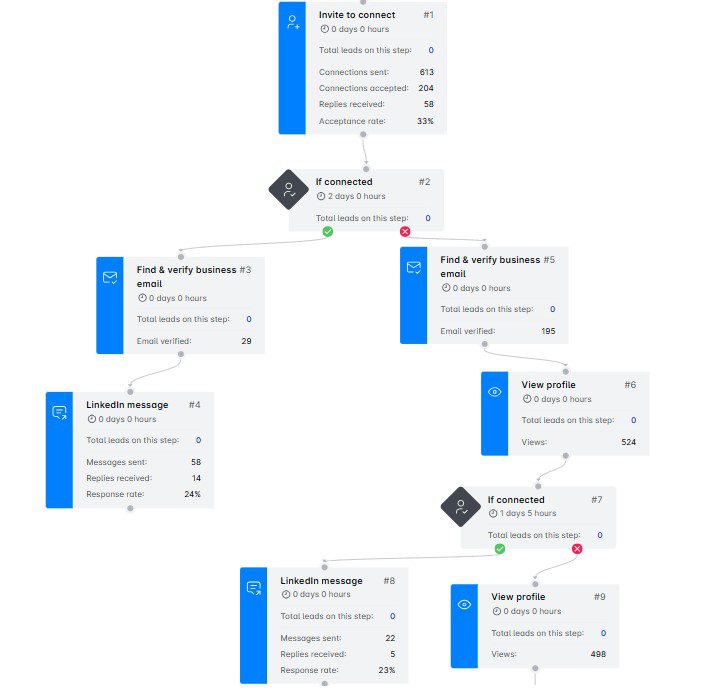
How to pitch to business decision makers
How you approach business decision makers and pitch to them will depend majorly on how they make decisions. In other words, it will depend on their behavior.
Nonetheless, here are some general sales tactics to help you pitch successfully.
1. Befriend the gatekeeper
Decision makers are often shielded by gatekeepers, a.k.a. assistants, coordinators, or even automated systems. Instead of trying to bypass them, work on building a rapport (unless they are a bot). Doing so can help you gain insider info and improve your chances of getting through.
2. Provide value first
Decision makers get bombarded with pitches every day, so standing out is all about showing what’s in it for them. Jumping straight into your product features won’t cut it. Instead, focus on how your solution solves their challenges or helps them reach their goals.
Want to make them even more receptive? Offer something valuable upfront—like a free resource, industry insights, or a quick audit.
3 Offer social proof
People trust what others have already validated. And what better way to make them trust you than to share case studies, testimonials, or data that prove your solution has worked for those in similar shoes?
4. Tailor your pitch
By all means, don’t use the same pitch on everyone! Instead, customize your message based on your leads’ pain points, industry, and goals to make it more personal and relevant. The more aligned your pitch is with their needs, the more likely they are to engage.
Frequently asked questions
What are B2B business decision makers?
B2B business decision makers are individuals within a company who have the authority to make decisions on behalf of the organization. They can be found across different levels of an organization, from C-level executives to department heads and managers, depending on the size and structure of the business.
What are examples of decision makers?
Decision makers can include C-level executives, department heads, managers, and business owners, among others. Their authority varies depending on the company's size and structure, with executives making high-level strategic decisions and department heads focusing on team-specific ones. Meanwhile, in smaller businesses, the owner or founder often takes on the role of the primary decision-maker.
How long does it take to reach a business decision-maker?
The time it takes to reach a business decision-maker depends on various factors, such as their role, the size of the company, and your outreach strategy. Generally, high-level executives may take longer to respond due to their busy schedules and gatekeepers filtering their communications.
Get in front of business decision makers in record time!
As you can see, finding and reaching out to business decision makers isn't as complicated as it seems to be. At least not when you're armed with the right resources and tools.
And what better tool to arm yourself with than Skylead? After all, it's your one-stop-shop solution that helps you get to more decision makers faster and do it at scale.
Sounds too good to be true? It’s not. But don’t just take our word for it—start your 7-day free trial now to get in front of the right people and grow your business like never before!
LinkedIn connections have been a hot topic among their users ever since they introduced the major LinkedIn connection limit back in 2021.
The fall from over 1000 LinkedIn invites per week to merely 100 has negatively impacted many users and businesses—especially those who rely on LinkedIn prospecting and LinkedIn lead generation.
The platform has stayed quiet about the exact reasons behind the change. However, many believe it was implemented to improve user experience and maintain the quality of connections.
While we appreciate LinkedIn’s effort to remain a strictly professional platform, we agree this limit is rather restrictive.
But the good news is there are ways to work around it! And in this blog, we'll walk you through 5 ways to bypass these restrictions while staying compliant with LinkedIn guidelines.
You’ll also learn:
- Why the limit was introduced,
- What happens if you hit it,
- And how to increase it.
Let’s go!
What is LinkedIn connection limit?
LinkedIn connection limit can imply 2 things:
- The maximum number of connections you can have in your network.
- The maximum number of connection requests you can send.
However, in most cases, when someone mentions a LinkedIn connection limit, they are referring to the latter. For that reason, today, our focus is on the connection invite limit.
What is the weekly connection limit on LinkedIn?
In 2021, LinkedIn put a limit on the number of invites you can send weekly, restricting it to approximately 100.
We say approximately because the actual limit depends on many factors, such as:
- LinkedIn profile age
- Network size
- Recent activity
- Acceptance rate
- Etc.
In other words, no one knows how many LinkedIn connections exactly you can send per week. Undoubtedly, it is far less than it used to be before the restriction.
What is the LinkedIn connection limit per day?
Much like the weekly limit, LinkedIn doesn’t explicitly define the daily limit either.
But if we assume professionals use LinkedIn during business days, it’s natural to think you can send 15-20 connection requests per day, 5 days a week, with no repercussions.
However, this doesn’t mean you can send all 100 weekly invites in a day and call it a week. Sending too many too quickly can raise red flags and put you on LinkedIn’s radar. This increases your chances of hitting the limit and facing restrictions.
Why does LinkedIn have a connection limit?
While the exact reason is unknown—like limits (notice the pattern?)—the belief is LinkedIn introduced the connection limit to make sure their platform remains a high-quality, professional networking space.
We can see the logic behind it. After all, capping the number of connection invites users can send certainly means reduced spam behavior.
It’s true that many, including those who weren’t using LinkedIn for malicious purposes, were impacted by the limit. However, that doesn’t mean it didn’t do any good.
In fact, it helped (and continues to):
- Improve user experience, as users are more likely to receive relevant invites.
- Maintain platform reputation as a safe space for professionals by discouraging spammy tactics and mass, low-effort outreach that drive users away.
- Encourage meaningful networking since it motivates individuals to prioritize quality over quantity when sending invites.
Does this mean LinkedIn got it 100% right? Of course not.
But the trade-off—annoying restrictions in exchange for a less chaotic, more trustworthy network—arguably benefits most users in the long run.
What happens if you hit the LinkedIn connection limit?
How do you know you’ve reached the weekly LinkedIn connection limit? They’ll notify you with a pop-up message.
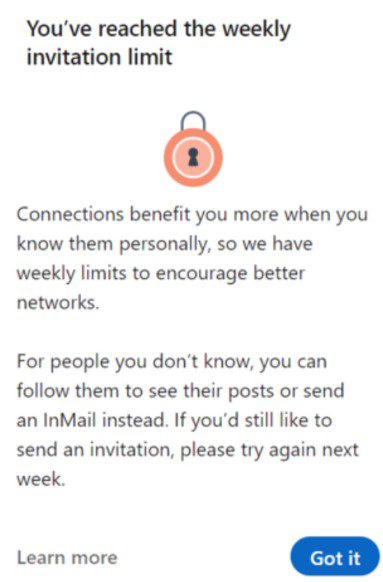
If this happens once, it’s no big deal. The limit resets every week.
However, if you consistently keep on hitting it or keep sending too many requests too fast, you can face harsher repercussions. These may include temporary account restrictions and shadowbanning. Worst-case scenario, you could get your LinkedIn account restricted permanently.
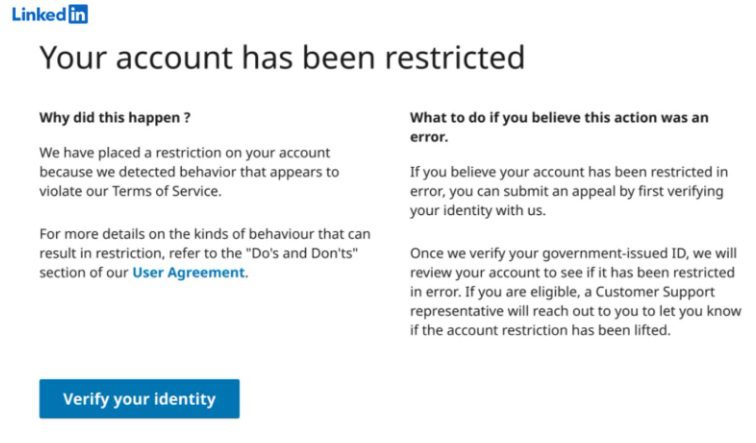
How to bypass the LinkedIn connection limit [+ 5 workarounds]
You’ve seen the risk. Yet, many people on LinkedIn are successfully scaling their cold outreach despite them.
How? They found workarounds!
That said, let’s break down the 5 proven tactics to bypass LinkedIn’s connection cap safely.
1. LinkedIn inMails
InMails are free or paid direct messages on LinkedIn that you can send to members not part of your network, contrary to a regular LinkedIn message. By sending them, you can actually avoid using your connection limit.
LinkedIn InMail is, for many, a mystery, therefore underused and often wasted. That’s quite a shame, taking into account that, according to the official LinkedIn Learning courses, InMails have an average response rate of between 18 and 25% compared to cold emails’ 3% average response rate.
Every member on LinkedIn can receive an InMail, but only Premium members can send them. Similarly, they also receive a specific number of inMail credits each month (varies by subscription type), which can accumulate for 3 months.
LinkedIn’s way to encourage meaningful LinkedIn connections is by giving the paid InMails credits back to the sender each time they get a reply.
Additionally, every paid LinkedIn subscriber gets to send 800 free InMails a month to members whose profiles are set to ‘’Open’’. It’s precisely these open profiles that can jump to your rescue and help you reach out to a lot more leads!
When should I use LinkedIn InMail?
InMails can be your last resource to get to the desired lead. Or they can be a wise hack to reach out to business decision-makers who get numerous connection requests every day.
Let’s say you tried to connect with a specific lead on LinkedIn. Then, you’ve sent several emails, but you never got an answer. In such cases, sending a LinkedIn InMail turned out to be a practice that brings results for us and many of our users. InMails can also be part of your automated outreach sequence.
An InMail, among other things, has all the characteristics of a regular email:
- LinkedIn inMail subject line (equivalent to email subject line)
- Body
- Higher character limit compared to regular messages
If well-written, it’s a secure way to stand out in your lead’s Inbox and stay remembered in the long run.
By sending a LinkedIn InMail to a complete stranger on LinkedIn and composing an engaging InMail copy by following these LinkedIn InMail examples with a 25% reply rate formula, you are also diminishing the possibility of your lead clicking I don’t know this person once you send a regular LinkedIn connection invite.
Skylead, our LinkedIn automation and cold email software, allows you to include both free and paid InMails in your outreach campaign.
By default, it will send free inMails to those with open profiles. However, by moving the below toggle to the right, you can give the platform permission to send paid inMails, as well.
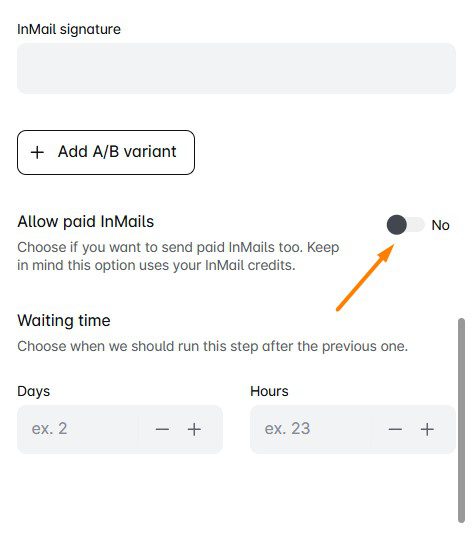
2. LinkedIn groups
Here’s a loophole LinkedIn itself created—and it’s sitting right under your nose.
LinkedIn groups let you message members without sending connection requests, thereby bypassing the invite limit entirely.
To take advantage of this workaround with the help of Skylead, you’ll need a LinkedIn Sales Navigator subscription. That’s because Sales Navigator has a special ‘’Groups’’ filter.
But before you go about using it, you’ll need to join the respective group.
After joining it, go to Sales Navigator Lead filters and scroll down until you spot the Group filter. Then, type the name of the desired group (or groups) and select it. Once you do, the search results will refresh to show you all group members.
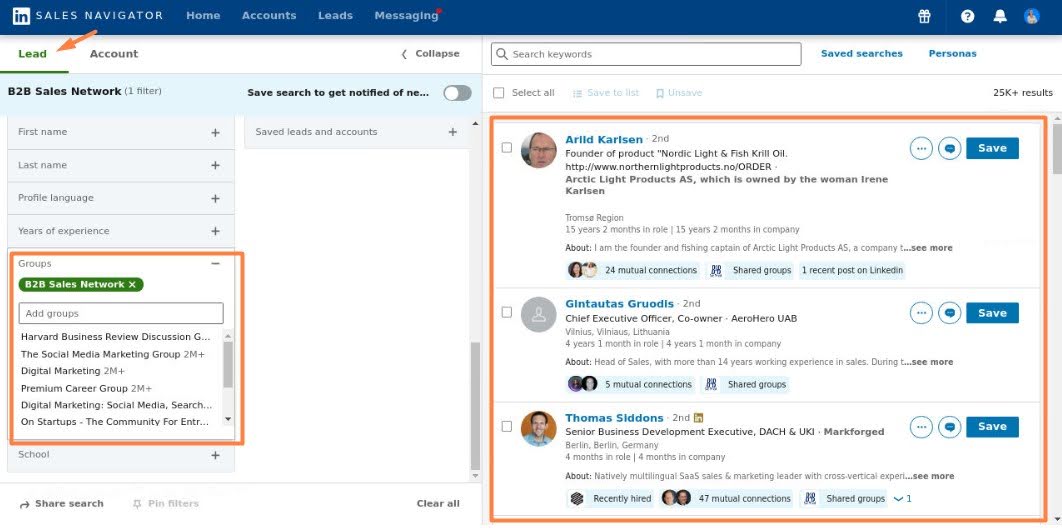
After refining the search results, copy the URL and take it to Skylead to create an outreach campaign to reach out to these group members.
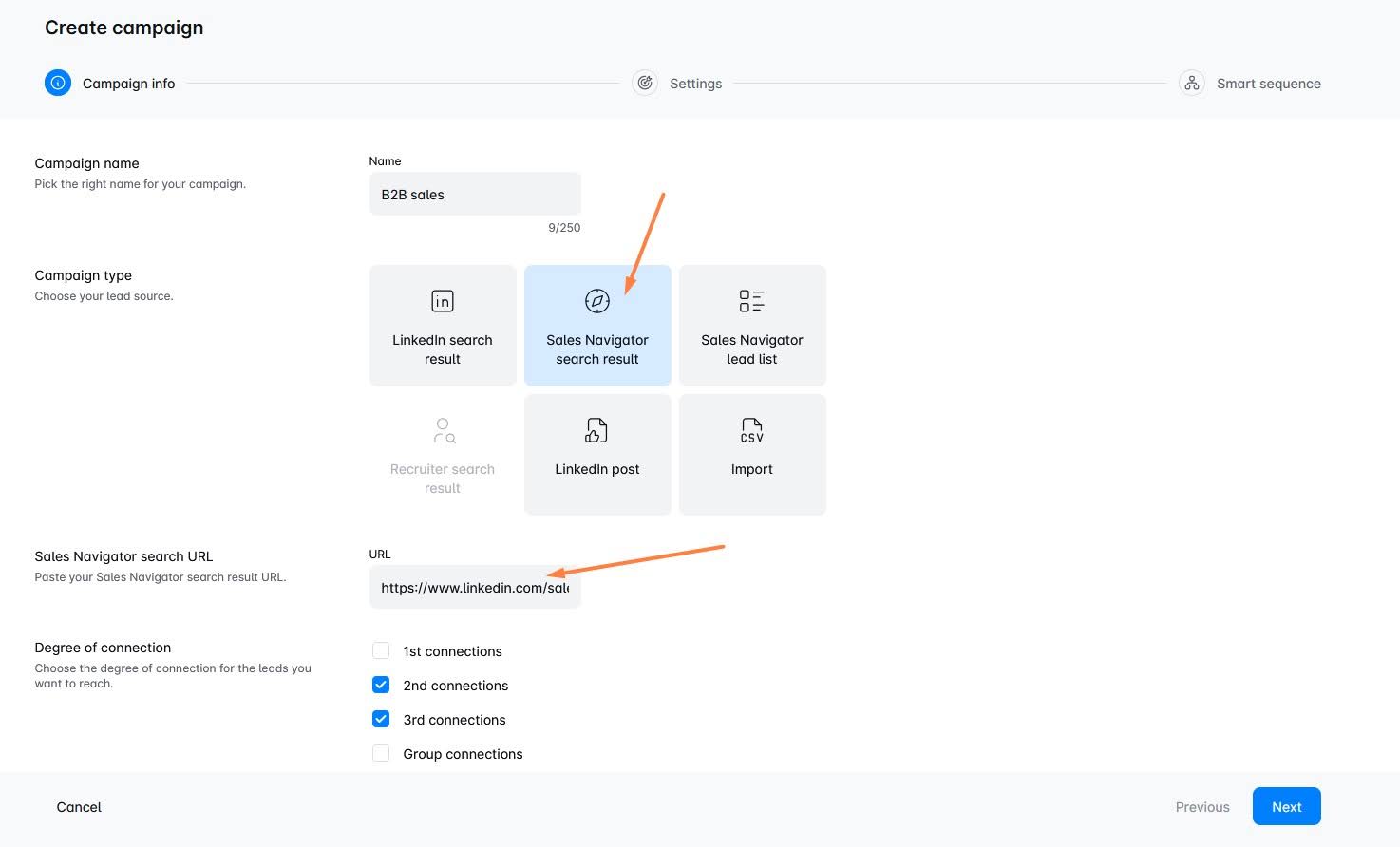
The next step is to create your outreach sequence, but we’ll talk about that in just a bit in point 5.
If you aren’t subscribed to Sales Navigator, however, you can still use LinkedIn groups to reach more individuals, although you’ll have to do it manually.
To do so, navigate to the desired group of which you are a part. Then, visit the Members tab by clicking the “Show all” button in the top-right corner.
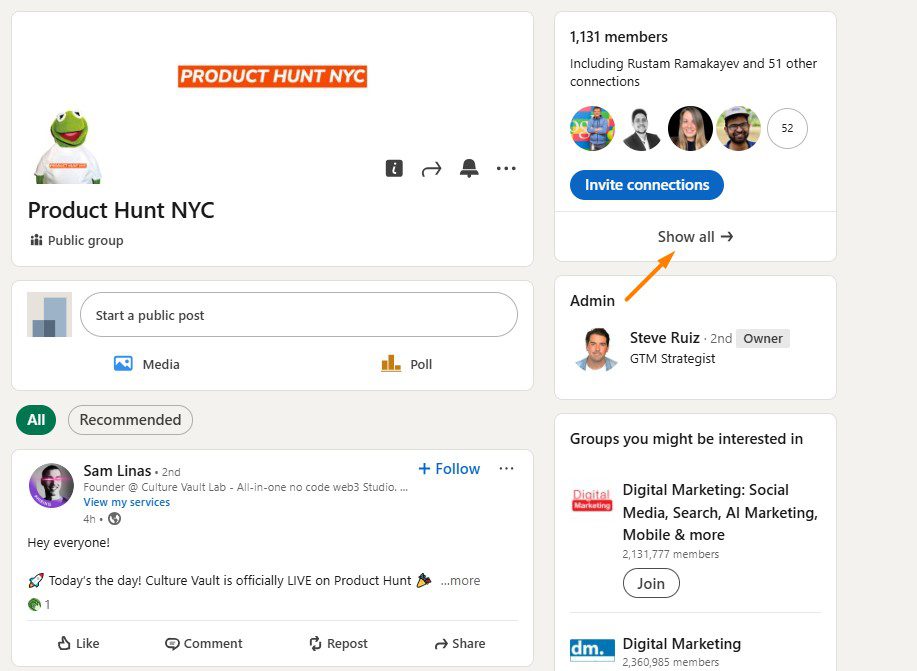
As a result, you'll get a list of all members' profiles, next to which there will be a ''Message'' button that you can use to contact these individuals without being connected to them.
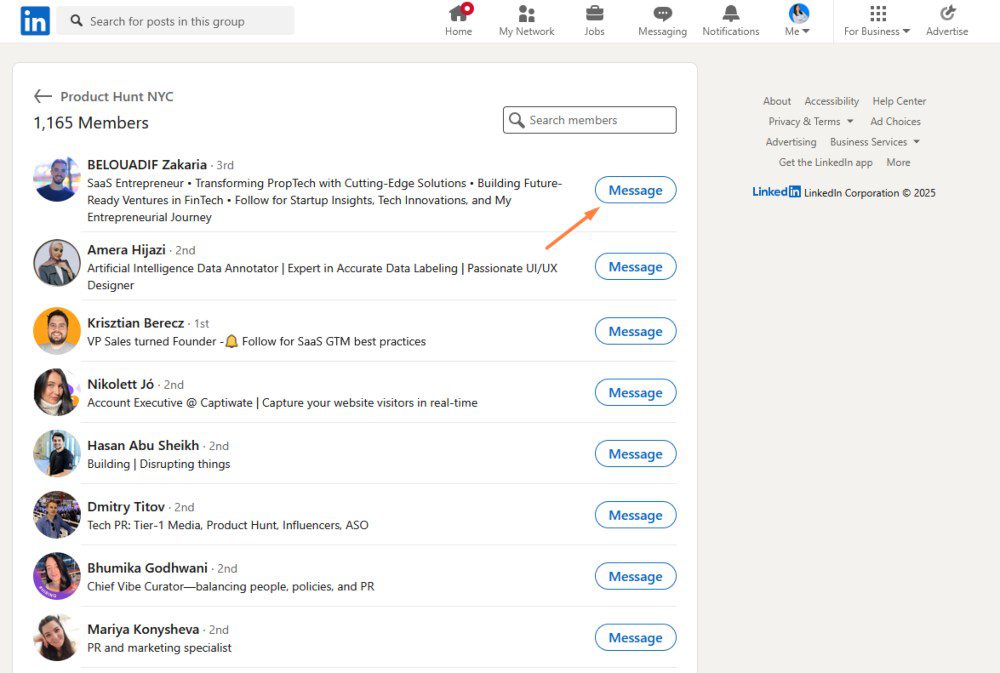
Disclaimer: While LinkedIn groups can help you bypass the connection limit, we don’t recommend you abuse it. Otherwise, LinkedIn may flag your account regardless.
3. LinkedIn Message Ads
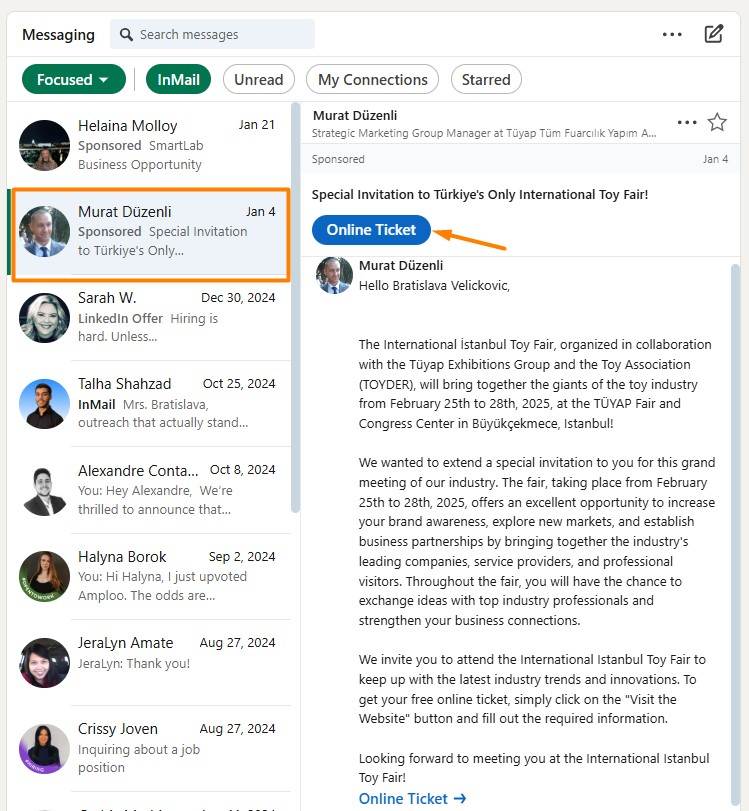
Another way to reach your prospects without worrying about connection limits is by using LinkedIn Message Ads (Sponsored InMail).
Unlike regular messages or connection requests, these ads let you send direct messages to targeted LinkedIn users without needing to be connected. And since they are delivered straight to your recipient’s inbox, they can be highly effective—if done right.
Unfortunately, your prospects can’t directly reply to them. Instead, you need to include a strong call-to-action (CTA) to guide them toward the next step, such as booking a demo, signing up for an event, or visiting your website.
Not to mention, these will cost you between $0.26 and $0.50 per message sent (on average). So, keep this in mind before you decide to run them.
4. Emails
Since we talked about LinkedIn’s version of emails, we cannot help but mention all the advantages of regular cold emailing, too!
Yes, LinkedIn has over 1 billion members. But that doesn’t mean that the platform is the preferred means of communication for all of them. This is one of the reasons why email outreach comes in handy.
If you don’t have the email addresses of your leads already, Skylead can help. Namely, our tool comes with an email discovery and verification feature. You can use it to find and double-verify your leads’ emails without breaking your outreach flow and, thus, reduce bounces.
We’ve also partnered with the email warm-up tool InboxFlare to help you warm up infinite mailboxes. This feature prevents your domain from being blacklisted by making sure your emails land in the Primary inbox rather than spam.
Got email addresses all set? Here is how you can make the most out of the email channel.
Take the multichannel approach
We know the goal is to bypass the connection limit on LinkedIn. But you don’t want the connection requests you sent already to be in vain, don’t you?
To maximize the chances of getting to your lead, send the same message through email as you did on LinkedIn and see where you get the response faster. If you don’t get a reply whatsoever, check out some hacks on how to write a follow-up email after no response.
Use email to complement your connection message
Elaborate on the LinkedIn connection messages sent on LinkedIn, as email gives you more freedom in terms of character limits.
For example:
Subject line: Sara <> John
Hi Sara,
I recently tried connecting with you on LinkedIn.
I saw that you’re VP of Sales at PowerData.
That said, I was curious if you are using cold outreach to get new clients.
If the answer is yes, I would love to show you a multichannel solution that can help you scale your sales with minimal effort.
Would you be interested in learning more about our solution?
Best,
John
Ask for a connection request via email
Ask someone to send a LinkedIn connection to you by inserting a link to your profile in the email if you reached the LinkedIn connection limit for the week or want to get to more individuals without reaching it.
For example:
Subject line: Loved your post on cold outreach…
Hey John,
Love the post you recently made on LinkedIn about Cold Outreach and totally agree with you on "how SDRs should be more creative".
I am a content creator, and I post mainly about prospecting, cold outreach, LinkedIn and email outreach hacks, and lead generation.
I figured my content could benefit you and your team, so I wanted to connect with you on LinkedIn.
Here’s a link to my profile - linkedin.com/in/tom.smith
Also, I saw that you’re Head of Sales at Leadgen.io and was curious if you are using any solutions to make your sales more efficient.
Best,
Tom
5. Smart sequences
You can use email as a complementary channel to LinkedIn outreach and a way to get around the connection request limit.
But using it manually is certainly not ideal. And that’s why you need Smart sequences.
They are Skylead’s all-star feature that allows you to combine all platform solutions in one campaign. Why? To take advantage of all possible touchpoints with your leads.
Smart sequences are essentially algorithms that combine LinkedIn and email actions with if/else conditions. They operate in real-time, adjusting according to your leads’ behavior to reach them in the fastest possible way.
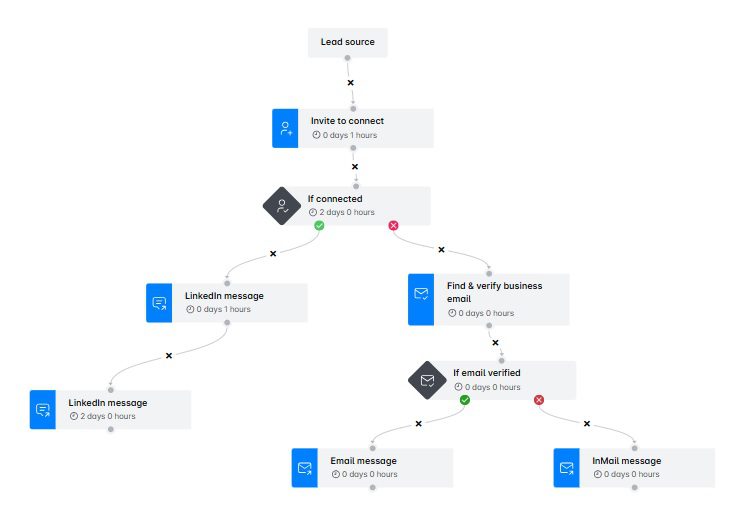
As you may see from the above example, Smart sequences are perfect for bypassing the LinkedIn connection limit. What this particular sequence implies is that if connection requests go unanswered, our tool proceeds to find and verify leads’ emails. If it manages to do so, it proceeds to send an email, whereas if not, an inMail.
If you want, you can also skip the connection invite step altogether (if, say, you hit a limit) and go straight to view profile, find & verify, send email, and inMail steps.
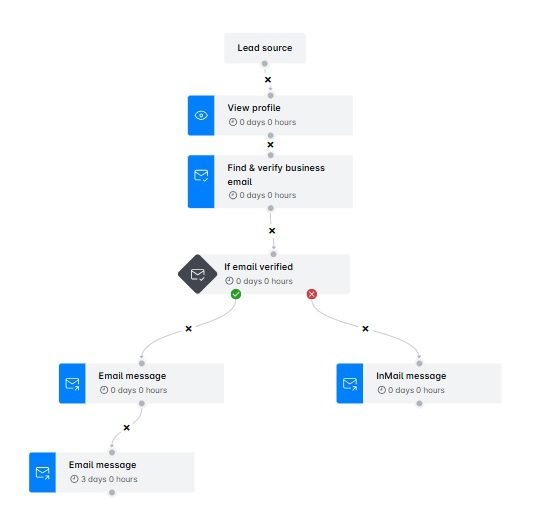
Or create your Smart sequence any other way you like!
PS: We’ve personally tested these Smart sequence templates, so don’t forget to check them out for guaranteed results!
How to increase the LinkedIn connection request limit?
Remember how we said LinkedIn limits can vary from account to account, depending on different factors?
Does that mean you can increase the limit?
Yes, to an extent.
While you can’t dramatically increase your connection limit, you can push the boundaries and send slightly more invites than the supposed caps.
Let’s see how you can make that happen!
1. Warm up your LinkedIn account
If you’re new to LinkedIn or haven’t been very active, you can’t just start sending connection requests in bulk. LinkedIn monitors user behavior, and sudden spikes in activity can raise red flags and cause them to keep a closer eye on you.
That’s why you need to warm up your LinkedIn account. In other words, gradually increase your activity to signal to the platform that you’re a real user engaging naturally.
Begin by sending 5 connection requests per day, then increase the number slowly over a few weeks.
If you plan on using Skylead, you’ll see that you can set a range for invites sent daily and adjust this range accordingly as your account warms up.
After signing up, Skylead puts you in warm-up mode by default to protect your LinkedIn account. It then slowly increases your limits until your account is fully warmed up.
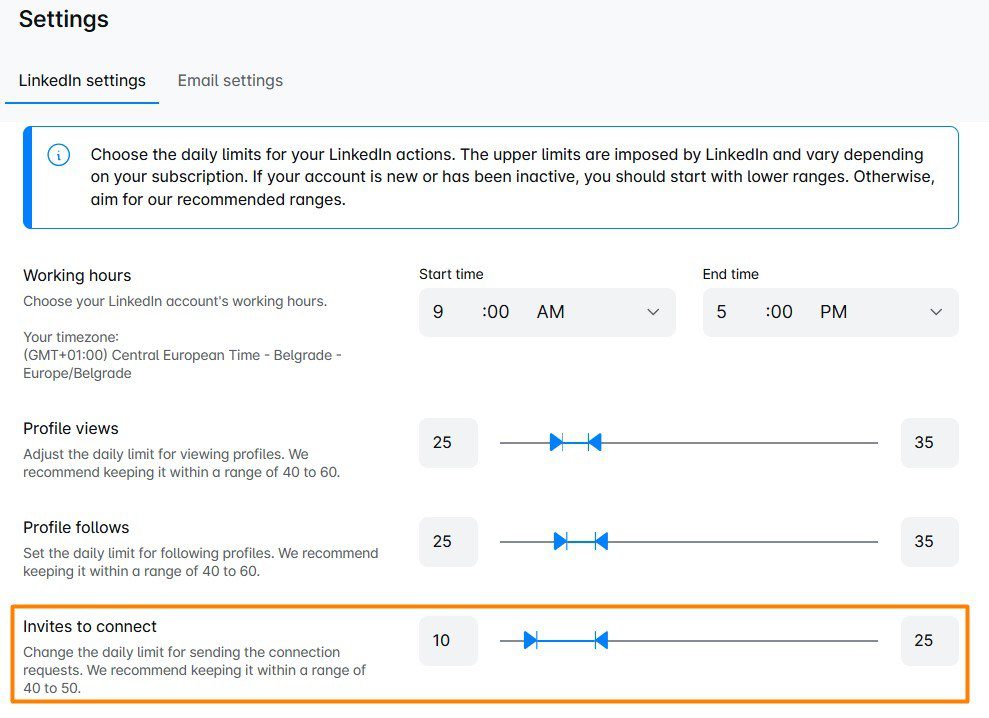
2. Maximize your connection acceptance rate
The higher your acceptance rate—and the fewer people rejecting your invites or marking you as “I don’t know this person”—the more connection requests LinkedIn allows you to send.
Here are the steps to follow to improve your acceptance rate and keep your account in good standing.
Optimize your LinkedIn profile
When someone receives your connection request, they’ll likely check your profile before deciding to accept. Thus, it’s safe to assume that a half-completed or unprofessional-looking profile can deter them from doing so.
An optimized LinkedIn profile is one that’s:
- Complete – Includes a professional LinkedIn cover photo and profile photo, a compelling LinkedIn headline, and a LinkedIn summary that clearly states what you do.
- Credible – Highlights relevant work experience and skills and is endorsed by others.
- Engaging – Features impactful posts.
Also, don’t forget to change your LinkedIn URL so it includes your name and/or what you do.
Aim for relevancy, not quantity
The more the merrier is not always better, especially if we’re talking about your LinkedIn network.
Instead of sending invites to anyone and everyone, focus on those who actually match your Ideal Customer Profile (ICP) and Buyer Persona.
Personalize your connection messages
Many make the mistake of sending blank invites or those accompanied by generic messages when personalized outreach is the road to a higher acceptance rate.
To personalize the invite:
- Reference a shared interest, mutual connection, or a recent post they made.
- Keep it under 300 characters and get straight to the point.
- Let them know why connecting benefits them, not just you.
For example:
"Hi {{firstName], I saw your recent post on {{Topic}} and completely agree with your take. I’d love to connect and exchange thoughts!
3. Increase your SSI score
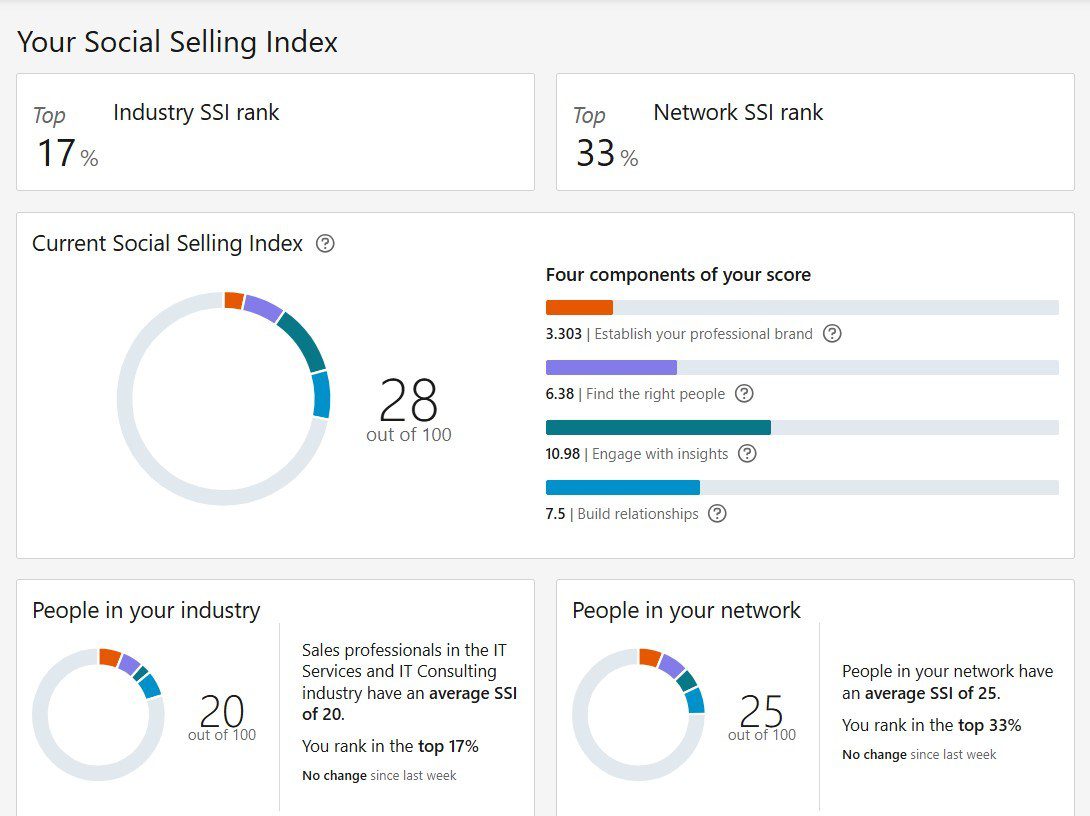
The Social Selling Index (SSI) score is LinkedIn’s way of measuring how effectively you are using LinkedIn for social selling purposes.
A higher SSI score often correlates with better outreach success and may even influence how many connection requests you can send.
In other words, the more active and credible you are on LinkedIn, the more flexibility you get.
The platform evaluates SSI score based on 4 pillars:
- Establish your professional brand
- Find the right people
- Engage with insights
- Build stronger relationships
That said, here are a few actionable steps to increase it, broken down by each pillar.
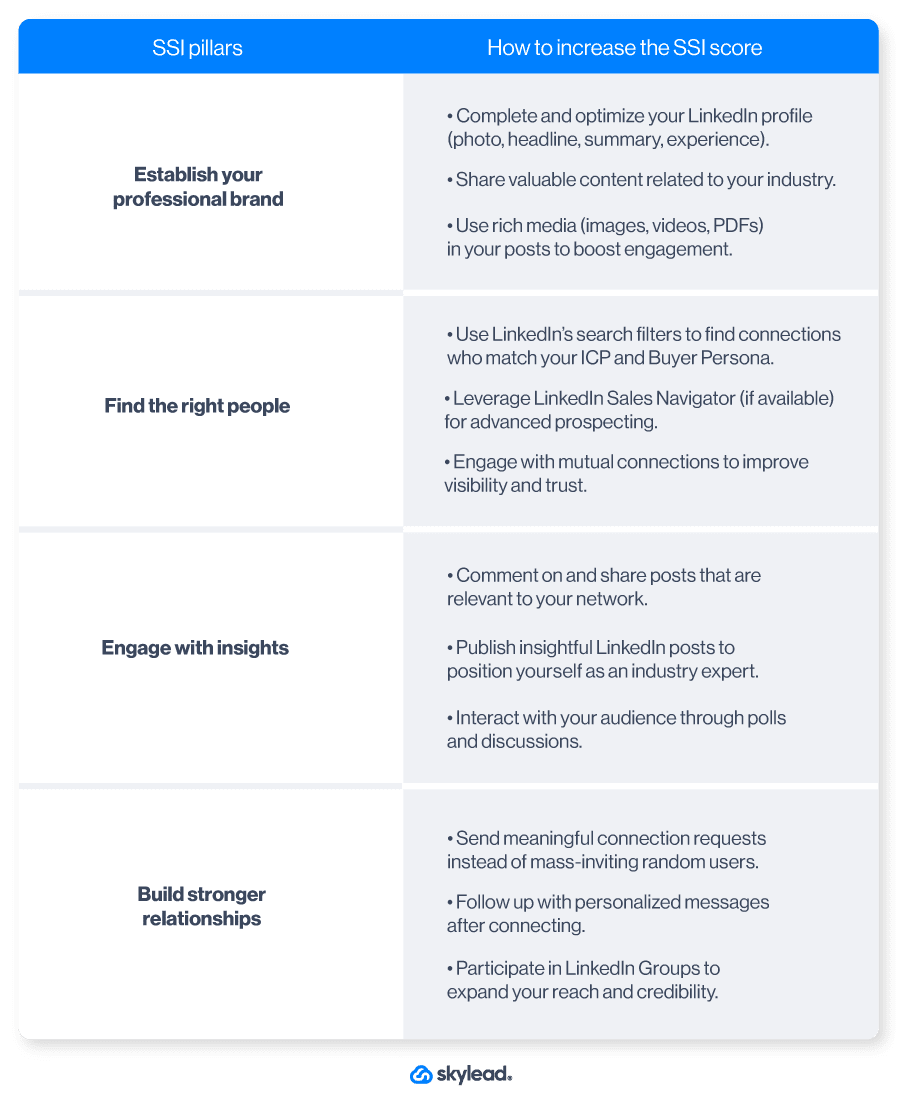
Seeing as most of these tips match the best practices for increasing the LinkedIn connection limit, it’s clear that SSI and the limit are closely connected. Consequently, increasing one increases the other.
4. Delete pending invites
Did you know that having too many unaccepted connection requests can hurt your LinkedIn account?
If your invites keep piling up with no response, LinkedIn may see this as a sign that your outreach is unwanted and could limit the number of connection requests you can send moving forward.
For that reason, you must review your pending invites regularly and cancel LinkedIn invites that have been ignored for too long.
To delete invites manually, first, go to My Network on LinkedIn and click ‘’Manage’’.

Then, navigate to the Sent tab, where you’ll be able to withdraw them
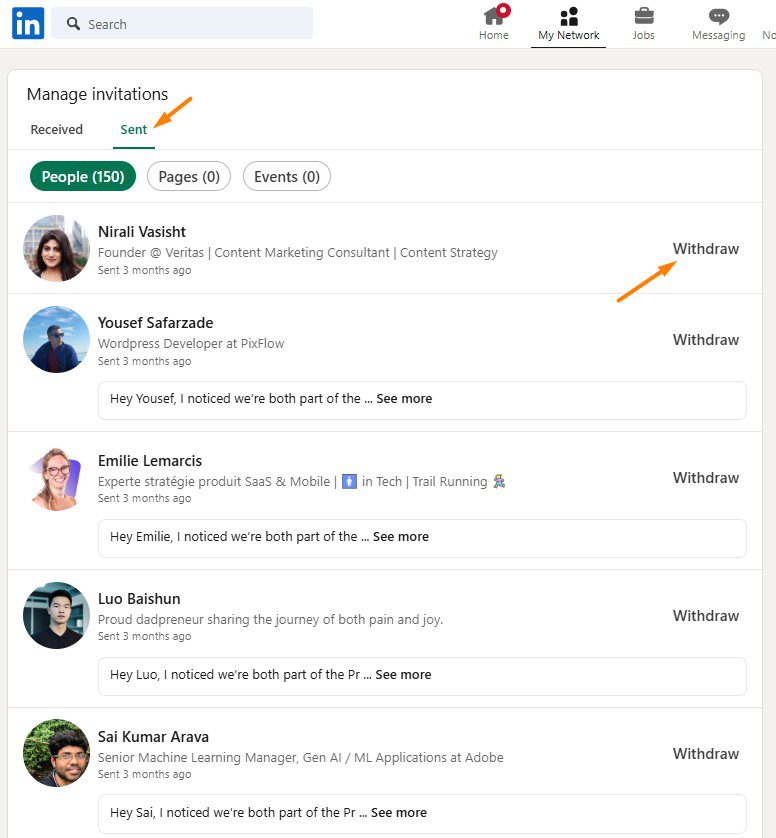
As a rule of thumb, it’s best to withdraw any request that goes unanswered for 3 weeks.
And while you can go about it manually (as seen), this can take a while, depending on how many invites there are.
However, if you're using Skylead for outreach, you can automate the process. As a matter of fact, our tool can automatically revoke unanswered connection requests to keep them under a specific limit—one that you decide on. Once that number is reached, Skylead will start deleting the oldest connection requests to make sure your account stays within a safe range.
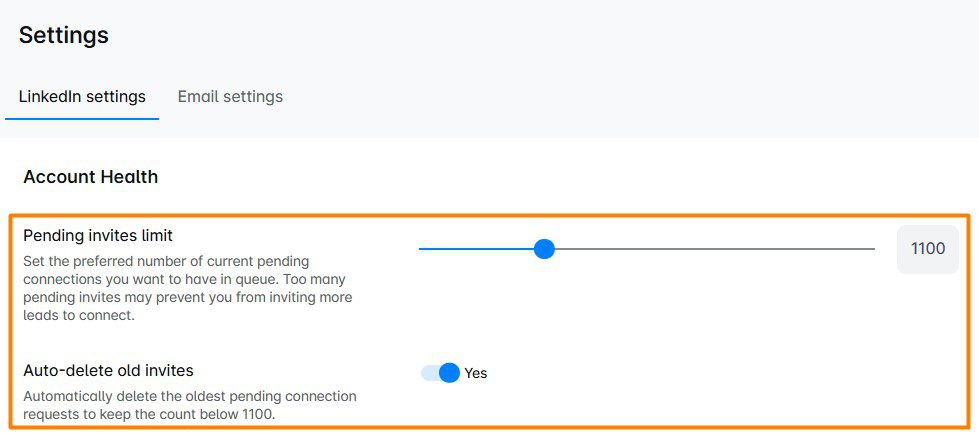
And since withdrawn invites don’t count toward your weekly limit, you’ll free up space to send new ones.
5. Combine sending invites from the computer and phone
There’s a small loophole that can help you send more connection requests than LinkedIn’s standard limit: sending invites from both your desktop and mobile device.
For some reason, LinkedIn seems to allow slightly more invites when they’re sent from a phone. However, the exact number of additional requests you can send isn’t clear. Some users report being able to send 10-15 extra invites per week without triggering any restrictions.
To use this trick effectively:
- Start by sending most of your invites from your computer as usual.
- Once you’ve reached your estimated weekly limit, switch to your LinkedIn mobile app and continue sending a few more connection requests.
- Monitor your account activity carefully to avoid hitting an unexpected cap.
This method isn’t officially documented by LinkedIn, so it’s best to use it cautiously.
Therefore, test with a small number of extra invites first and gradually increase them to see what works for your account.
6. Subscribe to Sales Navigator
According to some users, Sales Navigator subscribers can send up to 200 invites per week. This is double the standard limit!
There’s no official LinkedIn statement on this, however. Furthermore, the actual limit may vary depending on your account activity and engagement levels.
Nevertheless, since the tool is designed for sales professionals who typically send more invites, it’s not surprising to think they’d offer more flexibility to this group.
Frequently asked questions
How many LinkedIn connections can I have?
The platform limits the number of 1st-degree connections to up to 30,000. After you reach this number, you won't be able to send or receive invites until you remove connections on LinkedIn. On the other hand, you can follow and be followed by an unlimited number of members.
LinkedIn Follow vs Connect
When someone is your 1st-degree connection, you can see each other’s content and any update on your feeds. Also, you are allowed to exchange regular LinkedIn messages. You always follow your 1st-degree connections by default, but you can also unfollow them. If you turn on the Creator Mode, you can continue growing your network without necessarily adding new connections.
Does LinkedIn limit connection requests?
Yes, LinkedIn imposes LinkedIn connection limits. Currently, most users can send around 100 invites per week, though this number varies based on factors like your profile age, activity level, etc. However, some users claim Sales Navigator subscribers can send up to 200 connection requests per week.
When does the LinkedIn connection limit reset?
Your LinkedIn connection limit resets at the beginning of each week - over the weekend or Monday, depending on the user. Basically, if you hit it on Friday, you won’t wait long to have your connection limit reset.
LinkedIn connection limit? No more!
As you can see, there’s no reason to panic over the LinkedIn connection limit.
By using workarounds—InMails, LinkedIn Groups, Message Ads, and email outreach—you can continue growing your network and scaling your outreach without hitting a wall. And if you’re looking to streamline the process even further, Skylead has your back!
With Skylead, you can:
- Bypass connection limits using Smart sequences that combine LinkedIn and email outreach actions.
- Automate time-consuming tasks so you can focus on closing 3x the deals instead of managing invites.
- Boost engagement rates with advanced personalization, including Image and GIF hyper-personalization and dynamic variables.
If you're not part of the Skylead team yet, now’s the time to give it a try!
Register today and test Skylead for FREE for 7 days. Our support team is ready to help from day one—so you can start scaling your outreach with confidence.
Are you thinking of launching your first automated outreach campaign to reach out to your leads, book meetings, distribute content, or find new clients, ideal candidates, and backlinking partners?
We’ve got your back!
In this blog, we’ll take you through the entire campaign creation process using our powerful LinkedIn automation tool and cold email software - Skylead - as an example.
We’ll even throw in some tips and tricks on achieving outreach success and cover use cases and outreach messages for every profession.
Let’s dive into it.
What is an outreach campaign?
An outreach campaign is an automated campaign that uses tools to streamline all outreach activities, thus allowing individuals to connect with their target audience faster. People may initiate these for email and/or LinkedIn lead generation purposes. However, they also use outreach campaigns to find new clients, nurture relationships with existing clients/customers, increase brand visibility, or promote content.
In the past, outreach campaigns revolved around individuals contacting other individuals manually, typically over the phone. Fast forward to now, we have outreach tools like Skylead to handle the reaching out part — over multiple channels, nonetheless!
The benefits of setting up an outreach campaign
Outreach automation has revolutionized the workflow of countless people! Here’s why!
Firstly, there’s the time-saving aspect. Automated outreach campaigns can be real game-changers, saving you as much as 11+ hours per week on manual work. That’s an extra 6 days each month to focus on other tasks!
What’s more, with outreach campaigns running on autopilot, you can reach a larger audience in a shorter period. This allows you to allocate resources more effectively and, thus, improve overall productivity. You can even reach people you thought were unreachable before, as email enrichment features like Skylead’s email discovery & verification can be included in the campaign flow.
Yes, as your business grows, so will your outreach. But that’s not a reason to worry! You can automate multiple campaigns at the same time and scale without compromising quality.
Finally, automated campaigns ensure no lead falls through the cracks. The system keeps things moving, whether through personalized emails, follow-ups, LinkedIn messages, or inMails.
Outreach campaign use cases
Salespeople
Sales professionals are often seen juggling multiple leads at a time. With so many leads to manage, little time is left for other tasks, plus the risk of missing important messages increases. Outreach campaigns streamline the process and ensure consistent communication across multiple channels.
Sales reps can continuously create campaigns with thousands of leads to keep their calendars consistently full. These campaigns also allow them to automate various outreach tasks, leaving them only to respond to messages and book calls.
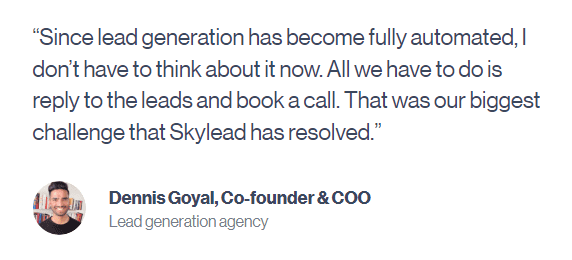
Why does this matter, though?
Because automating outreach tasks such as sending LinkedIn connection requests, inMails, messages, and emails helps sales professionals save +11 hours a week—hours they can now focus on lead nurturing.
Lastly, outreach campaigns permit salespeople to A/B test their messages. This allows them to see what works and what doesn’t, which in turn helps them optimize their campaigns for better results.
Marketers
When it comes to marketers, they can use outreach campaigns to:
- Generate leads for their sales teams;
- Find backlinking partners faster;
- Distribute content and reach wider audiences;
- Increase conversion — Marketers can leverage Skylead’s email discovery and verification feature to find their leads' email addresses. Once the tool finds and verifies emails, they can use them to create a lookalike audience on LinkedIn, Google Ads, and/or Facebook, which will result in better targeting and increased conversions;
- Expand their network and become thought leaders.
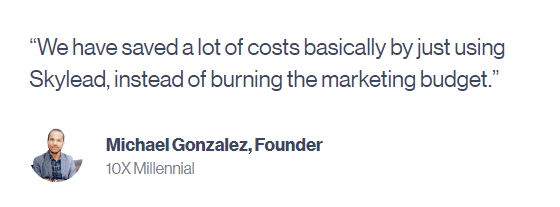
Recruiters
Manual cold outreach can be time-consuming for recruiters who are constantly scouting for the best talent. Thankfully, automation simplifies candidate engagement.
That said, recruiters can set up automated sequences to:
- Generate a large pool of candidates and pick the best from the crowd;
- Speed up the hiring process;
- Target individuals attending specific job fairs;
- Personalize the outreach to keep candidates’ interest high.
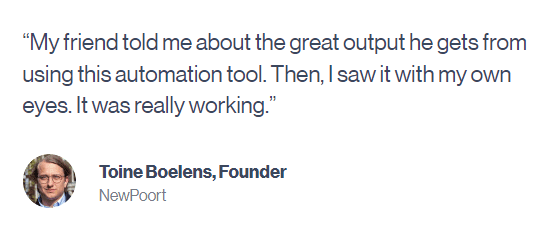
Company founders and agency owners
Company founders and agency owners typically have a full plate of managing daily operations, strategizing business development, ensuring financial health, and more. Automated outreach campaigns lighten the load and accelerate revenue growth.
If you are a company founder and have a B2B product or service to sell, outreach campaigns can help you reach out to a wider pool of leads and find clients faster on autopilot.
Meanwhile, if you are offering lead generation services as an agency, you can often white-label the tool used for campaign creation and thus help yourself to another stream of income. Moreover, outreach campaigns can also help you generate new leads for yourself and your clients!
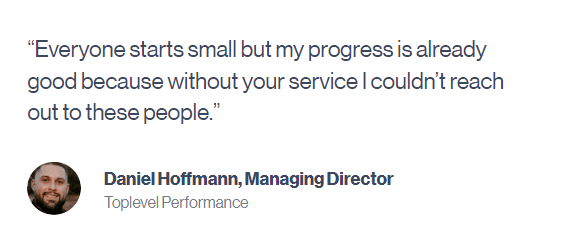
How to conduct an outreach campaign: Step-by-step guide
Now that we’ve covered the basics, it’s time to launch your first campaign! We’ll use our own tool, Skylead, to show you how you can use outreach tools to create one.
When you don’t know where to start…choose LinkedIn.
Jokes aside, in this blog, we will make a LinkedIn search-based campaign to ease you into the entire outreach campaign creation process.
However, you should know that, when it comes to Skylead, options are far more extensive. Aside from LinkedIn search, you can target leads from a:
- Sales Navigator search
- Sales Navigator lead list
- Recruiter search, Talent pool, and Pipeline URL
- LinkedIn post
- LinkedIn event
You can also import them through:
- API,
- And a CSV file.
That said, here’s how to start creating your outreach campaign.
#1 Target your audience
Start by typing a keyword in the search area.
We went by a job title.

After you click "People", choose the LinkedIn connection type you want your outreach campaign to target.

1st-degree connections are members with whom you are already connected on LinkedIn. Choose this connection type if you want to run a LinkedIn message campaign.
Meanwhile, 2nd-degree connections are leads you aren’t connected to but with whom you have mutual connections. You can’t send them a message right away. Instead, you need to connect with them first or reach out to them via LinkedIn inMail or email.
As for 3rd-degree connections, you aren’t connected to them either, but you also don’t have any mutual connections. Similarly to 2nd-degree connections, you can also reach them via email and/or inMail (free or paid).
Back to pinpointing your audience, you can also apply other filters to narrow down your search further (see the ‘’All Filters’’ option on the right).

Your search can result in thousands of leads, but LinkedIn limits the results to 100 pages, with 10 leads per page. So, if you create a LinkedIn search-based campaign, you can reach a maximum of 1000 people. However, if you're using Sales Navigator, the limit increases to 2,500 leads per campaign. Therefore, it is recommended that you narrow the list down as much as possible.
This is where defining your Ideal Customer Profile (ICP) and buyer persona comes in handy.
Your ICP is the type of company that would benefit most from your product/service, and your buyer persona is a fictional representation of your ideal customer within that company, as informed by market research and actual customer data.
That said, define your ICP and buyer persona first and use the corresponding LinkedIn filters to find them. That's how you'll target the best leads!
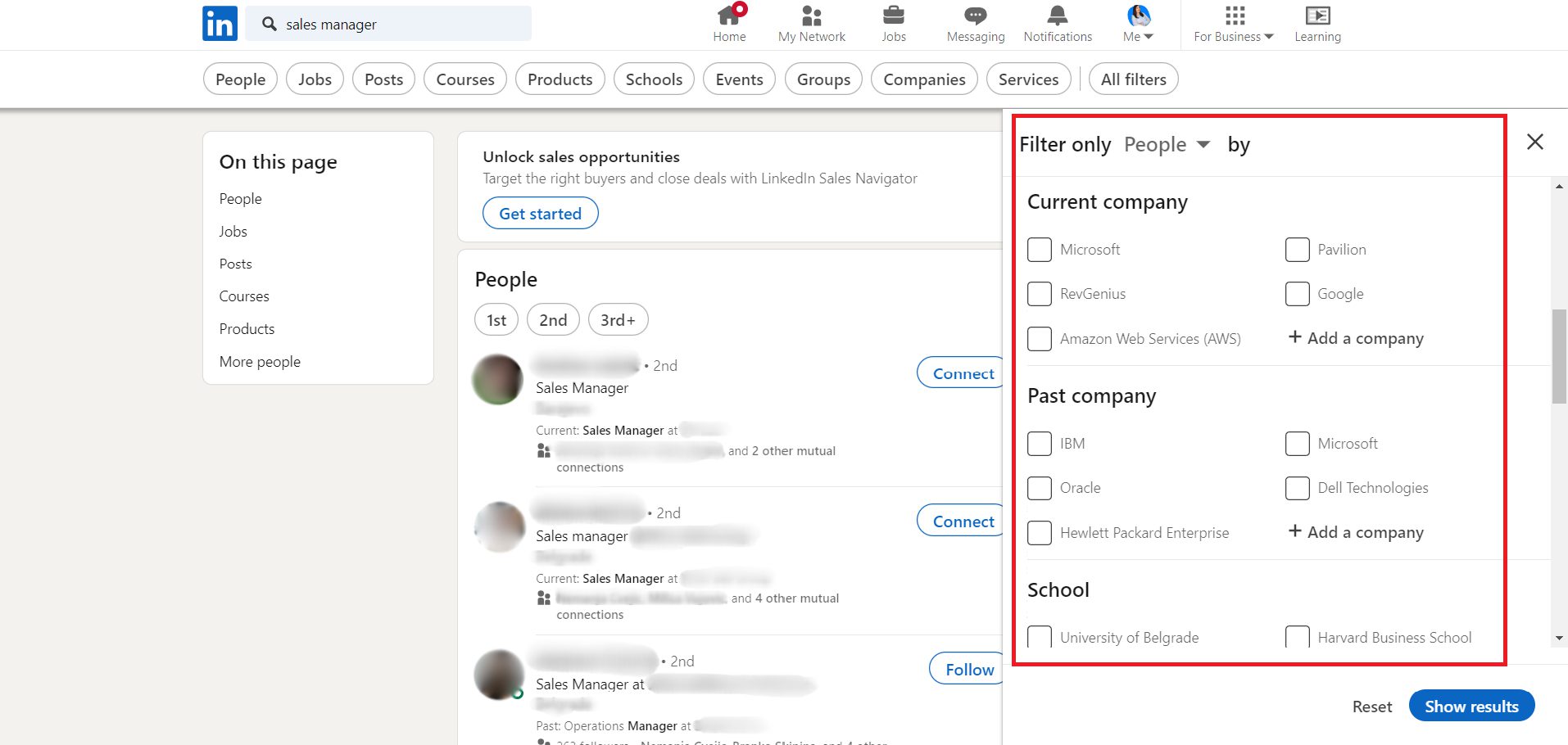
#2 Import your leads
You’ve completed LinkedIn prospecting and carefully chosen your audience. What now?
You proceed to build an outreach campaign!
To do so, firstly, go to your Skylead dashboard and locate the Campaigns page.
Once there, click ‘’Create new campaign’’.
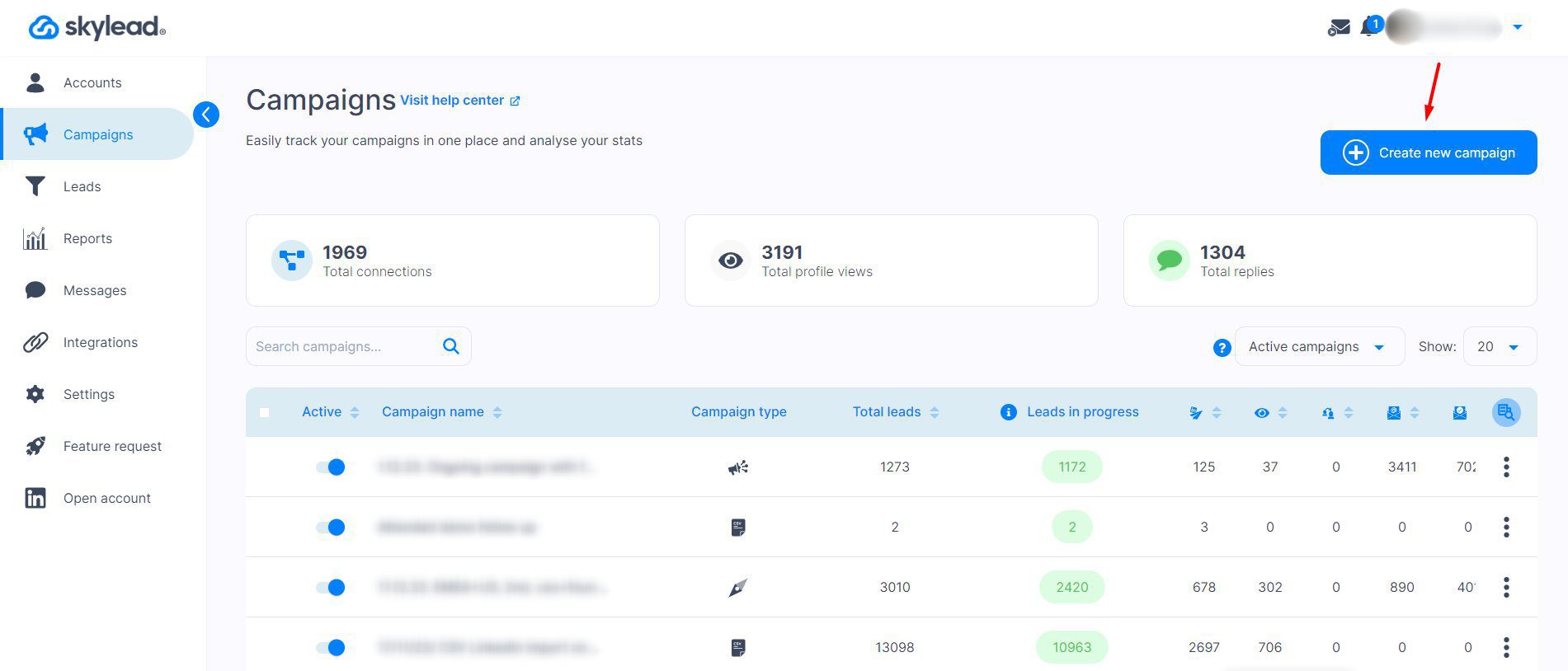
Now, go back to LinkedIn and copy the search result URL.

Return to Skylead, insert your campaign name, and paste the link you just copied.
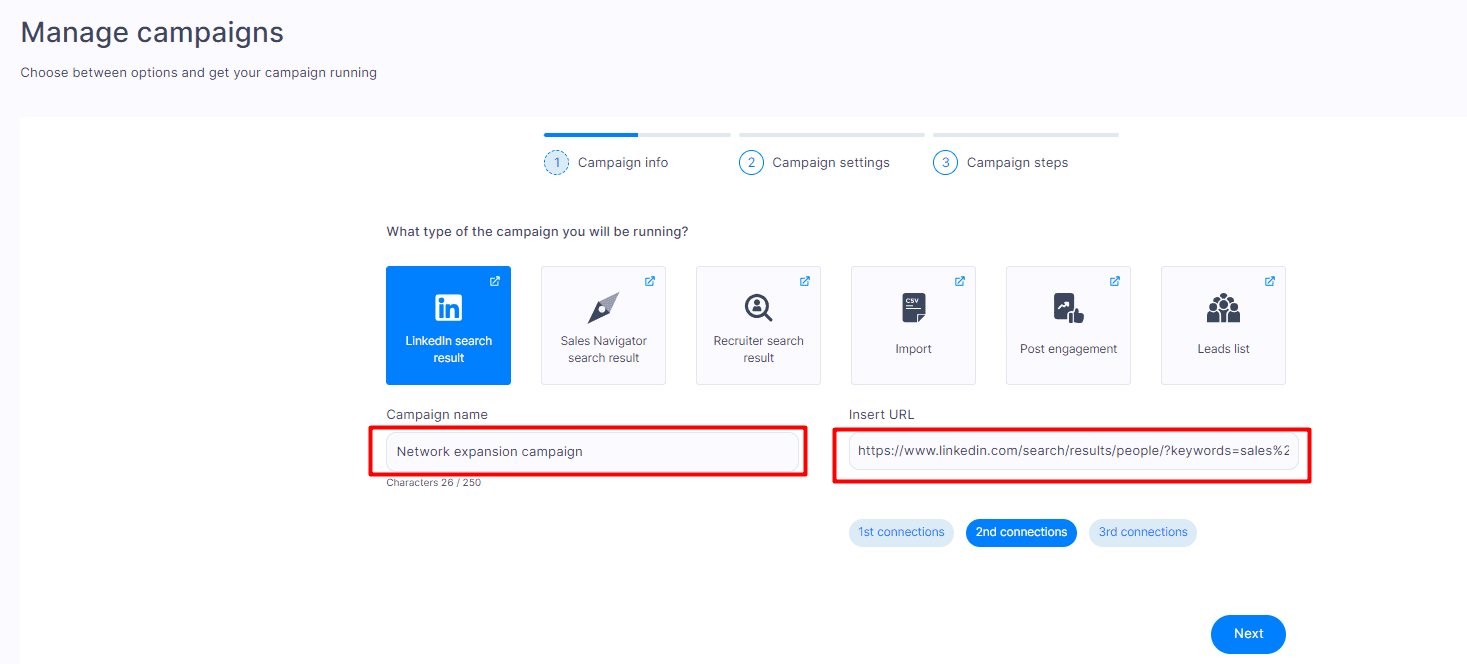
Under the URL, you’ll see a connection-type button. If you’ve selected the connection type on LinkedIn, Skylead will automatically recognize it. If not, you can select it now.
Click ‘’Next’’.
#3 Define outreach campaign settings
Now comes the time to define the settings for your outreach campaign.
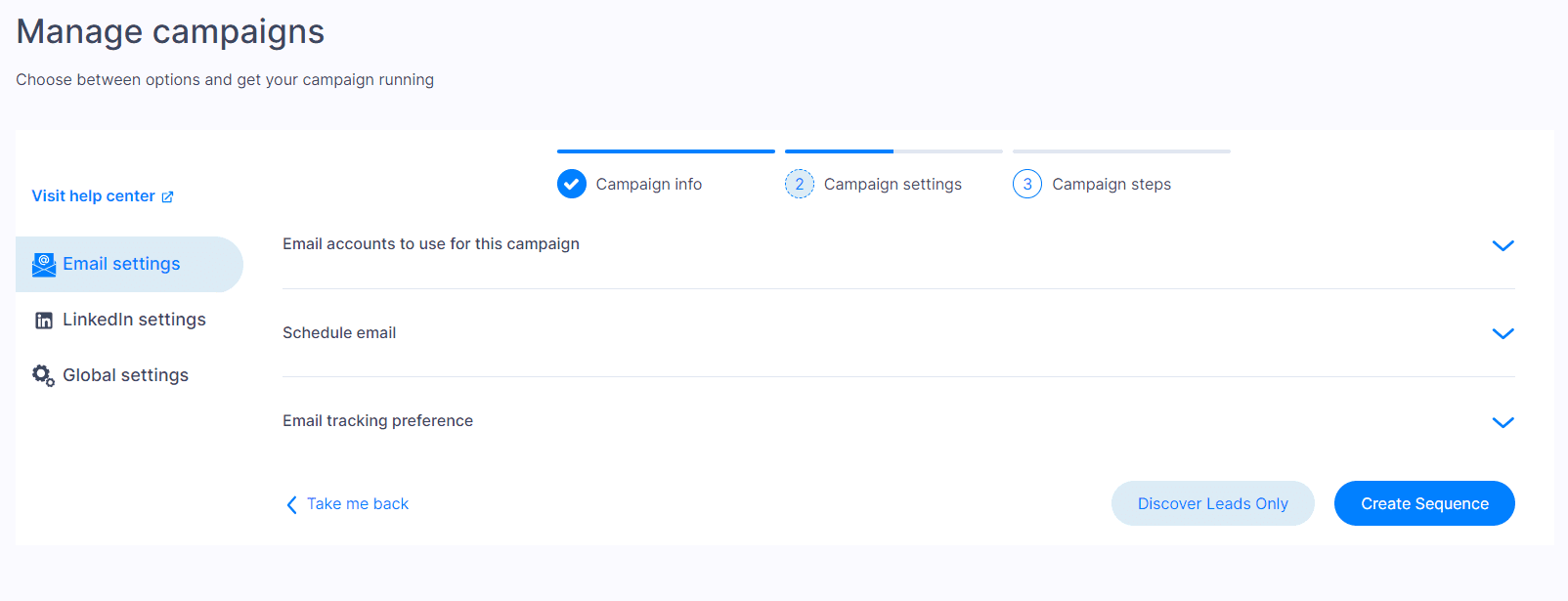
On the left side, you’ll see 3 different types of settings:
- Email settings
- LinkedIn settings
- Global settings
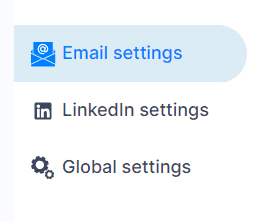
Email settings
If you plan to use email outreach for your campaign, firstly, click the ‘’email settings’’ button.
This is where you’ll notice 3 drop-down menus.

Expand the first menu to select the email account(s) to use in your campaign.
Skylead lets you add an unlimited number of email accounts at no extra cost.
Once added, the software will auto-rotate them so you can send tens of thousands of emails per month. This way, you can bypass the email limit while protecting your domain.
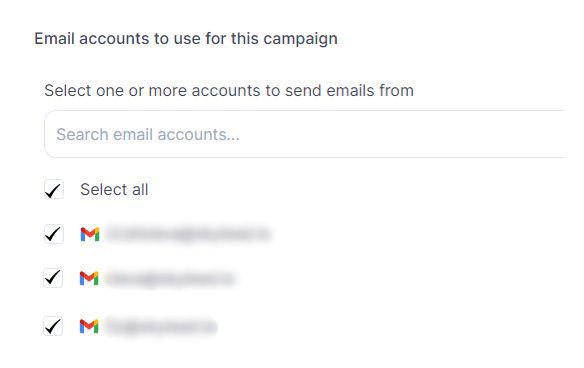
The second menu gives you the option to choose a schedule that Skylead will follow for your email outreach.
Here, you can select your default schedule or create a new one. You can also manage your team’s schedule (unless you are a one-person team).

Lastly, it’s time to set up your email tracking preferences.

With these options on, you can:
- Track the number of email link clicks
- Track the number of opened emails
- Authorize Skylead to send text-only emails (no HTML) with no visuals. However, if you turn this option on, you won’t be able to track opened emails and email link clicks.
LinkedIn settings
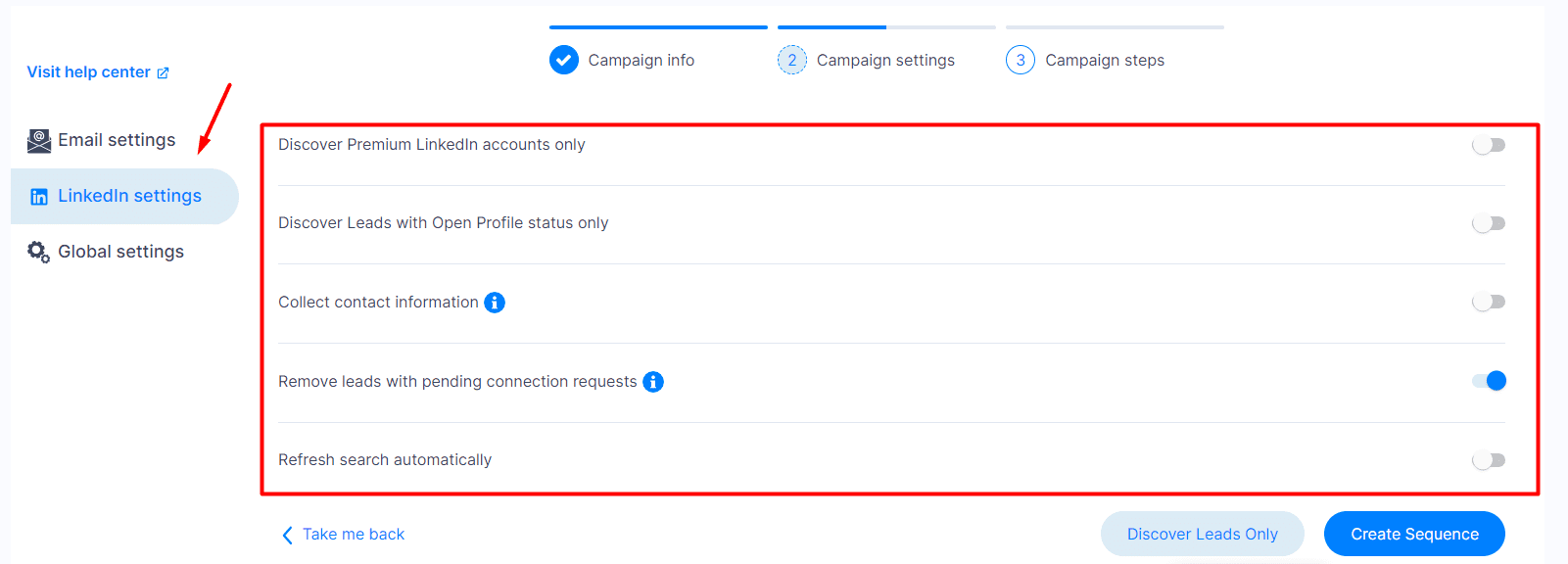
In terms of specific options, you can customize the LinkedIn part of your outreach with:
- Discover Premium LinkedIn accounts only — Turning this one on singles out leads that have a LinkedIn Premium account;
- Discover Leads with Open Profile status only — Select this, and the tool will exclude leads whose profile is set to ‘’Private’’ (aka leads who can only receive paid inMails).
- Collect contact information — With this option on, Skylead will collect all publicly available information from the lead’s LinkedIn profile. This option implies a “View profile” step. You don’t need to add it to your outreach campaign, though; it will be executed in the background.
- Remove leads with pending connection requests to exclude unresponsive leads.
- Refresh search automatically — Turn it on, and Skylead will periodically refresh your search results URL for new leads. Moreover, if they emerge, it will automatically add them to your campaign.
Global settings

Under global settings, you can define targeting options and schedule the start of your outreach campaign.

As for targeting options, you can choose to (or not):
- Include leads that replied to your messages—applies to leads you had a conversation with via LinkedIn messages, inMails, or emails.
- Include leads found in other campaigns from your and your team's seats—this is not applicable to your first campaign, so feel free to keep it turned off. However, if anyone on your team has run outreach campaigns in Skylead in the past, we suggest turning this option off.
- Discover new leads only—If turned off, this option can also include leads from other campaigns under your seat. As such, it’s not applicable to your first campaign. However, if this is your second campaign, keep it turned on to ensure you don’t have any duplicates.
Once you’ve determined the leads to target, select the date and time when your campaign will kick off.

💡 Pro tip: Make sure your campaign starts running (and keeps on running) during your leads’ working hours.
If you’re only interested in finding leads and their contact information for future outreach, click on the ‘’Discover Leads Only’’ button. Then, you can find them on your Leads page.
However, if you wish to reach them out on autopilot, continue to the ‘’Create sequence’’ button.
#4 Build a Smart sequence
Multichannel outreach is currently the most effective way of generating leads, and Smart sequences represent a groundbreaking realization of that path!
It’s precisely these Smart sequences that make our outreach campaign flow. We are talking about an algorithm that lets you combine different actions and if/else conditions that unfold depending on the prospect’s behavior. But what for? To make sure you get to each of them as quickly and efficiently as possible.
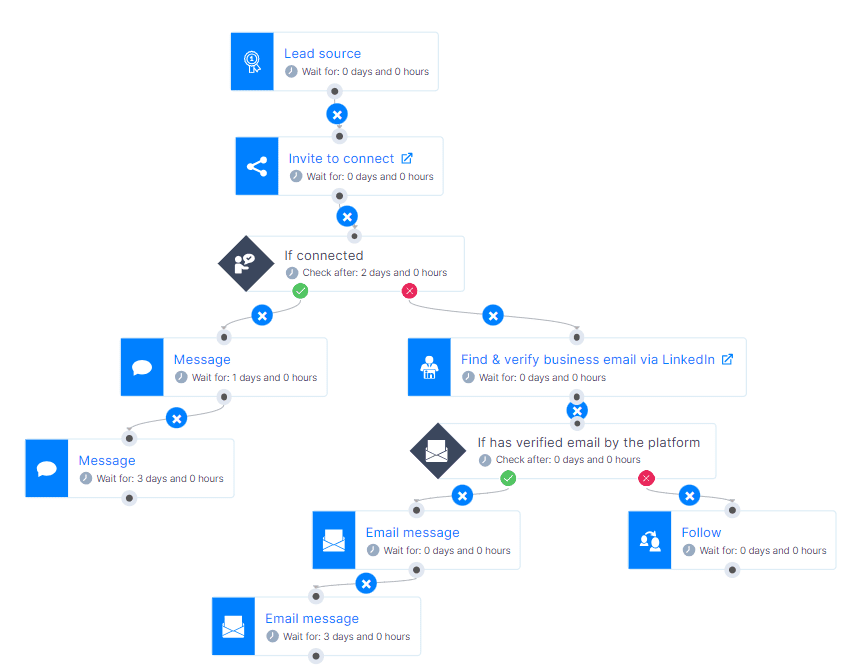
Now, let’s create one, shall we?
After clicking the ‘’Create sequence’’ button, a pop-up will appear that prompts you to decide between using a sequence template or building a sequence from scratch.
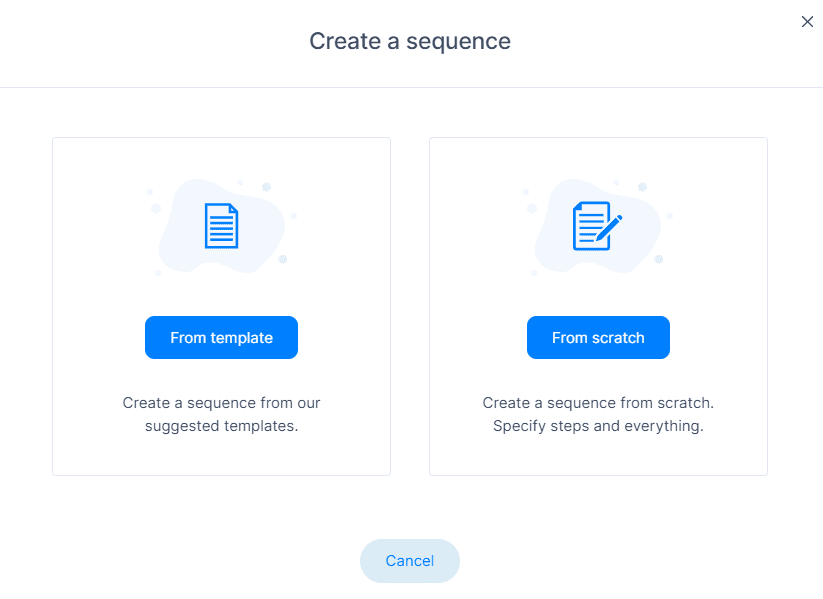
You are welcome to browse through proven smart sequence templates that our team of experts made (and tested) for you. These are templates with real data that you can use immediately.
But for the sake of this blog, we’ll show you how to create one yourself.
So, choose the ‘’From scratch’’ option.
Smart sequence builder
Upon entering the Smart sequence builder, this is what your dashboard will look like.
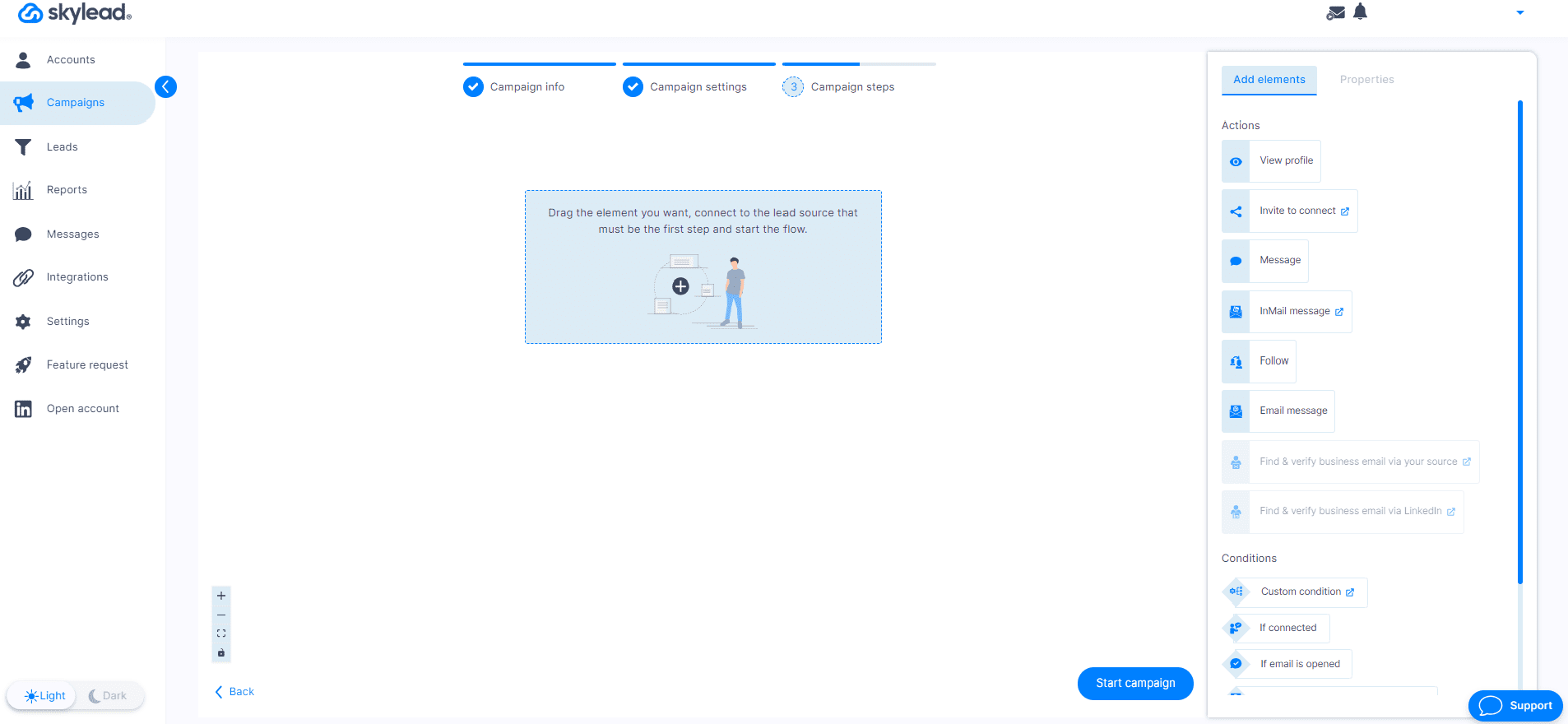
As you may see, there are actions and conditions on your right.
Drag them one by one to the workspace dashboard and connect them in a coherent way to create your outreach flow! Don’t forget to set delays between the actions because they ensure human-like behavior and enhance your account security.
Certain actions let you insert the message (Invite to Connect, Message, inMail, Email) and personalize it further using all the variables you need (preset and custom ones). You can also A/B test up to 5 different variants of your copy to determine which one resonates best with your leads.
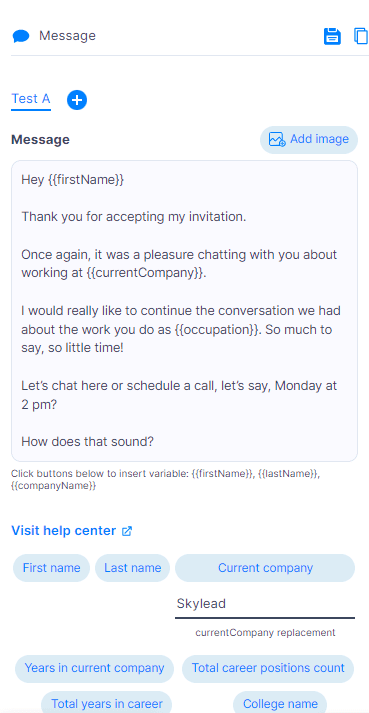
If you wish to further personalize inMails, emails, and LinkedIn messages, you can do so with Skylead’s native Image and GIF hyper-personalization feature.
To access it, click the ‘’Add image’’ button above the message editor.
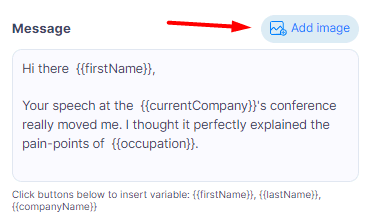
Then, you’ll be taken to a library of templates. Hit the ''Create new template''.

Next, upload the image you wish to edit.
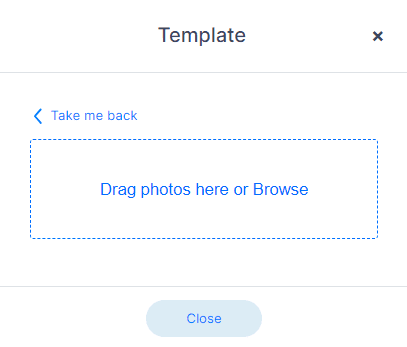
After choosing an image, click ‘’Submit’’.
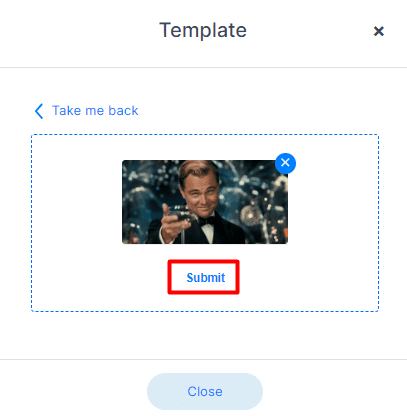
Then, a new window will open where you’ll have the option to add:
- Your profile picture (extracted from LinkedIn)
- Your lead’s profile picture
- A custom logo
- Your lead’s logo
- Text
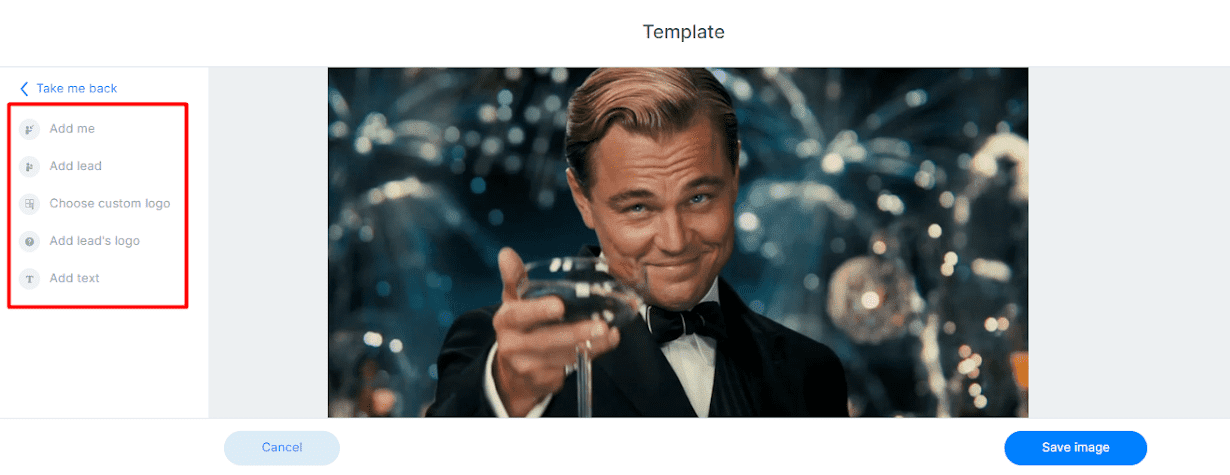
…and here’s what the final result can look like.

Of course, feel free to play around with the image editor as you see fit and create something that will keep those replies coming!
Once you are happy with the steps, your copy, and delays, you can save your sequence as a template to reuse at a later date.
Finally, click ‘’Start campaign,’’ and that’s it! Your outreach campaign has been successfully launched!
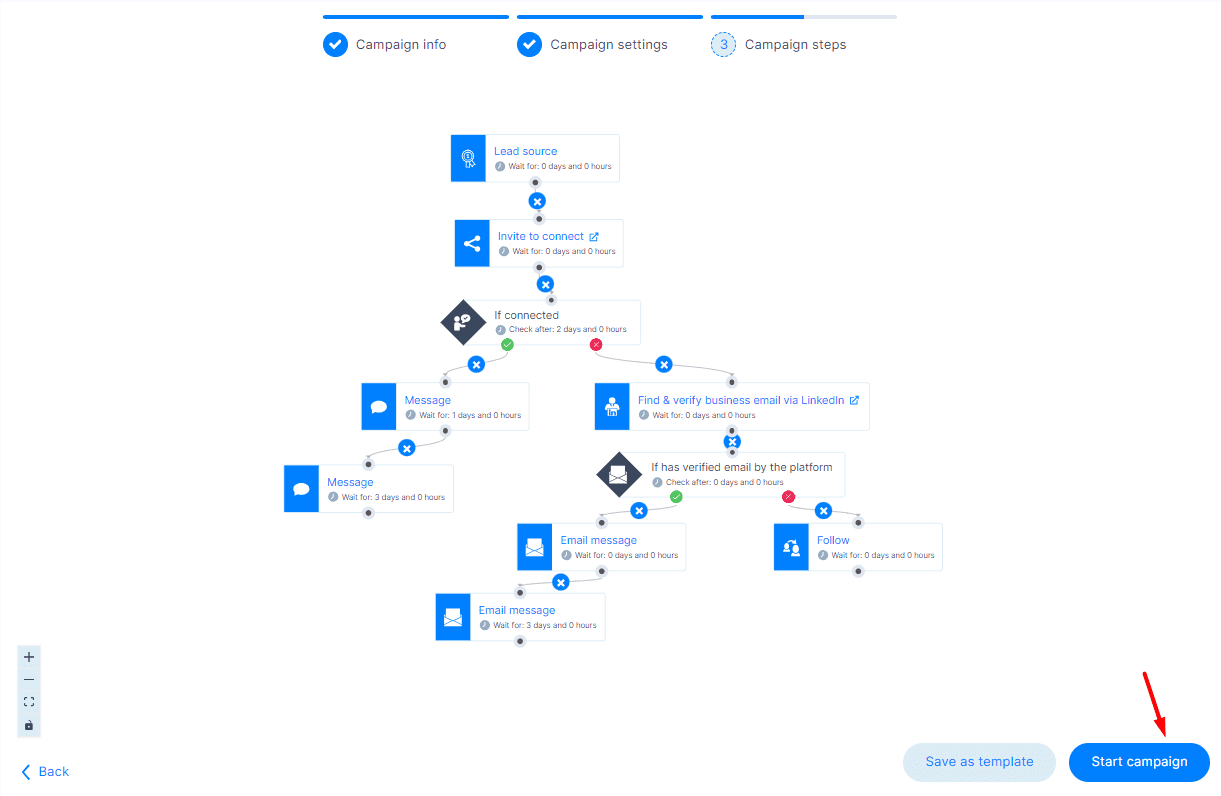
#5 Analyze and optimize your outreach campaign
The work doesn’t stop the moment you hit the ‘’Start campaign’’ button. In fact, after putting your outreach campaign in motion, it’s time to sit back and observe the results.
Luckily, Skylead has a nifty Reports page that lets you track performance in three different view modes:
- Graph
- Tabular
- Step-by-step
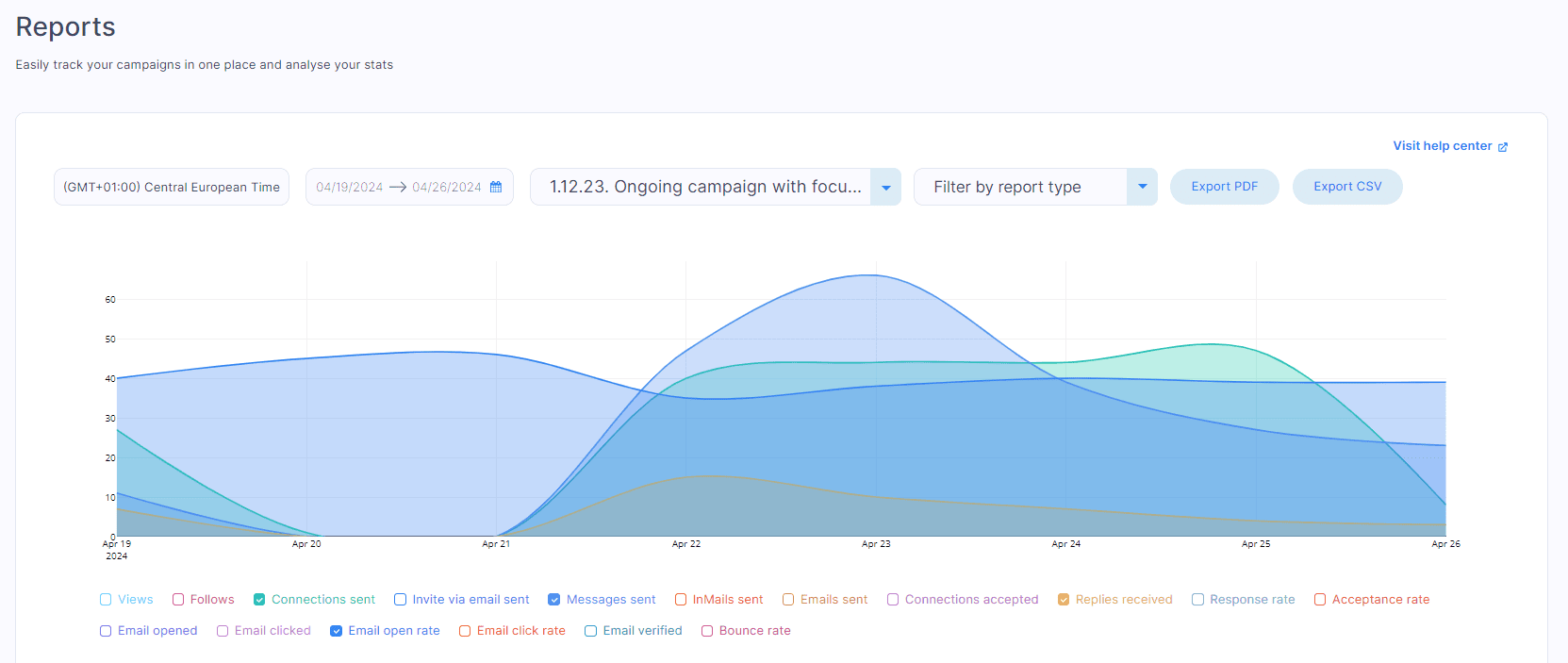

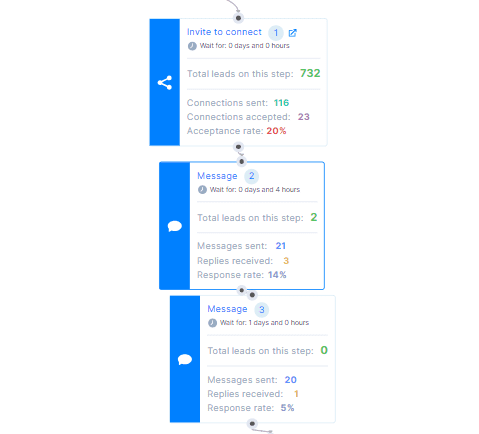
Here, you can monitor different metrics, such as your connection request acceptance rate, email open and click rates, response rate, and more.
The graph and table view differ from step-by-step campaign analysis in that they show daily fluctuations in metrics. As a result, they make it easy to spot patterns and trends. Once you’ve got a handle on these, you can fine-tune your ongoing campaign and make informed choices for the ones down the line.
On the flip side, a step-by-step breakdown really comes in handy when running A/B tests. The results produced by different variants are displayed side by side, making it simple to determine what messages work and should be used in your next campaign vs. those you should discard.
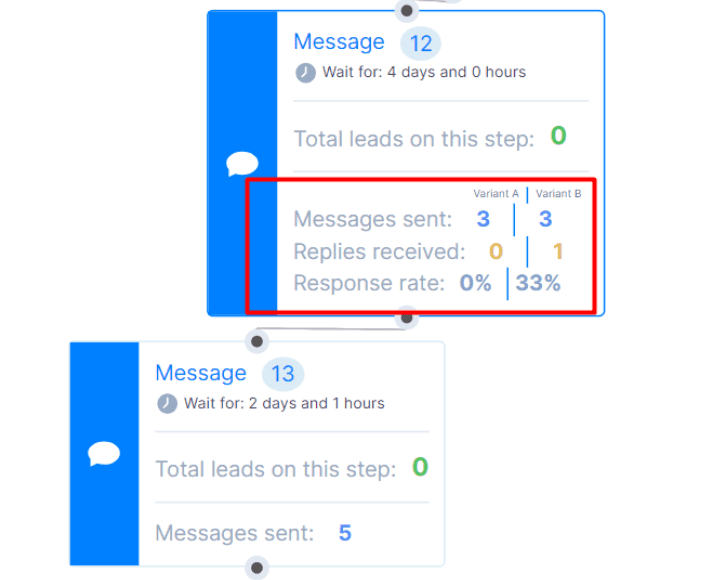
#6 Talk with your leads
Skylead automates the initial outreach. But remember, the goal is to spark conversations that you will take over. Once a lead responds, the sequence stops for them, and it’s your cue to jump in and build that relationship.
Luckily, Skylead makes it easy for you to manage these conversations! The software comes with a Smart inbox that consolidates all messages received via LinkedIn, Sales Navigator, Recruiter, and emails into one place.
Moreover, to keep things organized, you can label your chats based on their status or any criteria that suit your workflow. This can help you prioritize your responses and measure your conversion rates.
Additionally, Skylead allows you to leave notes on your chats. These can be reminders to follow up, points to mention in the next interaction...or any other information that can help you personalize and enhance the conversation.
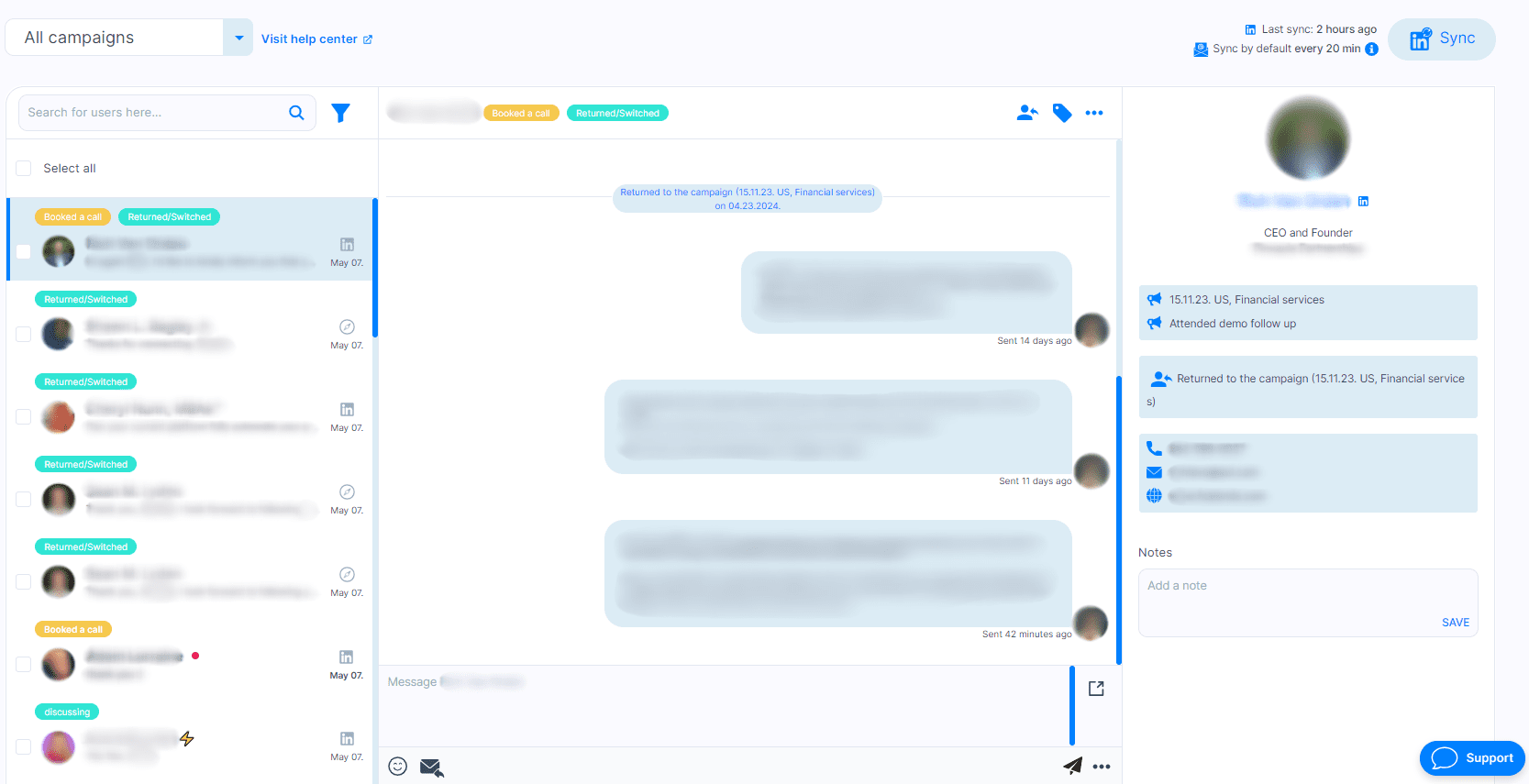
Tips for a successful outreach campaign
Now you know how to set up your outreach campaign and what to look out for. However, you have yet to learn how to make the most of your outreach.
Personalize your messages
People are more likely to respond to personalized outreach messages that feel relevant to them. So, take the time to customize your messages based on the information you have about your leads.
With Skylead, you can reach a whole new level of personalization in cold outreach. Use pre-defined variables, add custom ones if using a CSV file as a lead source, and don’t forget to take advantage of our image & GIF hyper-personalization feature. They can increase your response rate up to 63%!
Feeling uninspired? Head over to our blog to explore personalized image and GIF templates that improve response rate!
Follow up in due time
Don’t be discouraged if you don’t get a response right away. Sometimes, all it takes is a well-timed follow-up message. However, be mindful of the frequency of your follow-ups to avoid coming off as spammy. The golden rule is to wait between 2 and 5 days from the initial message. And if you aren’t sure how to write a follow up email after no response, we have a handy guide to help you out!
Outreach campaign examples and templates for each role
Remember how Skylead came with the premade templates for you to use? Here, we’re sharing some of the best-performing sequence and message templates applicable to each role and different situations.
Sequence for sales professionals
If you want to target someone in an alternative way, why not use a viral LinkedIn post that your target audience has commented on?
In that case, you can use this template to reach out to leads who have engaged with it.
We tested it out, and our results were:
- 76% acceptance rate
- 35% reply rate
- 85% open rate
Furthermore, you’ll find every step comes with a corresponding message that you can tweak as you like.
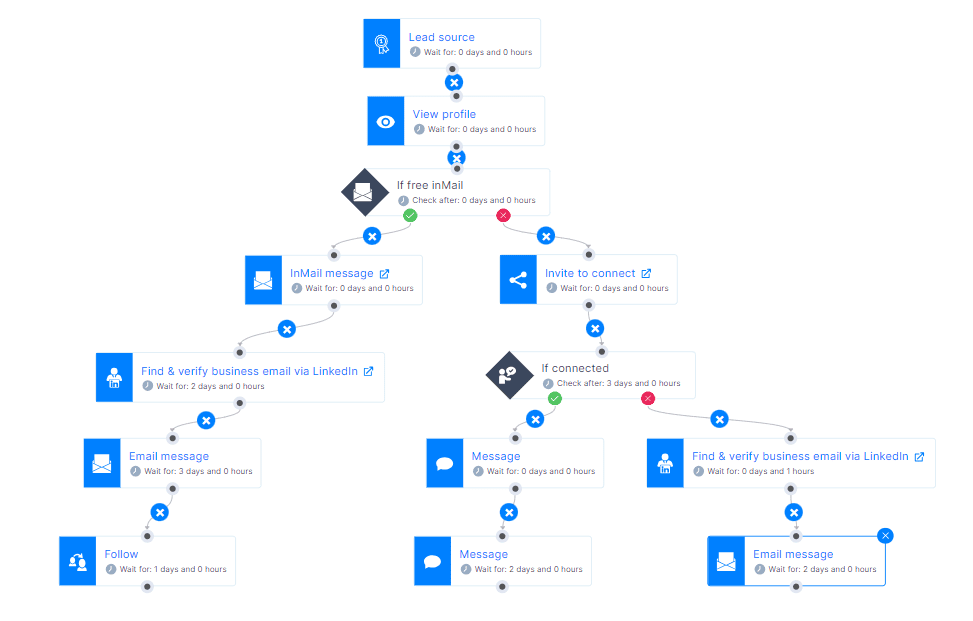
Outreach campaign template for marketers
Feel like targeting your website visitors? You might like this sequence template, which aims to do precisely that! However, feel free to use the message templates that come with it, as well!
For this one, we had a whopping:
- 43% acceptance rate
- 23% reply rate
- 71% open rate
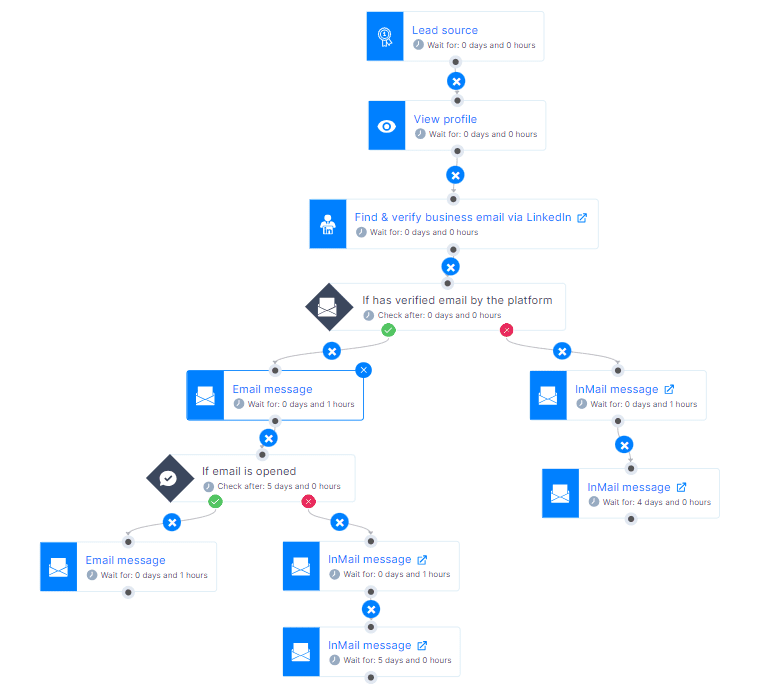
Template for company founders and agency owners
Check out this template specifically designed for reaching out to B2B founders.
We’ve run the numbers and found that, with it, our acceptance rate was 44%, reply rate 29%, and open rate 82%!
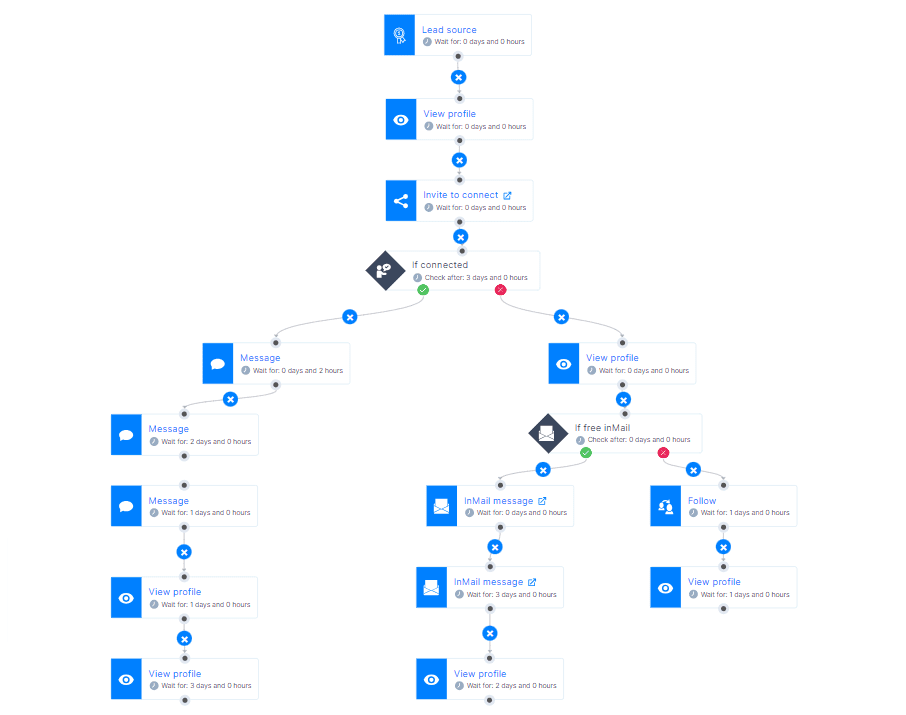
LinkedIn outreach template for recruiters
For example, let’s say you wish to reach out to your perfect candidate for the job in your company. In that case, your LinkedIn connection request can sound like this:
Hey {{firstName}},
My name is {{yourName}}, and we’re currently seeking a {{Occupation}}, and I truly believe that this role offers you a platform to leverage your skills and make a significant impact at our company.
I’d be happy to share more details about the role and benefits we offer.
Choose to use it, and you might see results similar to ours, which were:
- Acceptance rate 79%
- Reply rate 46%
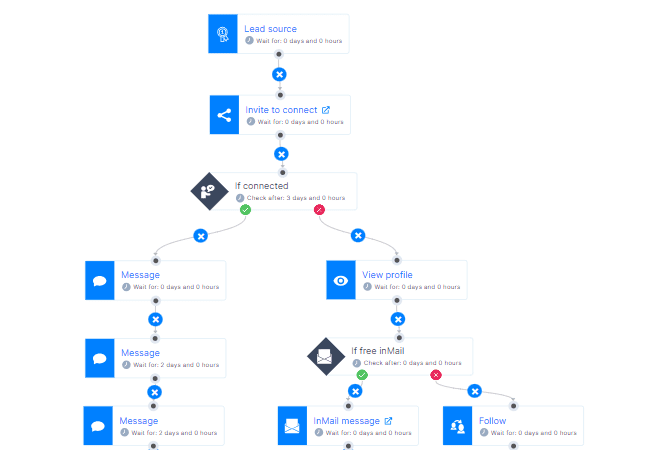
Frequently asked questions (FAQs)
1. What metrics or KPIs are most important to track the success of an outreach campaign?
Key metrics to focus on include response rate, conversion rate, and ROI. These indicators help gauge engagement, effectiveness in converting prospects, and the overall financial efficiency of the campaign.
2. How do you conduct an outreach campaign?
To conduct an outreach campaign, define your target audience and choose the appropriate channels. Create a structured plan, personalize messages, and use automation for efficiency. Monitor important metrics to adjust strategies and follow up regularly to maintain engagement and improve response rates.
3. How can you segment the audience for different types of outreach campaigns?
For successful segmentation, you must understand and divide your audience based on factors like industry, job role, company size, and past interactions. This will ensure your messages resonate more effectively with each segment and will reflect positively on response rates and campaign relevance.
4. What are the common challenges or pitfalls in managing automated outreach campaigns, and how can they be avoided?
Common challenges include impersonal communication and message fatigue among recipients. To avoid these, make sure email and LinkedIn automation tools of your choice mimic human interaction patterns, use varied content, and regularly update messaging strategies to maintain personalization.
Ready to splash into outreach waters?
As our guide comes to an end, it marks the beginning of your cold outreach journey.
All it takes is that first outreach campaign to get you started, and it's just a couple of clicks away.
But remember, cold outreach isn't a one-and-done type of process. In other words, you can't just build your campaign, launch it, and be done with it. It's what comes after launch that actually matters.
So, in the aftermath of creating an outreach campaign, pay a close eye on the results it brings. But don't get discouraged if everything doesn't go as planned! Instead, observe the data, learn from it, and use it to improve your subsequent outreach efforts.
And you know what the best thing is? Skylead comes with a free 7-day trial period that you can use to test out the outreach waters. Create your account now, build that sequence, and watch as your outreach — and conversions — skyrocket!
Gone are the days of going through business cards, calling prospects left and right only to close a deal. Over the years, numerous sales outreach tools have emerged, all aimed at streamlining prospecting and lead generation.
Yet, because there are so many of them, today's sales reps are often at a crossroads, wondering which tool they would benefit the most from.
To help you choose, we've tested the top cold outreach solutions on the market and are sharing our two cents.
So, if you are looking for the perfect outreach software for sales, brace yourself—the ultimate breakdown of tools is coming!
Sales outreach tools overview
| Sales outreach tool 📨🗣️💻 | Best for 🥇 | Rating 🌟 | Link 🔗 |
| Skylead | Smart, hyper-personalized multichannel outreach | Capterra: 4.8 (17) | Read more... |
| Expandi | Automated LinkedIn profile engagement | Capterra: 4.4 (31) | Read more... |
| Zopto | Automating likes & greetings on LinkedIn | Capterra: 4.4 (65) | Read more... |
| Lemlist | Ensuring email deliverability | Capterra: 4.6 (375) | Read more... |
| Reply | Semi-automated multichannel outreach | Capterra: 4.6 (96) | Read more... |
| Snov.io | Email enrichment | Capterra: 4.6 (207) | Read more... |
| Closely | Campaign tracking | Capterra: 4.5 (148) | Read more... |
| Waalaxy | Beginners to multichannel outreach | Capterra: 4.5 (247) | Read more... |
| Instantly | Straightforward email outreach | G2: 4.9 (2,066) | Read more... |
| HubSpot Sales Hub | Building personalized email sequences | Capterra: 4.6 (452) | Read more... |
| Dripify | Its ability to integrate with various software | Capterra: 4.7 (230) | Read more... |
| SalesLoft | Building and managing pipelines | Capterra: 4.4 (213) | Read more... |
| Yesware | Gmail & Outlook outreach | Capterra: 4.3 (175) | Read more... |
| Hunter | Finding and verifying professional emails | Capterra: 4.6 (614) | Read more... |
| Mailshake | Setting up simple drip campaigns | Capterra: 4.7 (108) | Read more... |
| SalesBlink | AI-powered email outreach | Capterra: 4.7 (131) | Read more... |
| Saleshandy | A-Z testing | Capterra: 4.5 (125) | Read more... |
| Woodpecker | Coming up with email copy quickly | Capterra: 4.5 (32) | Read more... |
| Wiza | Extracting lead information from LinkedIn, Sales Navigator & Recruiter | Capterra: 4.6 (20) | Read more... |
| GrowMeOrganic | Automating hyper-personalized follow-ups | Capterra: 4.2 (10) | Read more... |
| Lusha | Prospecting around the Web | Capterra: 4.1 (360) | Read more... |
| MeetAlfred | X (Twitter) outreach | Capterra: 2.8 (13) | Read more... |
| LeadConnect | Following up on LinkedIn | Capterra: 4.4 (98) | Read more... |
| Evaboot | Scraping leads from Sales Navigator | Capterra: 4.9 (13) | Read more... |
| Dux-Soup | Sending free and paid inMails | Capterra: 4.0 (14) | Read more... |
| Salesloop | Expanding your LinkedIn network on autopilot | G2: 3.5 (3) | Read more... |
What are sales outreach tools?
Sales outreach tools are software or platforms designed to facilitate and streamline the sales outreach process. These tools automate repetitive tasks, such as sending connection requests on LinkedIn and follow-up emails, leaving you with more time to focus on researching and nurturing your leads to conversion.
To clarify, with sales outreach tools, sales teams can:
- Get to more prospects faster,
- Maximize touchpoints through multichannel outreach,
- Personalize communication,
- Segment prospects according to their stage in the sales funnel,
- and close more deals.
Types and subtypes of sales outreach tools
Generally speaking, sales outreach software can be:
- Cloud-based, existing entirely on the Web and running without reliance on Internet connectivity or power. Such software allows you to manage multiple LinkedIn accounts and/or email accounts and conversations, as it typically comes with an integrated inbox. This is also the safest type of outreach tool for sales. Namely, cloud-based tools assign their users a dedicated IP address to shield their online activity. Additionally, they frequently mimic human behavior and randomize the delay between different outreach activities. As a result, they are hard to detect and thus work to keep your LinkedIn or, say, email account restriction-free.
- Chrome extensions. They lack a dedicated IP address and require your browser to be on to function. Moreover, these extensions, if used for LinkedIn prospecting or outreach, automatically inject code into the platform. In doing so, they make it apparent that you're using automation, which could lead to getting your LinkedIn account restricted.
- Desktop apps require downloading and can only operate while your computer is on. They don't offer dedicated IP addresses, support multiple accounts, or run in the background. However, they are generally safer than extensions because they don't inject code into LinkedIn.
Depending on the type of outreach they are used for, we also have:
| 1. LinkedIn automation tools. They help users automate tasks on LinkedIn, such as sending connection requests, messages, and inMails. |
| 2. Cold email software, which enables users to send cold and follow-up emails to those they haven't previously interacted with. |
| 3. Multichannel outreach tools. These help salespeople organize and manage their outreach activities across multiple channels (e.g., email, LinkedIn), all on one platform. |
| 4. Cold calling software, used to facilitate the process of making cold calls to potential customers. |
Benefits of using outreach tools for sales
Why are sales teams increasingly turning to outreach tools? Because of the evident benefits of doing so. For example, McKinnsey’s research confirms that about a third of all sales tasks can and should be automated.
And we agree, but here are other benefits we’ve discovered using sales outreach tools.
Firstly, there's the increased productivity. With an outreach aid that automates manual tasks, sales reps can shift focus to high-value activities like nurturing leads.
Secondly, sales outreach software can often integrate with various platforms. As a result, you get a centralized hub for all sales activities. This reduces the time spent switching between tools and streamlines the entire sales process—from prospecting to conversion.
Lastly, we cannot discuss the benefits of using a sales outreach solution without mentioning scalability. With features like A/B testing, sales teams can optimize their outreach strategies based on data-driven insights. This leads to improved results, as teams can quickly identify what works best and scale with their winning approach accordingly. As a result, you get an influx of leads and customers, all without a drop in performance.
26 Best sales outreach tools
You're sold on using sales outreach tools but aren't sure which one(s) to choose. We've spent extensive time testing top-tier software, so you don't have to! Now, let's review our top picks to bring you closer to the answer!
#1 Skylead - Best overall sales outreach tool for smart, hyper-personalized multichannel outreach
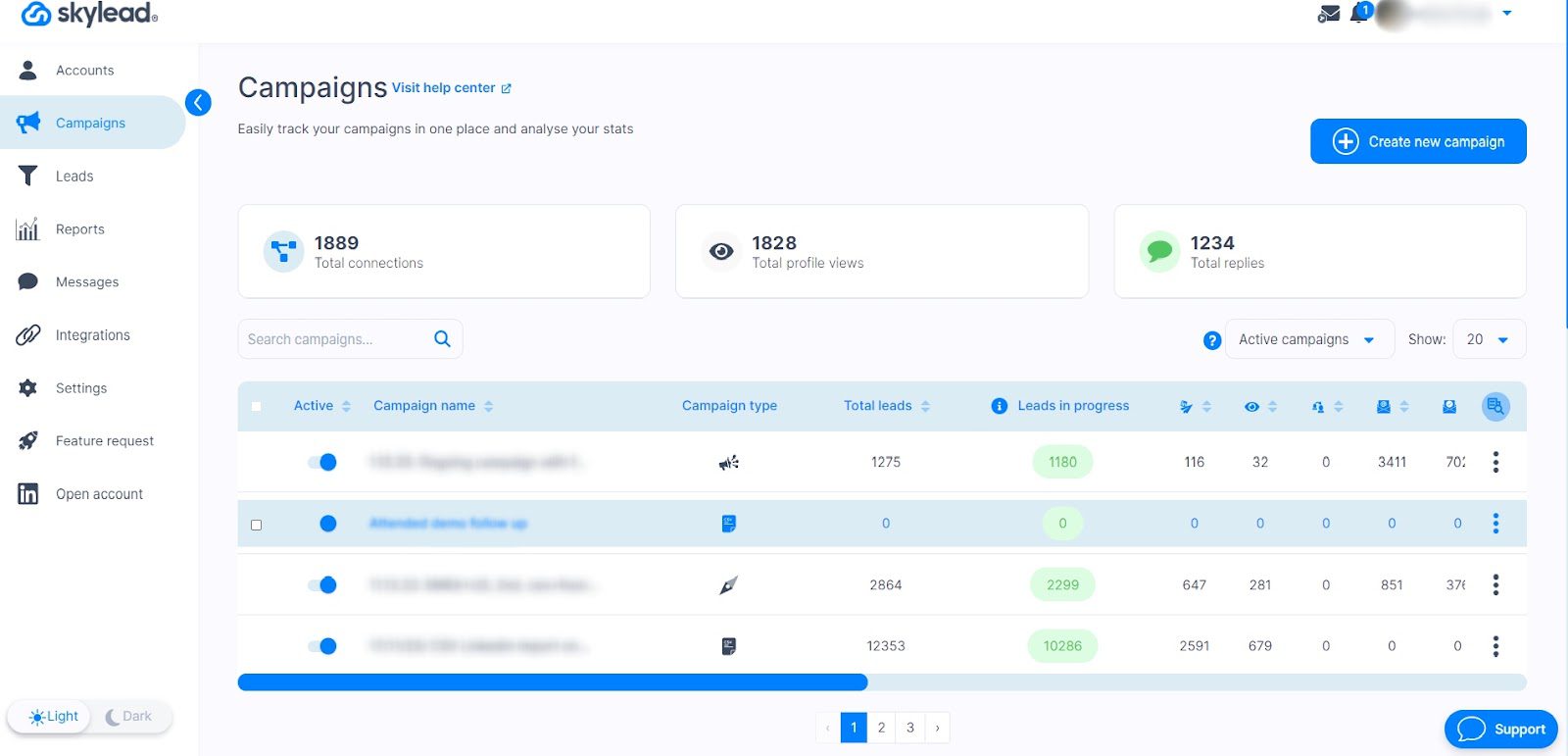
That’s us! Hi! 🙂
Skylead is a cloud-based LinkedIn automation tool and cold email software, the first on the market to introduce smart sequences. It's the outreach software for sales teams looking to book 3x more meetings and save +11 hours weekly on manual work.
Pros
Skylead is an all-in-one sales outreach tool, meaning it has everything a salesperson might need — in one place! That said, it comes with solutions for:
- LinkedIn automation
- Unlimited email automation
- Email discovery & verification
- Image & GIF personalization
Its highlight feature is smart sequences, a revolutionary algorithm that allows you to take full advantage of multichannel outreach. With smart sequences, you can combine LinkedIn and email outreach actions and if/else conditions. The sequence unfolds based on the prospect's behavior, adapting as it goes to find the fastest path to them.
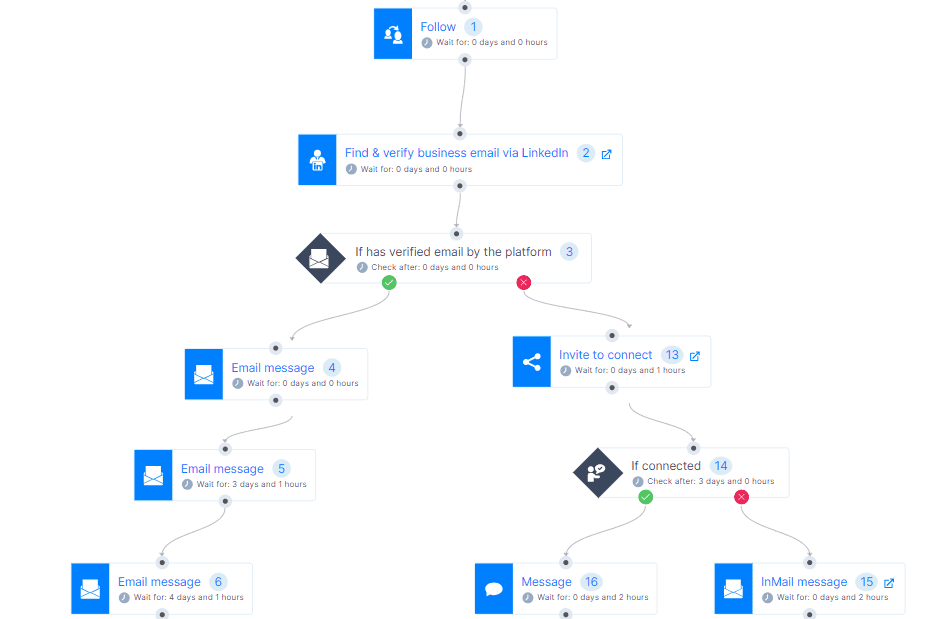
Speaking of email outreach, Skylead lets you connect unlimited email accounts at no extra cost. Moreover, the software supports inbox rotation, which means that you can send tens of thousands of emails per month with it.
Skylead also consolidates all your communications into one smart inbox, allowing you to manage LinkedIn messages, inMails, and emails seamlessly. Furthermore, it lets you organize chats with labels to keep track of conversions and measure ROI.
The software also stands out due to its native image & GIF personalization feature and variables for personalizing messages. We've run the numbers, and as it turns out, these two combined have increased our response rate by 63%!
Skylead can pull prospects from LinkedIn Premium, Sales Navigator, and Recruiter accounts, making LinkedIn lead generation a breeze.
In addition, this outreach solution lets sales reps in on in-depth analytics and allows for A/B testing different email subject lines and messages. Thanks to these, you'll surely find something that strikes a chord with your target audience!
Finally, if you want to push lead or campaign data to your CRM, you can! Skylead integrates with any software via webhooks or API.
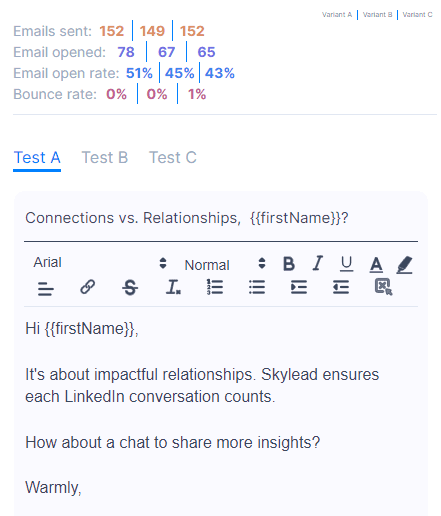
How safe is Skylead?
Very! In fact, one of the greatest things about Skylead, in our opinion, is its 3-layer protection. The software protects its users from experiencing LinkedIn account restrictions by:
- Being human-like,
- Randomizing delays between actions,
- Assigning a dedicated IP address.
Skylead also comes with a handy email discovery & verification feature that ensures deliverability, thus reducing bounce rates. Using it, you don't have to worry about the safety of your domain! Skylead will provide you only with a list of double-verified email addresses that actually exist. Not to mention, it boasts one of the highest, if not the highest, email finder probability rates compared to other sales outreach tools on the market.
Cons
It's not that it's ours, but we truly haven't found any "real" cons to using Skylead. Why, yes, Skylead doesn’t have a video customization feature. Nonetheless, our users can use Sendspark's AI-powered Dynamic Video Functionality to personalize videos on top of images. Moreover, all Skylead users can get 50% off their first month with Sendspark. Just create your account on their platform and use the promo code ''SKYLEAD50'' to claim the offer.
Also, at the moment, there isn't an option to build a campaign from LinkedIn group members. Nevertheless, you can always use a workaround to target these individuals, and it involves LinkedIn Sales Navigator filters. Just select the desired group from the filters, copy the search result URL, and paste it into Skylead. Et voilà!
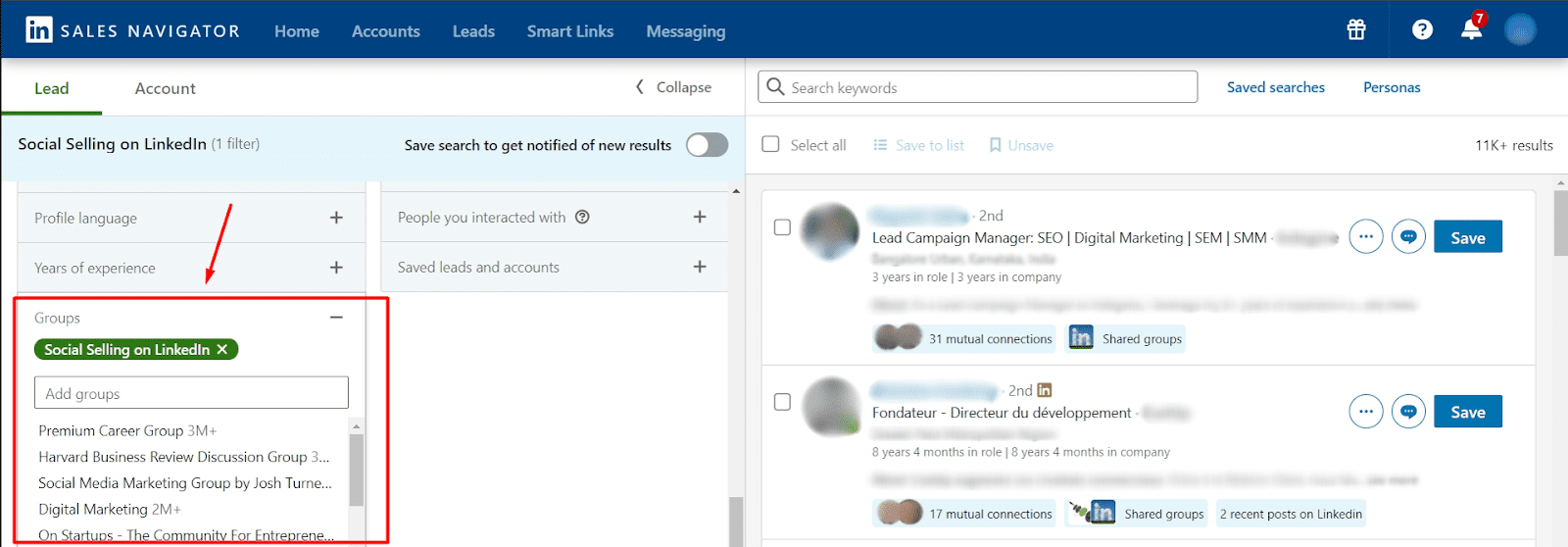
What others said about Skylead
Allen F. shares our enthusiasm for the platform and mentions how Skylead revolutionizes your campaigns! He is particularly fond of the library of campaign templates that are easy to tweak. He even says you can have your first campaign running in about 15 minutes!
Alex S. has also had nothing but good things to say about Skylead. He even went so far as to say that this product has literally changed the way he works! He praises the interface and notes how building detailed LinkedIn sequences with the tool is incredibly easy.
Pricing
Skylead offers an all-in-one solution priced at $100 per seat a month. However, if you’re interested in white-labeling the software, contact the sales team for pricing details.
Rating
#2 Expandi - Best for automated LinkedIn profile engagement
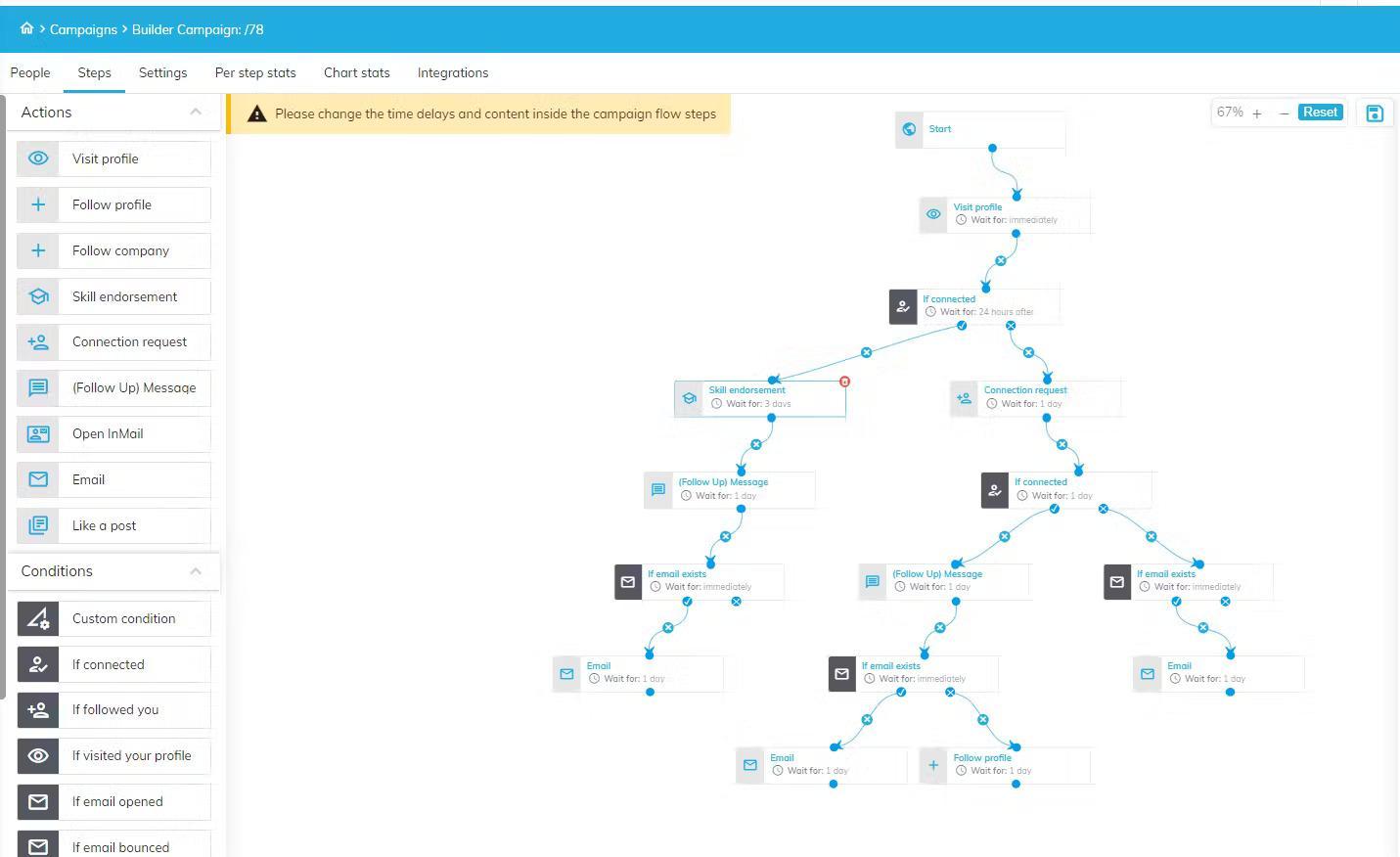
Expandi is another cloud-based sales outreach platform designed for LinkedIn and email automation.
Pros
We discovered that, much like Skylead, Expandi comes equipped with smart sequences. These allow for multichannel outreach and support additional LinkedIn actions that engage users’ profiles, such as auto-post likes and auto-endorsements.
Expandi automates sending personalized LinkedIn messages, emails, and free inMails. Compared to Skylead, the tool allows for the creation of campaigns from LinkedIn group members. There are also a variety of templates to choose from, many of which can be extremely useful.
Cons
While playing around with Expandi, we noticed that it lacks a native image and GIF personalization feature. Although we were able to personalize images thanks to their integration with Hyperise, we had to pay extra for it.
The software also doesn't support sending paid inMails, making it somewhat limited, in our opinion.
Finally, the tool cannot discover and verify email addresses unless publicly available on someone's LinkedIn profile. This makes it an incomplete tool for seamless email outreach.
What others said about Expandi
Overall, the reviews are somewhat similar to our conclusions. For example, Adi R. notes that Expandi is easy to use, intuitive, and good for automating tasks. However, he isn't overly happy about having to perform certain tasks manually since the tool doesn't handle them.
Pricing
- Business: $99/mo per seat + $69/mo per seat for image & GIF personalization (via Hyperise)
- Agency: Custom
Rating
- Capterra: 4.4 (31)
#3 Zopto - Best for automating likes & greetings on LinkedIn
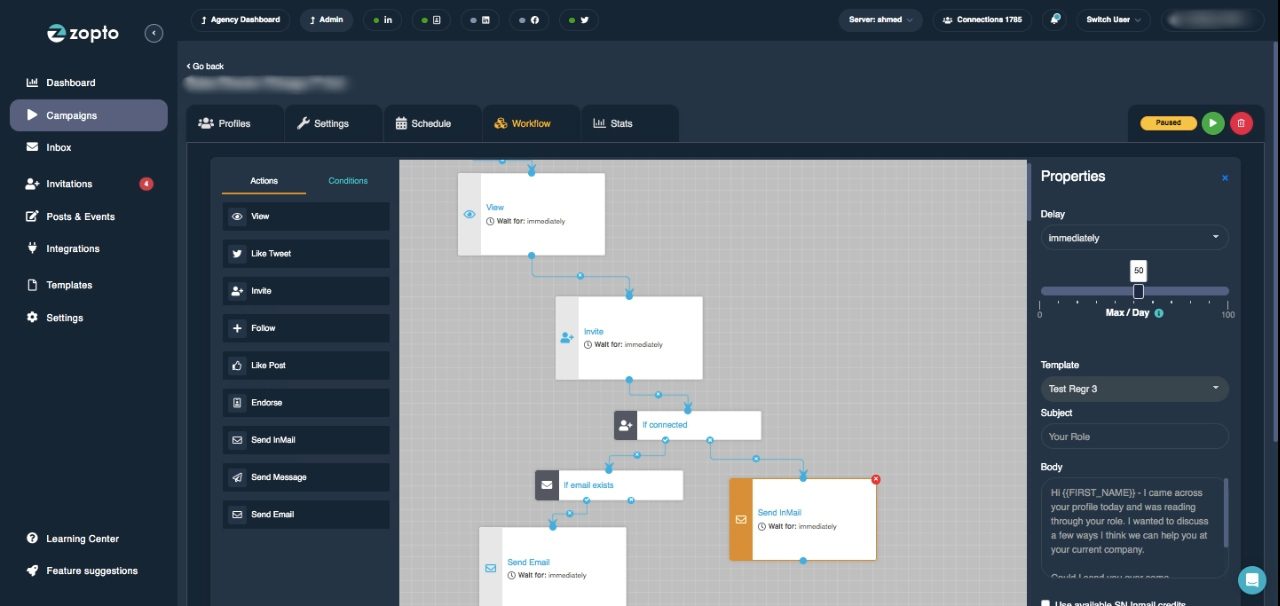
Zopto falls into the category of cloud-based multichannel sales outreach tools.
Pros
Zopto has a smart sequences feature, which is fairly new to the market. We tested it out and noticed that we can form outreach flows from different LinkedIn and email actions and conditions.
Speaking of LinkedIn actions, in addition to automating standard ones (e.g., View profile, Follow, Invite to connect, etc.), the tool can also automate likes, endorsements, and even greetings (birthdays, anniversaries, job changes).
Cons
Despite its email enrichment capabilities, Zopto is limited to discovering 5,000 contacts a month, as compared to Skylead, which has an unlimited email discovery feature. Additionally, the latter has a higher success rate in finding verified emails.
Furthermore, while we were successful in adding LinkedIn inMails to our campaigns, we were saddened to find that Zopto only supports sending free inMails.
One of Zopto's main selling points is Zhoo, its AI assistant. Yes, it sounds innovative, but it's essentially just a ChatGPT 4 integration used for generating emails and messages. We found it more cost-effective to use a different sales outreach tool and simply pay for a ChatGPT Plus subscription.
But do you truly need one? It depends. Our sales team has compared GPT-generated sales copy against our own and saw better results with the latter. However, we're not opposed to using ChatGPT for sales—it can be quite helpful, especially when the inspiration is lacking.
As Zopto’s final con, when we wanted to analyze our campaign results, we found no option to export a report.
What others said about Zopto
Eldar L. mentions that Zopto makes creating and running several campaigns at a time easy. Nevertheless, he finds it inconvenient that the tool lacks detailed analytics. And he’s right. We noticed statistics are only presented as pie charts, which, frankly, don't offer much clarity on the campaign's performance.
Pricing
- Basic: $197/mo per seat
- Pro: $297/mo per seat
- Agency & Enterprise Basic: Starting at $156/mo per seat (minimum 2 users)
- Agency & Enterprise Pro: Starting at $237/mo per seat (minimum 2 users)
Rating
- Capterra: 4.4 (65)
#4 Lemlist - Best for ensuring email deliverability
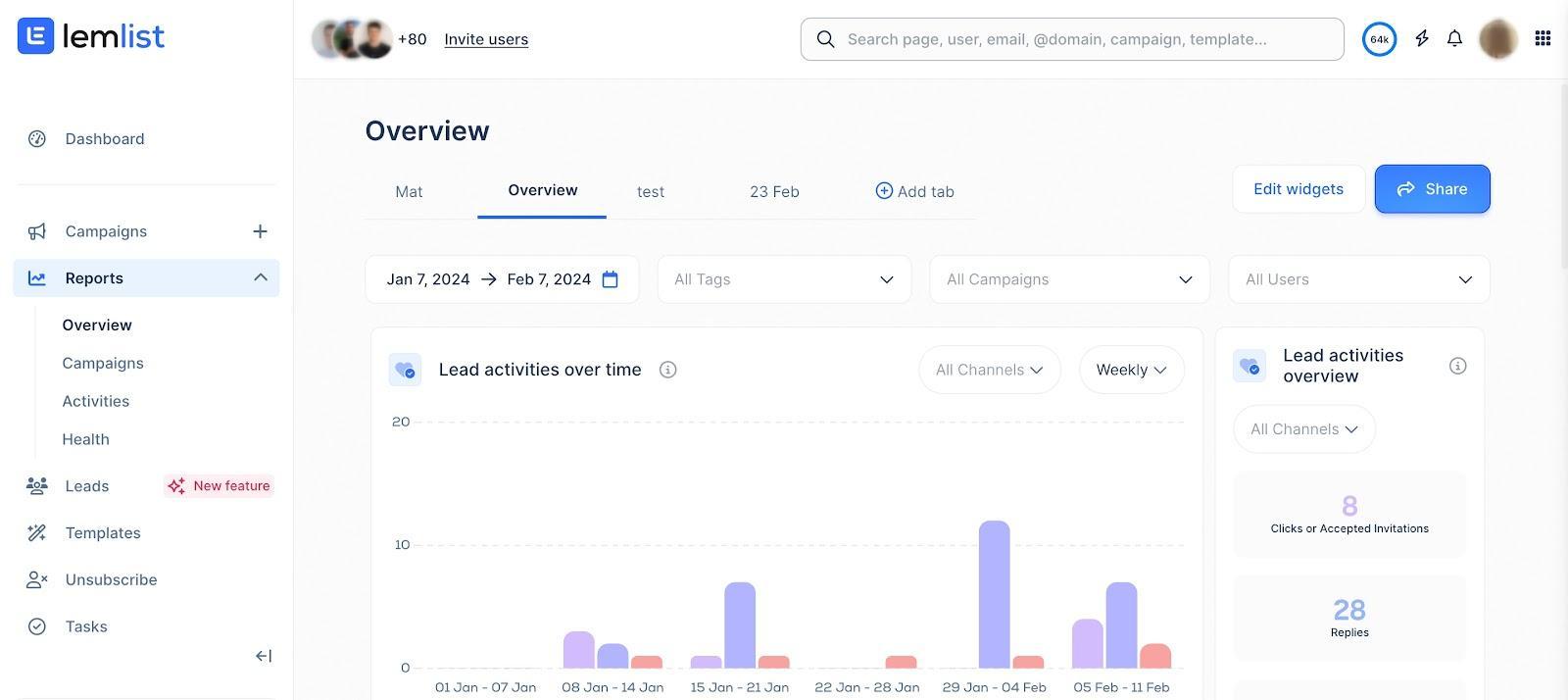
Lemlist is a cloud-based email outreach tool. However, when we tested it, we noticed that it has a Chrome extension for LinkedIn prospecting and outreach.
Pros
Lemlist is primarily an email outreach tool that sales teams can use to set up unlimited email campaigns. It also supports multichannel campaign creation, making it possible to incorporate LinkedIn actions and calls (through AirCall integration) into your outreach flow.
This tool allows for advanced personalization thanks to custom intro lines, images, and engaging landing pages.
Lemlist also has Lemwarm, a warm-up and deliverability booster designed to prevent your emails from ending up in spam.
Cons
We don't like how Lemlist uses a Chrome extension to scrape information from LinkedIn. Chrome extensions inject code into LinkedIn that this platform can easily detect and penalize you for. Therefore, it compromises the safety of your LinkedIn account.
Also, Lemlist can indeed find and verify leads’ email addresses. However, it’s worth noting that the highest plan includes only 1,000 credits. If your requirements exceed this limit, you’ll need to pay extra to have the tool find and verify additional emails.
The last thing we didn’t like is that we needed to pay per email account, compared to Skylead, which supports adding unlimited email accounts at no extra charge. With it, you just need to pay per LinkedIn account.
What others said about Lemlist
Darpan C. thinks Lemlist is a complete email outreach tool. He loves the interface, variables, and A/B testing capabilities. Nonetheless, he believes analytics could be more extensive.
Pricing
- Email Starter: $39/mo per 1 email account
- Email Pro: $69/mo per 3 email accounts
- Multichannel Expert: $99/mo per 5 email accounts
- Outreach Scale: $159/mo per 15 email accounts
Rating
- Capterra: 4.6 (375)
#5 Reply - Best sales software for semi-automated multichannel outreach
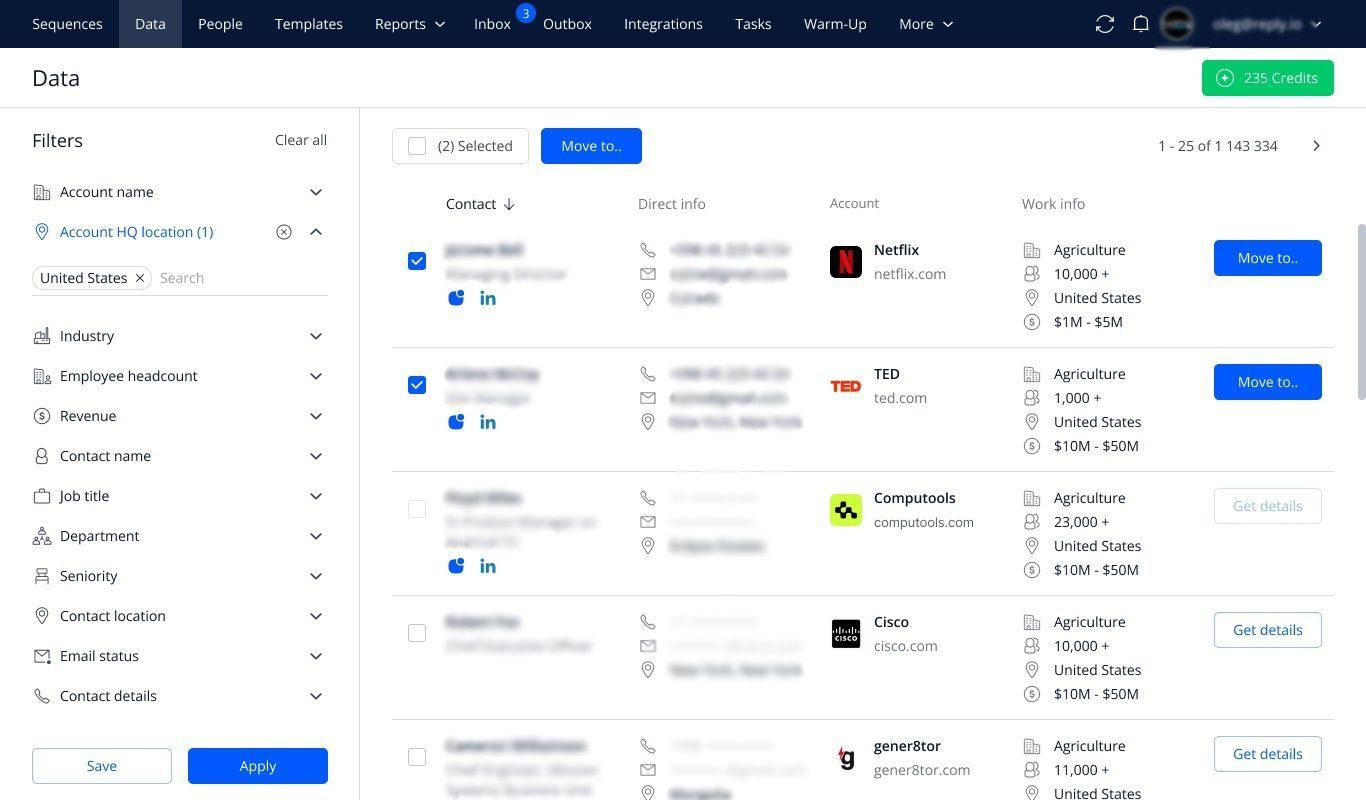
Reply is a multichannel, cloud-based outreach software. Nonetheless, it also has a Chrome extension for finding and verifying emails and outreach automation.
Pros
We’ve discovered that Reply can handle tasks across multiple channels, both automated and semi-automated.
When it comes to automated actions, it can:
- Send emails
- Like recent posts (LinkedIn)
Meanwhile, actions like:
- Profile views,
- Connection requests,
- LinkedIn messages,
- And inMails.
…can be both automated and semi-automated, depending on how you set them up.
Setting a campaign with Reply is straightforward: you decide on the steps, then add your prospects. However, keep in mind that these are simple campaigns without any conditions, unlike the smart sequences you’d find with Skylead.
It's also worth mentioning that Reply supports A/B testing for email copy and offers pre-made email and sequence templates, like Skylead. Alternatively, you can create simple sequences from scratch or have Reply’s Jason AI generate them for you. Reply also lets you track your campaign performance step-by-step.
The tool supports integrations via Zapier but natively integrates with Pipedrive and HubSpot.
Cons
Reply’s smart inbox allows users to manage their emails efficiently. However, it doesn't support the management of messages received from other platforms like Skylead does.
At the beginning, we mentioned that Reply has a Chrome extension for finding and verifying email addresses. While this may seem like a pro, it's not particularly useful, especially when enriching emails via LinkedIn. As already said, Chrome extensions inject code into LinkedIn, which the platform can detect, making them unsafe to use.
What others said about Reply
Terry L. loves Reply's multi-step campaign builder that can automate the email-sending process and semi-automate LinkedIn actions. Although the platform was buggy initially, he admits the team quickly resolved issues.
However, Terry wasn’t the only one to report issues with the platform. Multiple users had the same complaints. Some have even said that the support team isn’t equipped to handle them.
Pricing
- Free
- Starter: $59/mo per user / 1 mailbox
- Professional: $99/mo per user / 5 mailboxes
- Ultimate: $139/mo per user / 15 mailboxes
- Reply Unlimited: Contact sales
Rating
- Capterra: 4.6 (96)
#6 Snov.io - Best for email enrichment
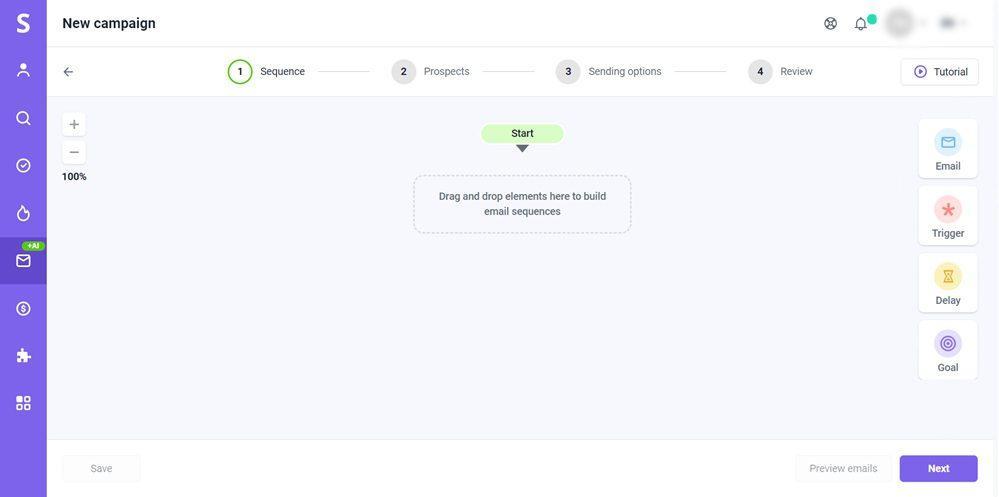
Snov.io is a cloud-based email outreach tool. However, it comes with two Chrome extensions: a LinkedIn prospect finder and an online email finder.
Pros
While testing Snov.io, we've concluded that its email finder and verifier produces fairly accurate data.
Snov.io also eliminates the need for email warm-up tools. Namely, the tool has an email warm-up feature, like Lemlist, which automatically initiates realistic email conversations on your behalf. Furthermore, it marks emails as important, reads them, and moves them from spam to inbox to enhance your sender’s reputation.
We also liked that drip campaigns are easy to set up, and you can play around with different variables and email templates while doing so. Like Skylead, the software lets you connect as many email accounts as you want and supports mailbox rotation.
Snov.io also has a built-in CRM, which saves you money by eliminating the need to pay for additional software.
Cons
Since the tool uses a Chrome extension to find prospects on LinkedIn, it isn't the safest to use.
Furthermore, we couldn't get the most out of our outreach with it simply because we were limited to emails only.
Alas, if you're looking to discover a large number of emails or contact many leads, this tool might not be the best fit. Their top-tier subscription offers 100,000 email finder credits and lets you reach out to 100,000 recipients. However, we found it overly expensive — especially when compared to Skylead, which allows for unlimited email discovery and sending at a cost 5x lower.
What others said about Snov.io
Yevhen B. praises Snov.io’s drip campaigns and the ability to track open, click, and reply rates. Nonetheless, he says that the interface can overwhelm new users and that the email enrichment process can be slow.
Pricing
- Trial: $0
- Starter: $30/mo per seat
- Pro: $75 / $142 / $277 / $554/mo per seat
- Managed Service: Starting at $3,999/mo per seat
Rating
- Capterra: 4.6 (207)
#7 Closely - Best sales outreach tool for campaign tracking
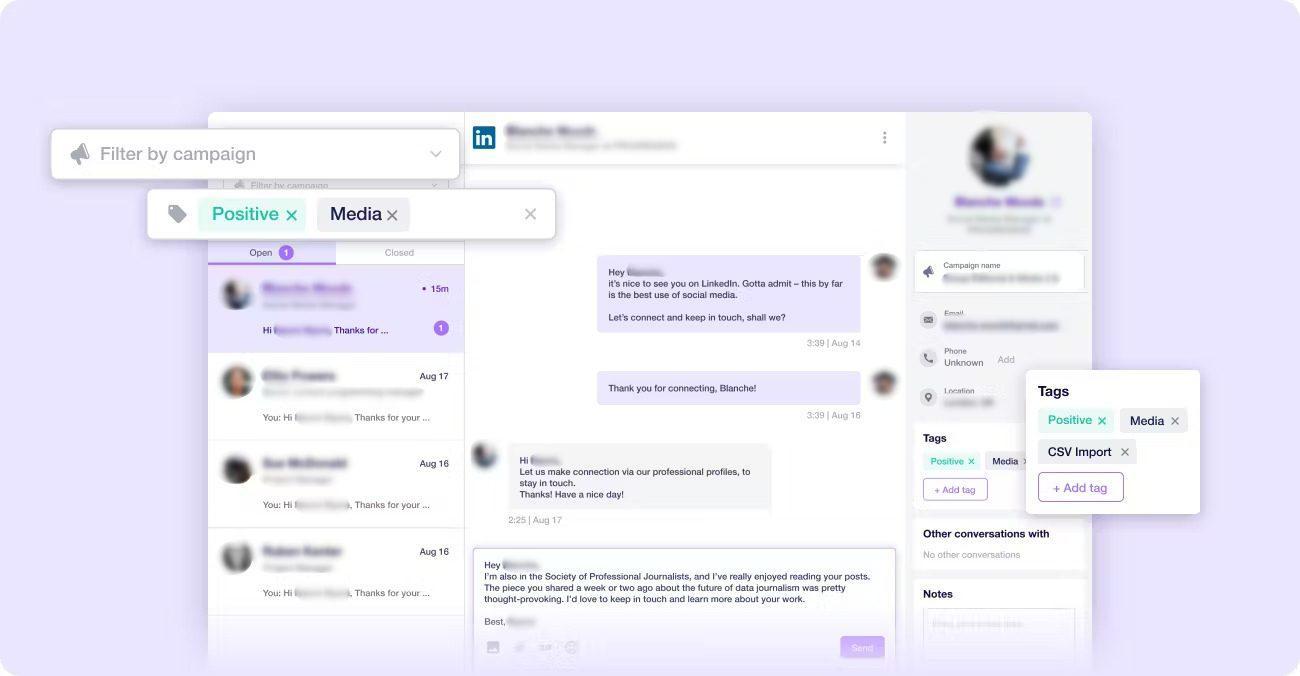
Closely is another cloud-based multichannel sales outreach tool with a Chrome extension for finding emails on LinkedIn and data scraping.
Pros
We liked its intuitive dashboard. From there, it’s easy to navigate to the multichannel campaign builder, where you can combine different LinkedIn actions and emails into a single campaign.
Closely makes campaign tracking effortless thanks to its streamlined stats page. It also makes it possible to export stats to a CSV file. In the meantime, if you wish to send the data to another software, you can do it via webhooks.
Cons
As opposed to Skylead, the lead source for email outreach campaigns can only be a CSV file with leads’ information. Speaking of CSV files, while the tool enables you to export statistics in this format, it does not support PDF exports like Skylead does.
Yes, the software can automate profile views, post likes, endorsements, connection requests, and messages on LinkedIn. Still, the crucial outreach component is missing: inMails.
We also noticed you can have no more than 2 multichannel campaigns running simultaneously. Plus, these campaigns, despite involving LinkedIn and email actions, don’t include smart sequences.
Lastly, since a Chrome extension is involved, the safety of your LinkedIn account can be compromised when using the tool.
What others said about Closely
Muhammad Abdullah A. believes Closely is easy to set up, like us. The only problem is he can’t use it to contact his 1st LinkedIn connections.
Pricing
- Personal: $99/mo per seat / 1 LinkedIn & 1 email account
- Growth: $219/mo per seat / 3 LinkedIn & 3 email accounts
- Pro: $339/mo per seat / 5 LinkedIn & 5 email accounts
- Custom: Contact sales
Rating
- Capterra: 4.5 (148)
#8 Waalaxy - Best tool for beginners to multichannel outreach
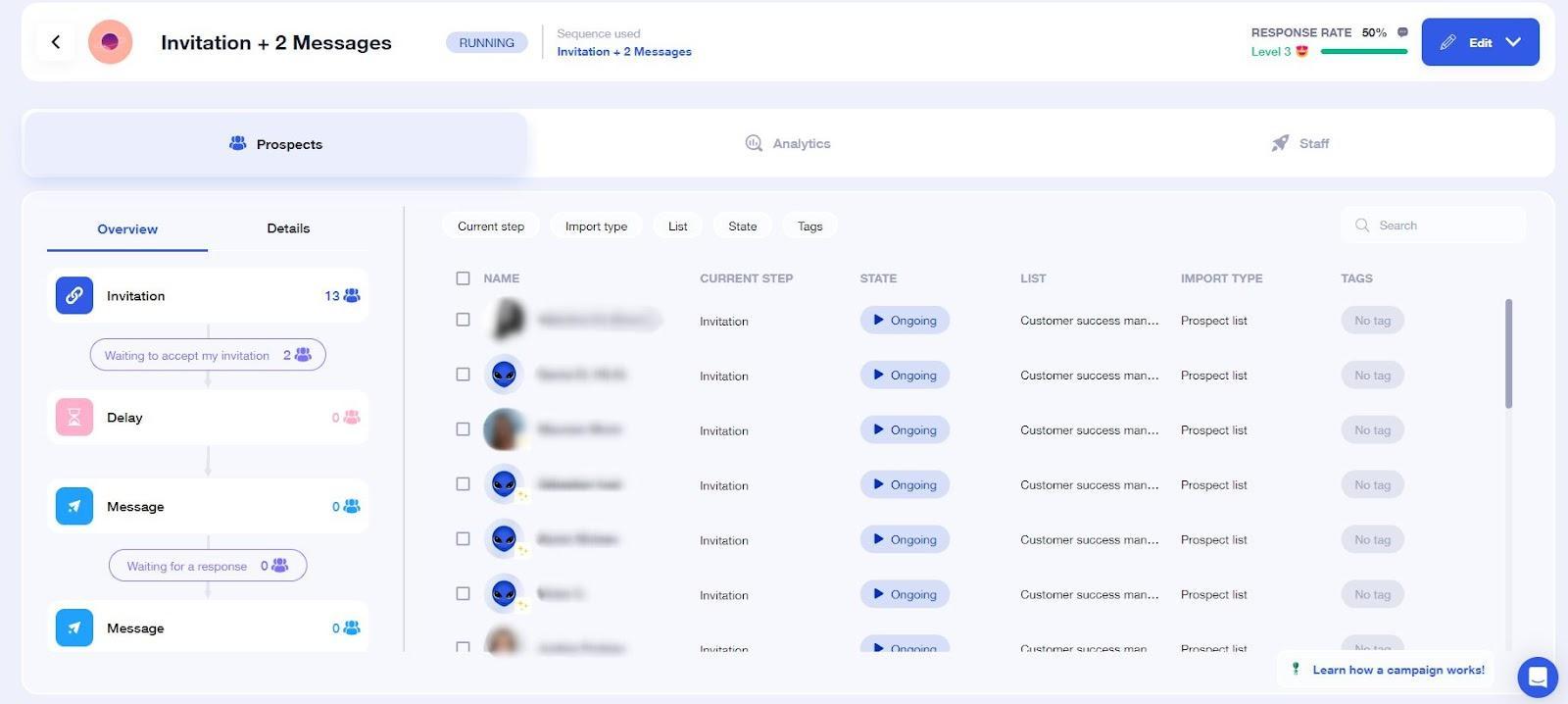
Waalaxy is a cloud-based software aimed at automating sales teams’ LinkedIn and email outreach.
Pros
Waalaxy is great for beginners to outreach who don’t have much technical knowledge. With it, you can create a multichannel campaign from a:
- LinkedIn search URL
- Sales Navigator search URL
- Recruiter search URL
- LinkedIn post URL
- Sales Navigator lead list
- CSV file
The tool also supports A/B testing and message personalization, courtesy of variables. Plus, it has customizable pre-filled message templates and an AI writing assistant.
Additionally, we found pushing leads from Waalaxy to a CRM using Zapier webhooks straightforward.
Cons
Unlike Skylead, which offers customizable sequence templates and the opportunity to create a sequence from scratch, Waalaxy limits users to a few pre-built options.
Waalaxy charges extra for the inbox, too, which makes it less cost-effective.
It also lacks a native email enrichment feature.
Finally, the free version of the tool uses a Chrome extension. Naturally, we don’t recommend using it if you want to keep your LinkedIn account restriction-free.
What others said about Waalaxy
Shekh Riazul I. swears Waalaxy's UI is extremely easy to use and navigate. Nonetheless, the software sometimes has a hard time detecting the account. He also frequently has to wait for the Dashboard to load.
Pricing
- Free
- Advanced: €112/mo per seat
- Business: €160/mo per seat
Rating
- Capterra: 4.6 (207)
#9 Instantly - Best for straightforward email outreach
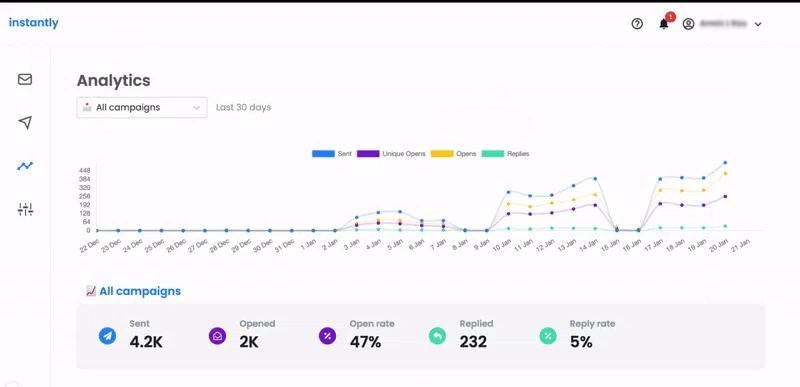
Instantly.ai is a cloud-based software for email outreach at scale.
Pros
Instantly allows you to connect unlimited email accounts and supports inbox rotation, like Skylead, which helps safeguard and protect your domain.
Moreover, Instantly features an unlimited email warm-up function to guarantee email deliverability. The tool also enables you to personalize your emails with variables and schedule them as needed.
We couldn’t help but notice how straightforward Instantly is. And if you aren’t interested in leveraging LinkedIn outreach, this might just be one of the best tools.
Cons
Instantly isn't designed for multichannel outreach.
Why, yes, the tool can verify email addresses. However, verification credits aren’t part of the subscription plan. As such, they incur an additional cost.
What others said about Instantly
James O. states that Instantly helped him increase his outreach at a low price compared to other sales tools. However, he thinks the software is a bit limited in terms of salesflow customization, and we agree.
Pricing
Sending & Warmup Plans
- Growth: $37/mo per seat
- Hypergrowth: $97/mo per seat
- Light Speed: $358/mo
Leads Plans
- Growth Leads: $47/mo per seat
- Supersonic Leads: $97/mo per seat
- Hyperleads: $197/mo per seat
- Light Speed: $492/mo per seat
Rating
- G2: 4.9 (2,066)
#10 HubSpot Sales Hub - Best for building personalized email sequences
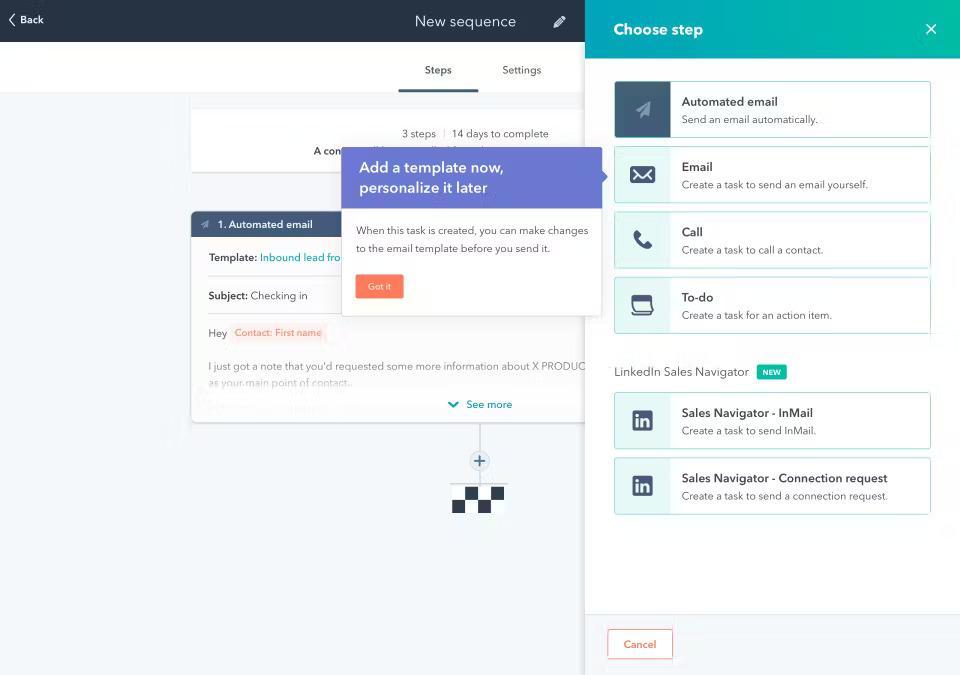
HubSpot Sales Hub is HubSpot’s powerful, cloud-based outreach solution for sales teams.
Pros
The tool is great for building personalized email sequences. With it, you can automate emails and follow-ups. However, you can also set reminders to send emails or inMails manually, make calls, or send invites to connect on LinkedIn.
In addition, the software lets you run multiple A/B tests on your email sequences.
Cons
Building multichannel campaigns with HubSpot Sales Hub isn’t possible at this time.
At the same time, this isn’t a complete sales outreach software. You could use it if you’re a complete novice to outreach. But why not subscribe to Skylead and integrate it with HubSpot instead?
What others said about HubSpot Sales Hub
Fernando P. finds HubSpot's interface and customer support great. He loves having all leads and customer journeys under one system. Still, he notes the tool could be improved with AI so as to provide more valuable insights.
Pricing
- Free: $0
- Starter: $20/mo per seat
- Professional: $100/mo per seat
- Enterprise: $150/mo per seat
Rating
- Capterra: 4.6 (452)
#11 Dripify - Best sales outreach tool for its ability to integrate with various software
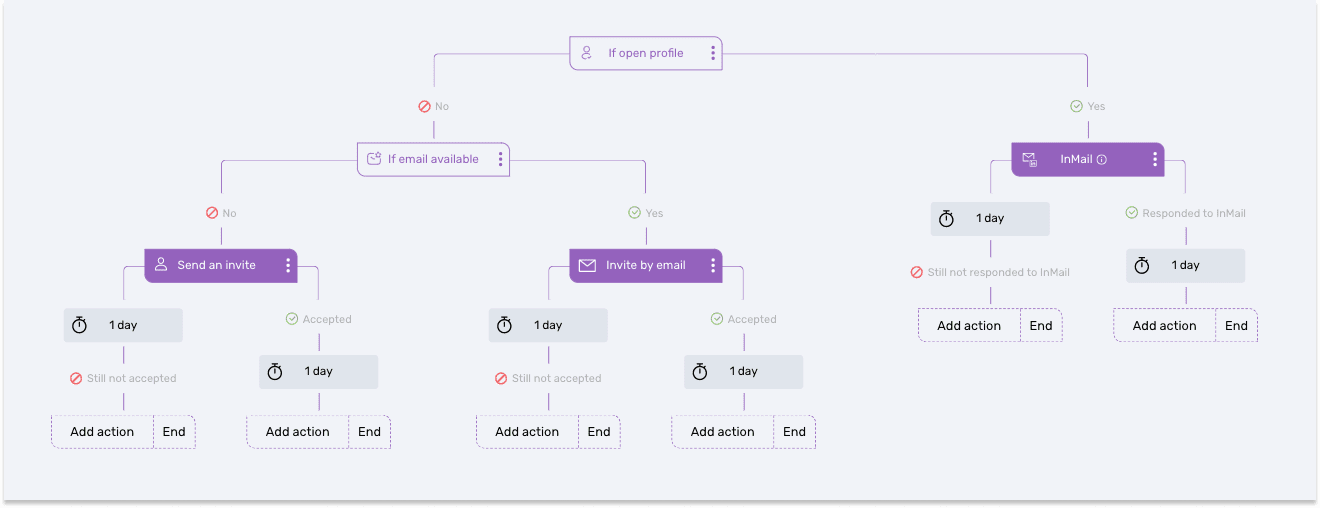
Dripify is a cloud-based tool for LinkedIn outreach designed to help sales teams close more deals.
Pros
Dripify is a great tool for anyone interested in social selling on LinkedIn.
The software can connect to LinkedIn Premium, Sales Navigator, and Recruiter Lite accounts. It can extract leads from LinkedIn Search or CSV files.
Its notable feature is drip campaigns, which rely on a sequence of different actions, conditions, and delays. It’s also praised for its ability to integrate with numerous software thanks to webhooks.
Cons
To us, multichannel outreach is the best type of outreach. However, seeing as Dripify supports only LinkedIn automation, it’s clear that, in contrast to Skylead, it isn’t a complete sales outreach tool.
In addition to lacking email automation capabilities, Dripify doesn’t come with an email finder and verifier. Furthermore, you can’t bring your A-game to personalization with it since no image personalization feature is there.
At the same time, Dripify doesn’t support campaign creation from LinkedIn posts or Sales Navigator lead lists. And while you can automate it to send free inMails, the same doesn’t apply to paid ones.
Finally, Dripify’s team doesn’t provide one-on-one onboarding, so you’re left to figure out the tool’s functionalities on your own.
What others said about Dripify
Don F. believes Dripify is a solid communication platform for keeping in touch with LinkedIn connections. In his opinion, the tool's only con is its inability to launch multichannel campaigns.
Pricing
- Basic: $59/mo per user
- Pro: $79/mo per user
- Advanced: $99/mo per user
Rating
- Capterra: 4.7 (230)
#12 SalesLoft - Best sales outreach solution for building and managing pipelines
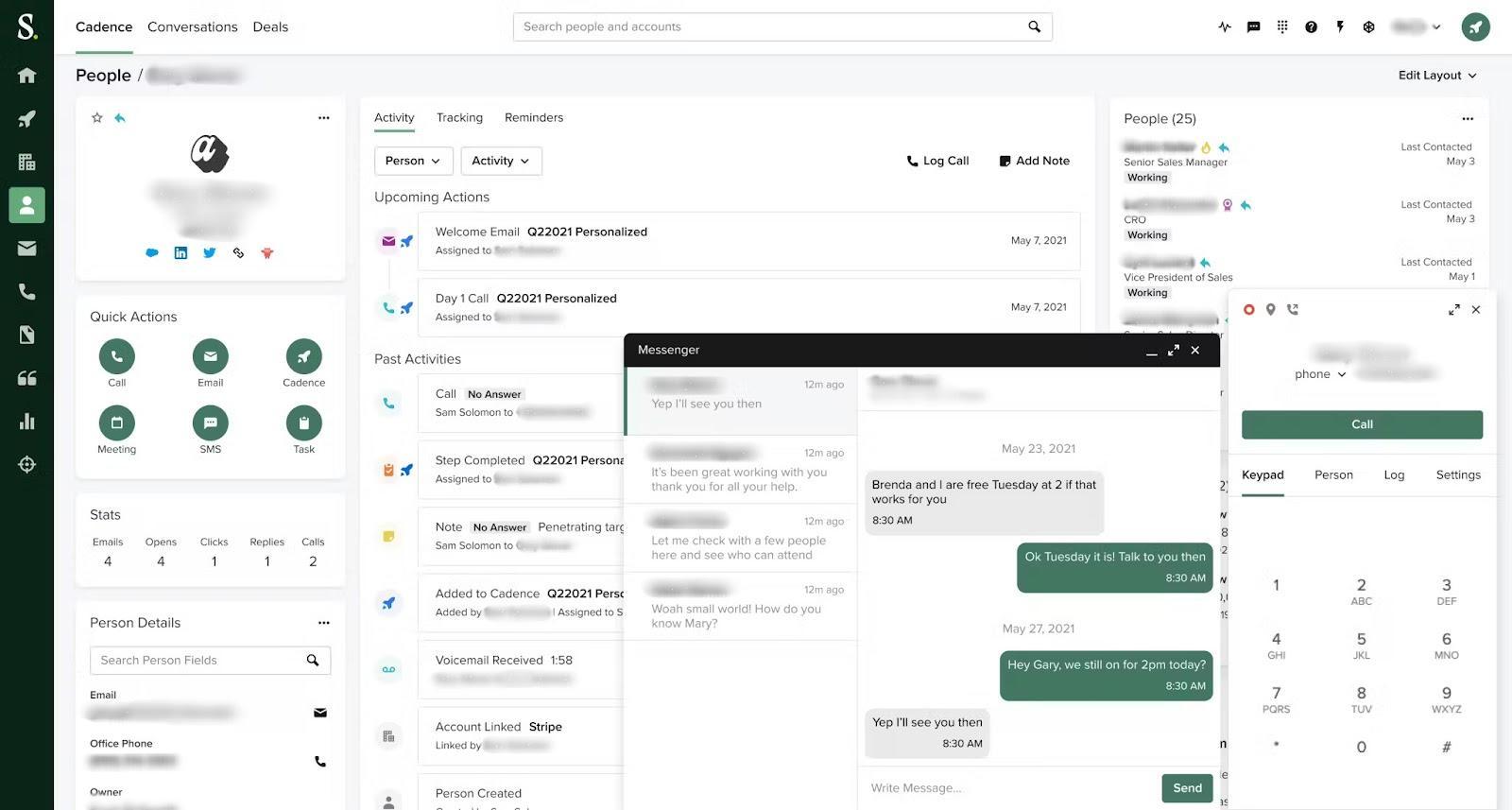
SalesLoft isn’t your typical sales outreach tool. It’s a cloud-based sales engagement platform.
Pros
The platform combines multiple tools that help salespeople increase and manage pipelines. As such, it goes beyond outreach. Nevertheless, SalesLoft's cadences (campaigns, if you will) that combine email, phone, and Sales Navigator steps make it one of the best sales outreach tools.
We have found the tool’s email tracking, analytics, and A/B testing a boon! We were also happy to find out that the software comes with nifty email templates that can be customized for added personalization. There’s also an option to save new ones!
Cons
The tool only integrates with Sales Navigator, so we couldn’t create multichannel sequences. Also, this tool doesn’t support LinkedIn Premium and Recruiter accounts.
Furthermore, unlike Skylead, Salesloft lacks smart sequences. Consequently, its users are unable to maximize touchpoints with leads, resulting in less personalized outreach flows and lost opportunities for lead generation.
What others said about SalesLoft
James W. is absolutely sold on the customer support that the SalesLoft team provides. However, he admits the platform can become slow.
Many people have also mentioned that the SalesLoft dialer isn’t up to par. Additionally, they've pointed out that the tool is quite expensive.
Pricing
- Essentials: Available upon contact
- Advanced: Available upon contact
- Premier: Available upon contact
SalesLoft doesn’t publicly disclose its pricing because it’s tailored to each company based on its size and requirements. We’ll respect their decision and won’t say how much we’ve paid during our short time with them. However, the word on the street is that people are paying anywhere from $75 for the essentials version up to $125 for the premium plan.
Rating
- Capterra: 4.4 (213)
#13 Yesware - Best sales software for Gmail & Outlook outreach
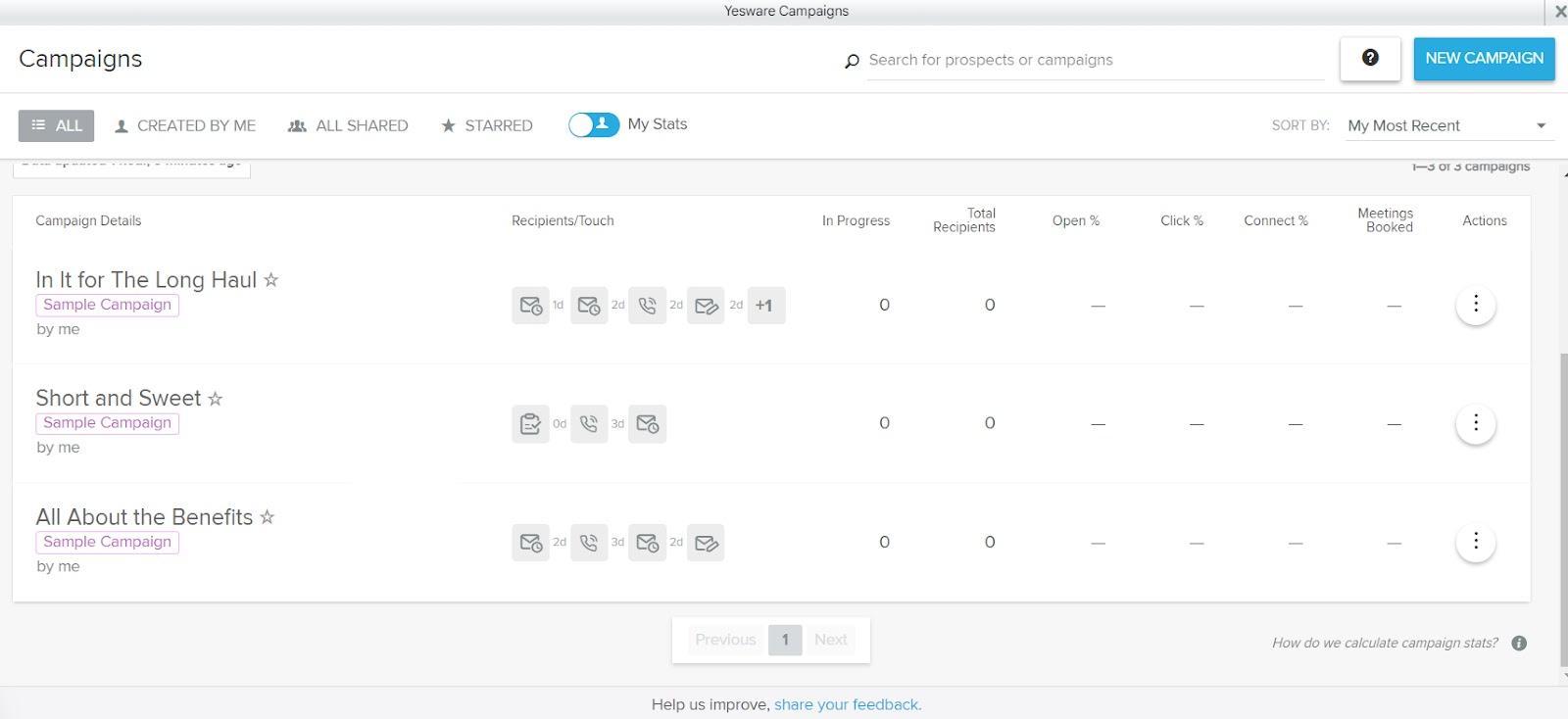
Yesware is a sales outreach platform that integrates directly with Gmail & Outlook through a Chrome extension.
Pros
Yesware, like Skylead, allows for:
- Multichannel campaign creation (you can connect your Sales Navigator account to the tool),
- Automated follow-ups in case of no reply,
- Email & attachment tracking (open rate),
- Advanced email performance analysis.
Additionally, it supports:
- Scheduling meetings and calls,
- Setting follow-up reminders.
The platform also has email templates available to personalize as you see fit. We also like how it lets you save your own templates.
Cons
Based on our personal experience with the tool, we can tell you that Yesware doesn't track email deliverability rates.
In addition, its primary focus is email outreach, while LinkedIn outreach takes a backseat. This is clear because the tool only works with Sales Navigator accounts. LinkedIn Basic, Premium, and Recruiter users can’t do much with it—other than automate their cold emailing.
Also, when setting up a multichannel campaign with Yesware, you are limited to two Sales Navigator actions: sending a connection request and an InMail. The tool doesn’t perform these actions automatically, either! Instead, it simply alerts you when it's time to complete them manually.
What others said about Yesware
Kim R. believes Yeware is decent, easy-to-use software. She is happy with the customer support provided and likes its real-time reporting and analytics features. Yet, she thinks it’s expensive and not so easy to integrate with other programs. Also, she found some features too complex.
Pricing
- Free
- Pro: $19/mo per seat
- Premium: $45/mo per seat
- Enterprise: $85/mo per seat
- Custom Plan: Contact sales
Rating
- Capterra: 4.3 (175)
#14 Hunter - Best sales outreach tool for finding and verifying professional emails
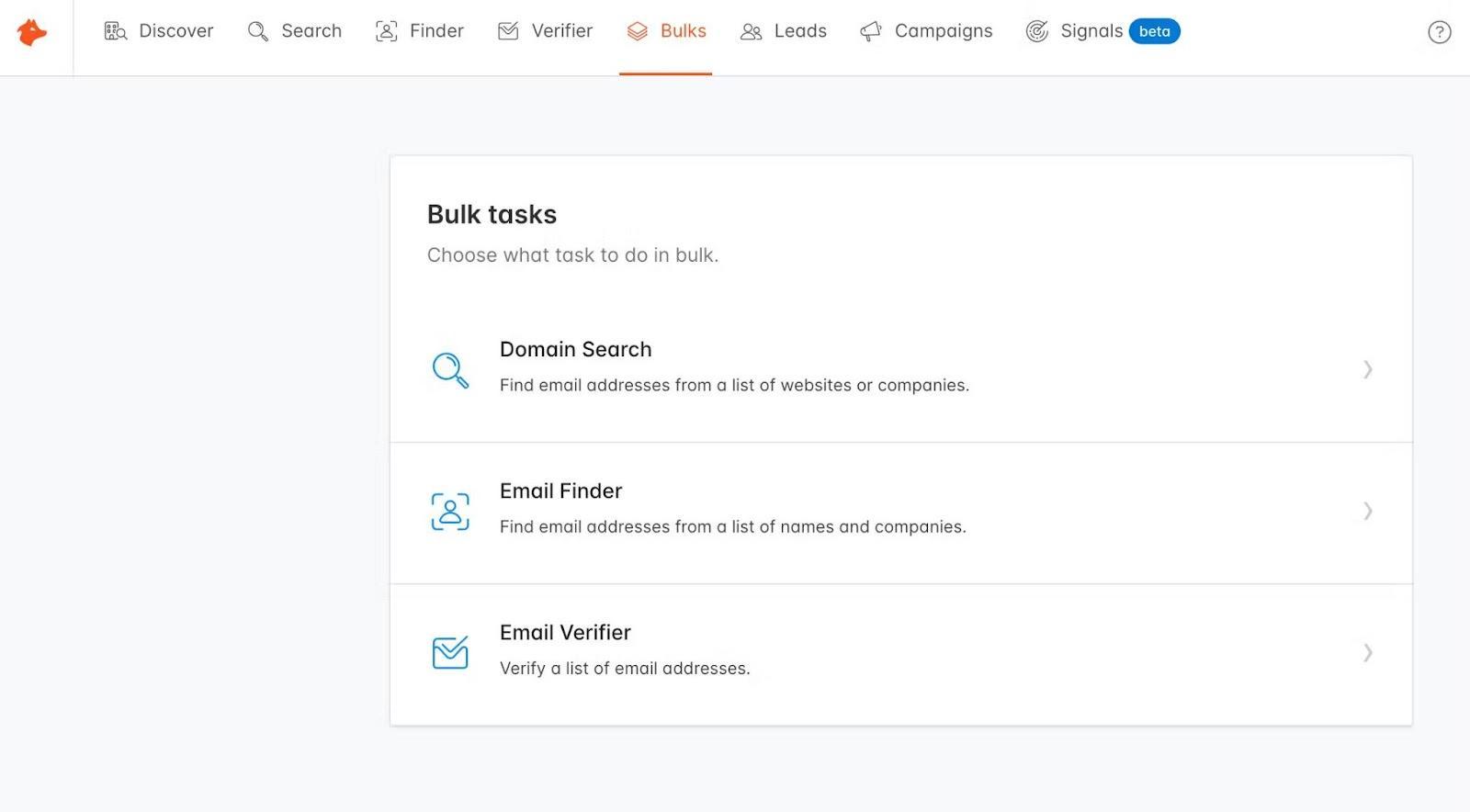
Hunter is a well-known cloud-based prospecting, data enrichment, and email lead generation software.
Pros
Hunter is the outreach tool for you if you're a sales professional looking to find verified prospect data — in seconds! In doing so, it boosts email deliverability and protects the sender’s reputation.
With Hunter, we found out that setting up an email outreach campaign is straightforward. Meanwhile, readily available variables help you craft emails that feel highly personal and induce replies.
Finally, Hunter seamlessly fits into your workflow through native integrations with different tools and Google Sheets. Alternatively, you can send over data to a software of choice using Zapier webhooks or API.
Cons
Hunter is strictly an email outreach tool, which means it lacks features for social selling.
Although the tool can find and verify your leads' emails, these features are not integrated into the outreach flow as they are in Skylead. In other words, the tool needs to discover and verify emails first. Only once it returns results can you start an email outreach campaign.
Lastly, the tool can’t extract emails from social media profiles.
What others said about Hunter
Pedro A. believes that Hunter is one of the best sales outreach tools for email scraping. He's noticed a high accuracy in finding and verifying European email addresses. He thinks it'd be great if Hunter made it possible to enrich a person based on their LinkedIn URL, though.
Pricing
- Free: €0
- Starter: €34/mo / 3 email accounts
- Growth: €104/mo / 10 email accounts
- Business: €349/mo / 20 email accounts
- Enterprise: Contact sales
Each plan comes with a limited number of email verification credits. You can purchase additional credits, but keep in mind that the cost will depend on your subscription plan.
Rating
- Capterra: 4.6 (614)
#15 Mailshake - Best outreach tool for setting up simple drip campaigns
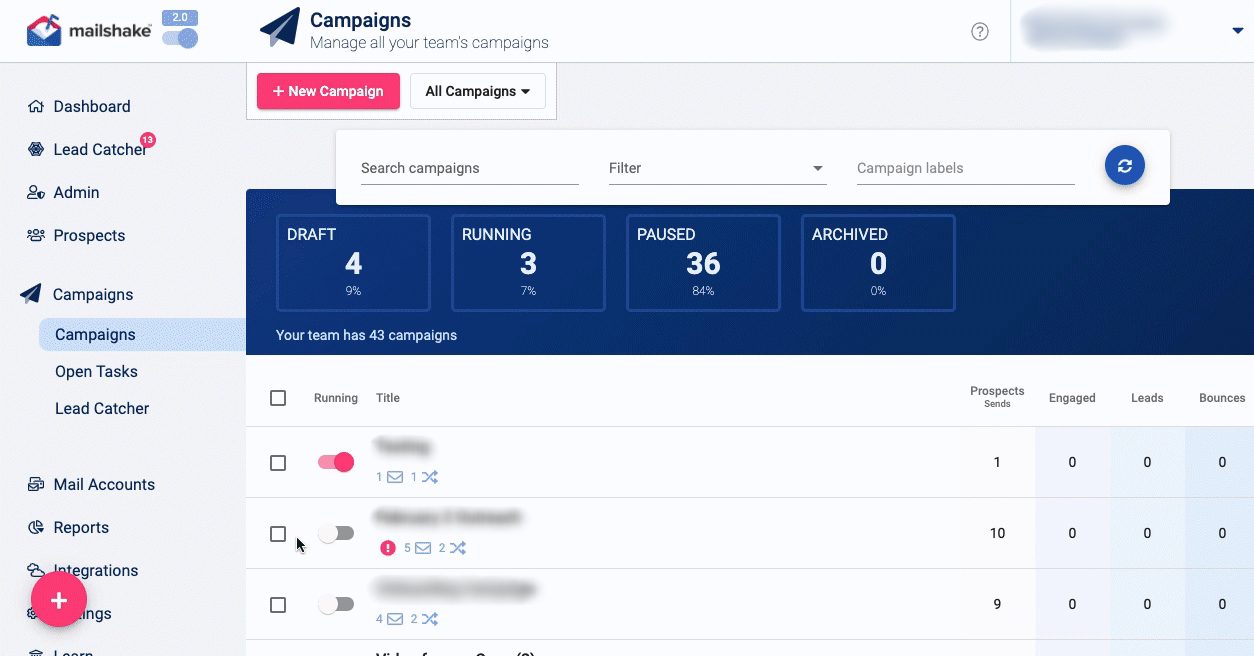
Mailshake is a cloud-based sales engagement platform with a Chrome extension for LinkedIn automation and an AI email writer.
Pros
Mailshake has an intuitive sequence builder that you can use to automate sending cold emails and follow-ups. Unlike other tools, where sequences stop when the prospect responds, Mailshake has the option to continue its campaign even if the lead responds. In other words, other tools like Skylead have an option to manually get leads back to a campaign once they respond. However, if you wish that the sequence just continues despite your leads’ response, you’ll like this option.
You can also use Mailshake to automate profile views on LinkedIn, along with invites to connect and messages.
Clearly, Mailshake supports multichannel outreach, and it even makes it possible to add calls into the mix, courtesy of the built-in dialer. Although, this is a manual task.
Cons
LinkedIn automation, which isn’t even complete, and cold calling are exclusive to the highest-tier subscription.
Additionally, Mailshake automates LinkedIn actions through a Chrome extension, compared to Skylead, which is a cloud-based automation tool. That said, it may not be the safest option for your LinkedIn outreach.
What others said about Mailshake
Engin A. is impressed by how easy this sales outreach platform is to use. He is also satisfied with the onboarding process. However, he says that Mailshake can prove expensive for medium to large teams.
Meanwhile, more than one person has noted you have to be very careful about daily sending limits for email accounts connected to Mailshake, as Gmail tends to flag emails sent in bulk as spam. That’s why Skylead has inbox rotation—a feature that has caused many Mailshake users to turn to Skylead!
Pricing
- Starter: $29/mo per user
- Email Outreach: $59/mo per user
- Sales Engagement: $99/mo per user
Rating
- Capterra: 4.7 (108)
#16 SalesBlink - Best sales tool for AI-powered email outreach
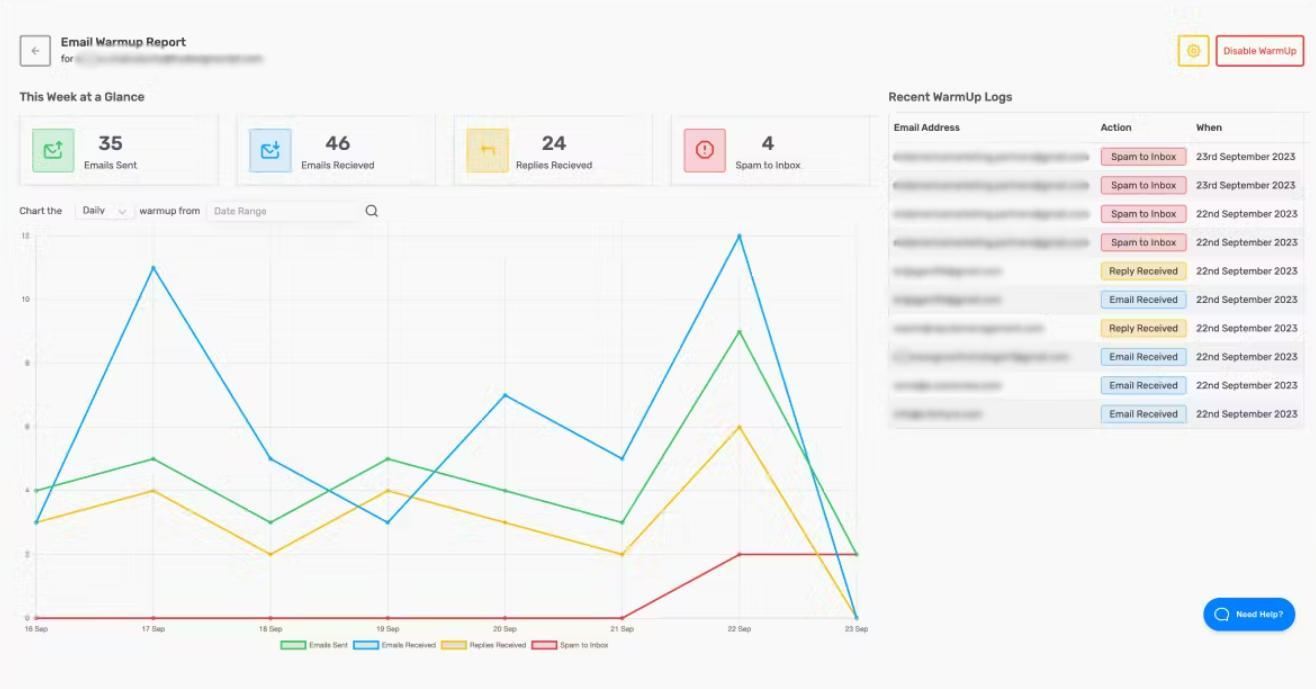
SalesBlink is a cloud-based sales outreach tool for cold emailing.
Pros
SalesBlink lets you take advantage of its AI, BlinkGPT, to create smart email sequences with follow-ups adjusted to the outcome. What’s more, thanks to the software’s email warm-up feature, your emails are sure to land in your leads’ inboxes, not spam.
SalesBlink allows you to connect multiple sender accounts and automatically rotates them while sending emails to ensure you stay within limits.
Finally, the tool makes managing conversations effortless, keeping them all in a unified inbox.
Cons
We found it inconvenient that the tool limits the number of emails you can send depending on your subscription plan. With the highest subscription, you can send up to 100,000 emails. However, if you don’t want to pay the highest subscription for this, sales outreach tools like Skylead and Instantly, which allow you to send unlimited emails, may be better suited.
Moreover, while you can add multichannel tasks to your sequences, you have to complete them manually. Therefore, no real multichannel outreach is supported. Email sequences are smart, unfolding based on your prospect’s behavior. Nevertheless, Skylead is superior in this regard as well, as it comes with smart sequences and support for multiple channels.
What others said about SalesBlink
SalesBlink is Alfred R.'s go-to tool for email outreach, and he proudly talks about it! The absolute best for him is its top-notch AI email assistant, which saves him immense time and optimizes his email management. The only downside he could think of is that you can't add a lot of information when describing a business to the AI, which tells us that the AI feature is not that complete.
Pricing
- Scale: $29/mo per account
- Growth: $99/mo per account
- Business: $199/mo per account
Rating
- Capterra: 4.7 (131)
#17 Saleshandy - Best outreach tool for A-Z testing
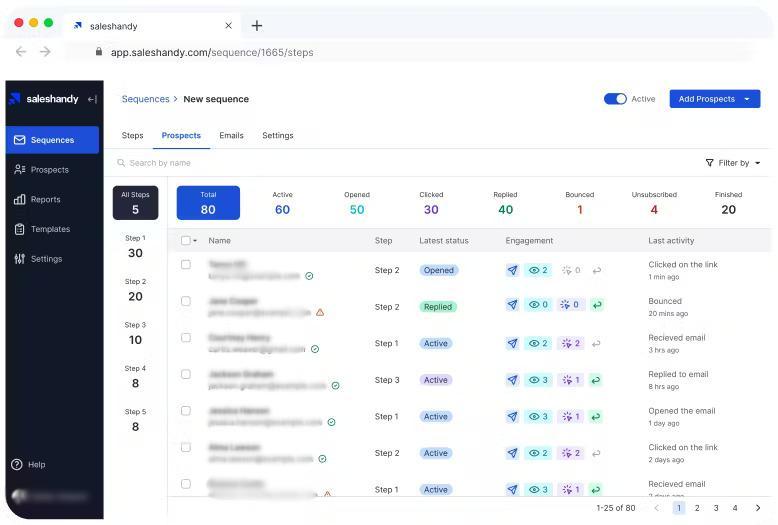
Saleshandy is a cloud-based software for email automation and prospecting.
Pros
The software has an up-to-date pool of over 700 million verified leads that you can search through and include in your outreach. It also has a Chrome extension that finds prospects’ emails on LinkedIn (phone numbers also, but at a higher cost).
Its highlight features, such as simple (not smart) email sequences, email scheduling, and email tracking, streamline your cold email outreach, enhance deliverability, and help you generate more leads.
What really caught our attention, though, were the A/Z tests. The software allows users to test up to 26 different subject lines, email bodies, and CTAs.
Cons
Saleshandy doesn't support reaching out to prospects via LinkedIn and channels that aren’t email. While you can identify leads’ emails on this social networking site, be cautious; using its Chrome extension might compromise the safety of your LinkedIn account.
There’s an add-on for email verification, too. However, it costs extra.
What others said about Saleshandy
To Shamim Ahmed A., Saleshandy is one of the best and most affordable sales software for email outreach. He praises its many features, such as unlimited email warm-up, email automation, and analytics. Still, he hopes the warm-up feature will be further improved in the future.
Pricing
- Cold Emailing Plans: From $36/month for the Outreach Starter to $299/month for the Outreach Scale Plus per account.
- B2B Lead Finder Plans (emails only): From $47/month for the Lead Starter to $299/month for the Lead Scale Plus per account.
- B2B Lead Finder Plans (emails + phone numbers): From $79/month for the Lead Starter to $599/month for the Lead Scale Plus per account.
- Agency Plans: From $99/month for the Agency Starter to $899/month for the Agency Scale Plus per account.
Saleshandy’s email verification add-on will cost you an extra $60 for 30,000 recipients.
Rating
- Capterra: 4.5 (125)
#18 Woodpecker - Best sales outreach tool for coming up with email copy quickly
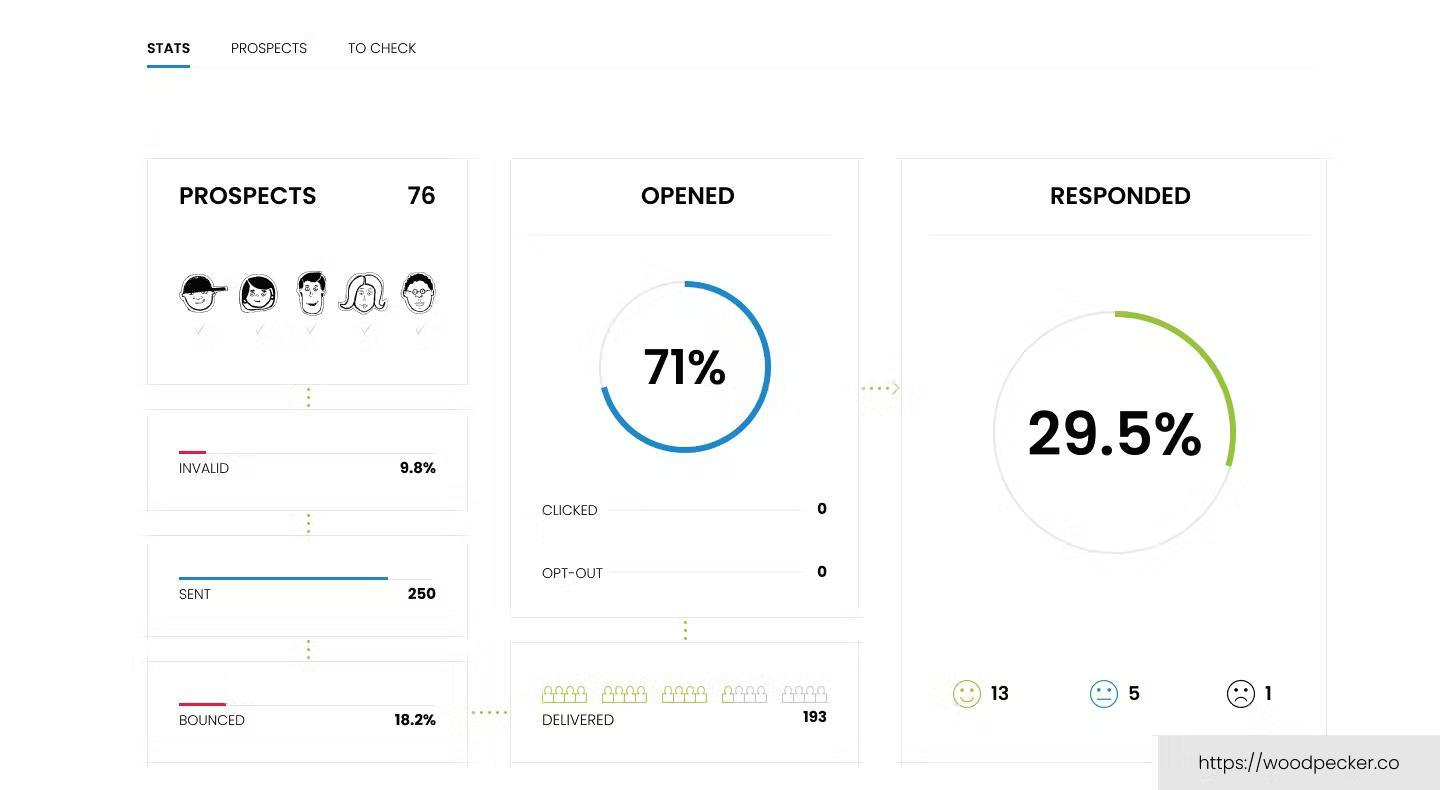
Woodpecker is one of the best cold email software with add-ons that turn it into an all-in-one sales outreach platform.
Pros
Woodpecker is natively an email outreach tool. Nonetheless, it supports creating multichannel campaigns with LinkedIn actions and calls through built-in integrations with Dux-Soup and AirCall.
The platform allows you to connect unlimited email accounts and auto-rotates them to keep email deliverability high.
Woodpecker can also verify your leads’ emails and lets you A/B test up to five different email variants. It even comes with an AI assistant that generates copy for your campaigns. However, as we said previously, we tested out AI-generated copies, and the results weren’t much better than our own. In some cases, the results were even worse.
Cons
Woodpecker relies on 3rd party tools for its multichannel outreach, which incurs additional costs.
Additionally, its email verification probability isn’t as high as Skylead’s or Hunter.io’s.
What others said about Woodpecker
Woodpecker is a standout software in Michael L.'s eyes due to its ease of use and great support. While not as advanced as some other sales outreach tools, he states it fares well in the cold emailing department.
Pricing
- Prospects: From $15/mo per account
- Cold Email: From $29/mo per account
- Agency: From $56/mo per agency
Rating
- Capterra: 4.5 (32)
#19 Wiza - Best for extracting lead information from LinkedIn, Sales Navigator & Recruiter
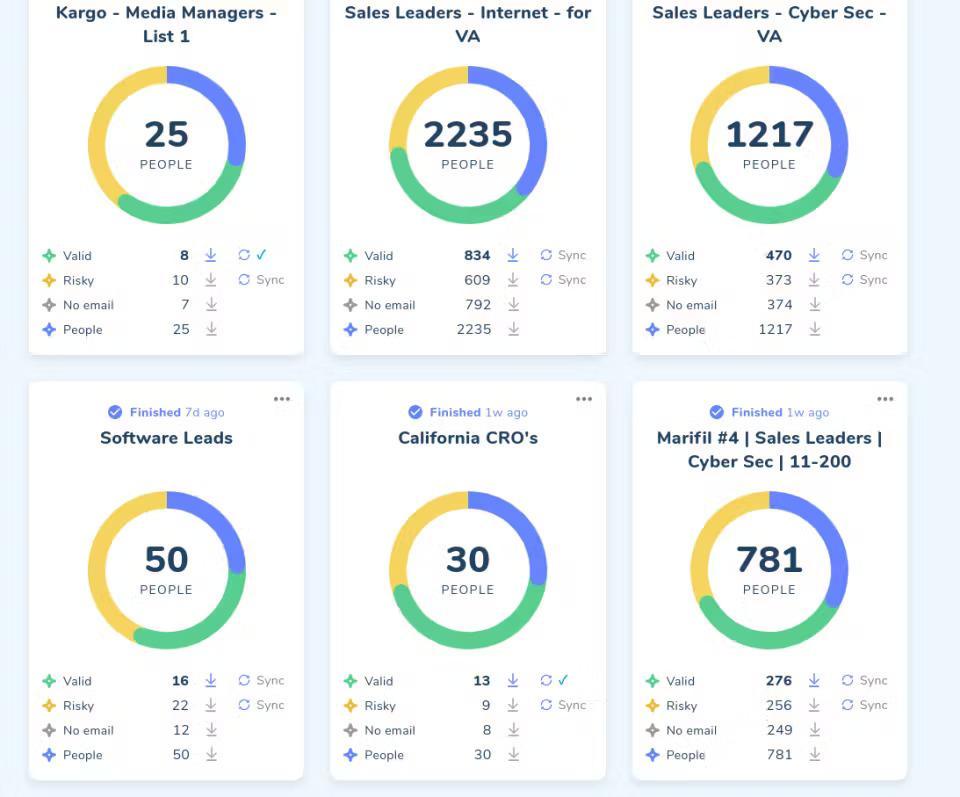
Wiza is a Chrome extension that is used to scrape prospect information from LinkedIn.
Pros
Wiza is compatible with LinkedIn Premium, Sales Navigator, and Recruiter accounts. It’s notable for its instant email verification capabilities. At the same time, it allows you to export lead lists from LinkedIn to CSV or sync them to your CRM.
On top of extracting verified work and personal emails from LinkedIn, Wiza can also extract work and cell phone numbers that are publicly available on LinkedIn.
FIY, the software will use up your verification credits only if it manages to find valid prospect information.
Cons
We can’t say that Wiza is a real sales outreach tool, even though some categorize it as such. Instead, it’s a prospecting tool that can only inform your outreach strategy.
Also, since this is another Chrome extension on the list that injects code into LinkedIn, it could lead to your banning on the platform.
What others said about Wiza
As per Prerana B., Wiza is convenient, fast, and accurate. She also likes how the tool can scrape leads' information from LinkedIn. On the flip side, she finds it a bit expensive. However, while Prerana praises Wiza for its email discovery and verification capabilities, we’ve found Skylead to have a much higher email enrichment success rate.
Pricing
- Free: $0
- Email: $99/mo per user
- Email + Phone: $199/mo per user
Rating
- Capterra: 4.6 (20)
#20 GrowMeOrganic - Best sales outreach tool for automating hyper-personalized follow-ups
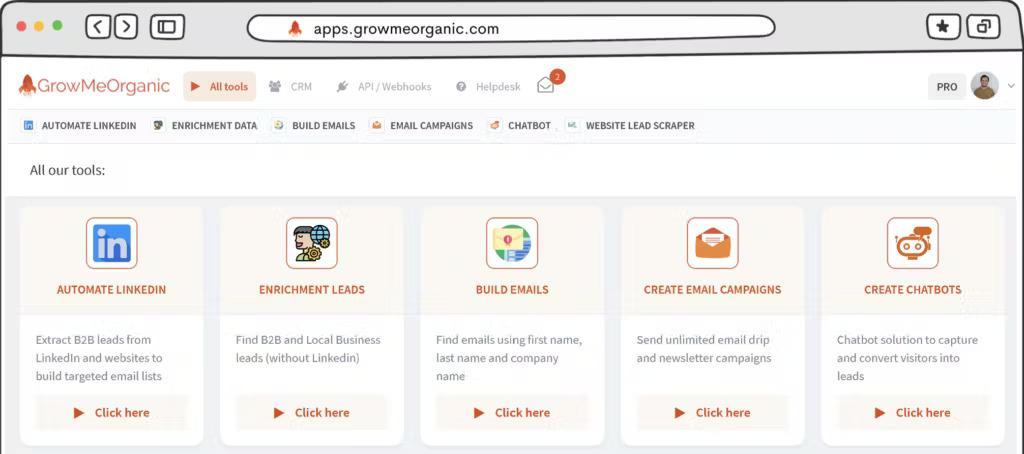
GrowMeOrganic is a cloud-based outreach solution for cold emailing. It also features a Chrome extension that can extract verified emails and phone numbers from LinkedIn.
Pros
GrowMeOrganic is great for automating cold emails and follow-ups based on your prospects’ behavior. We liked that the tool has a native image personalization feature and can track open, click, reply, and conversion rates.
GrowMeOrganic is compatible with email accounts from all providers.
Cons
Another Chrome extension, another major downside. To preserve your LinkedIn account, you are better off choosing another tool, at least for prospecting and email enrichment.
GrowMeOrganic also lacks support for LinkedIn outreach. As such, it misses out on the opportunities the greatest platform for social selling holds.
Furthermore, we noticed it’s impossible to download a PDF report. Only CSV and XLS exports are available.
What others said about GrowMeOrganic
Raghavendra D. has been using GrowMeOrganic for a while and says it's an excellent tool for sales automation. She finds its LinkedIn and Google My Business email scraper incredibly useful! Nonetheless, she doesn't like that this is a Chrome extension, nor do we. She’d like it better if there were an option to search for leads directly through the platform.
Pricing
- Starter: $49/mo / 1 user
- Growth: $99/mo / 5 users
- Pro: $199/mo / unlimited users
Rating
- Capterra: 4.2 (10)
#21 Lusha - Best for prospecting around the Web
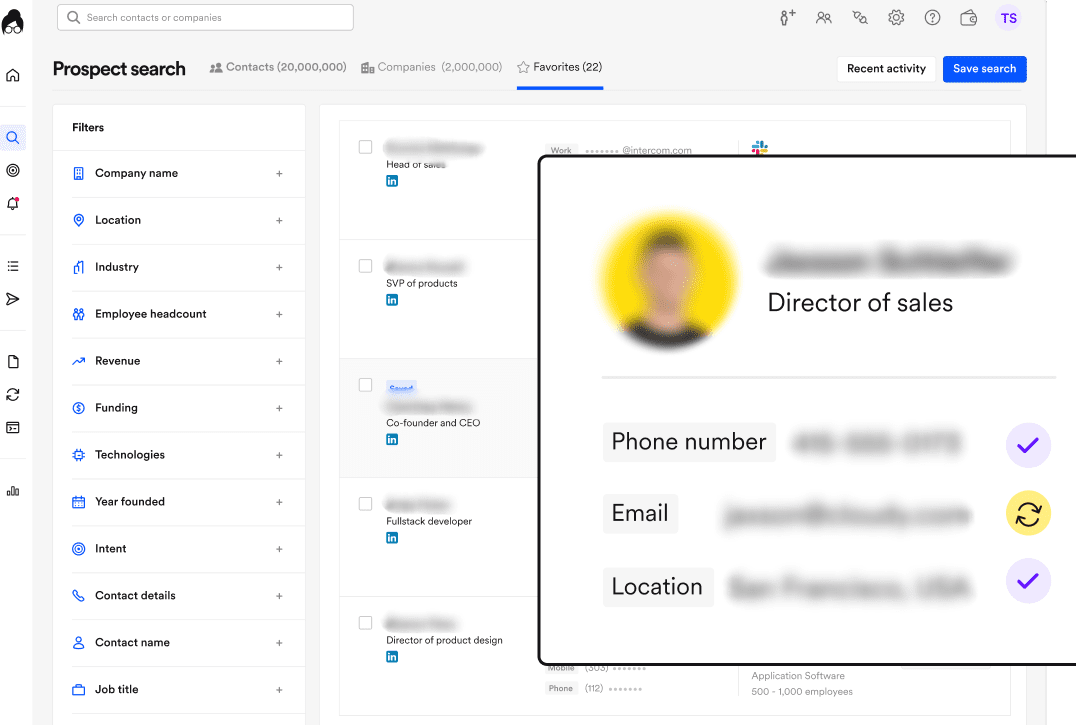
Like Wiza, Lusha is primarily a cloud-based prospecting tool, although salespeople can also use it for email outreach.
Pros
The greatest thing about Lusha is its Chrome extension, which can extract prospects from anywhere. It also has a built-in B2B prospecting tool with filters that can get you up to 1,000 leads in one go.
Furthermore, you don’t have to resort to another software for your outreach; you can automate Lusha to send emails! Rather than relying on your time zone when doing so, the tool, like Skylead, lets you set different time zones for different email sequences. In other words, it reaches out to your leads when the time is right...for them!
Cons
Lusha uses a Chrome extension to extract prospects from different sites. If you are prospecting on LinkedIn, it could threaten your account’s existence.
Moreover, this tool is only compatible with Gmail and Outlook accounts. If your email account is with a different provider, you won’t be able to use it for your outreach. Also, you can only connect one email account to Lusha, and it must be the one you used to register on the platform.
Lastly, its built-in database of B2B leads includes 45 million contacts in North America and 21 million in Europe. If your target audience is based on other continents, this may result in missed outreach opportunities.
What others said about Lusha
Ben B. reports that Lusha speeds up his prospecting and lead generation and offers great value for money. The only problem is that the quality of data found could sometimes be better.
Pricing
- Free: $0
- Pro: $49/mo per seat
- Premium: $79/mo per seat
- Scale: Contact sales
Rating
- Capterra: 4.1 (360)
#22 MeetAlfred - Best sales automation tool for X outreach
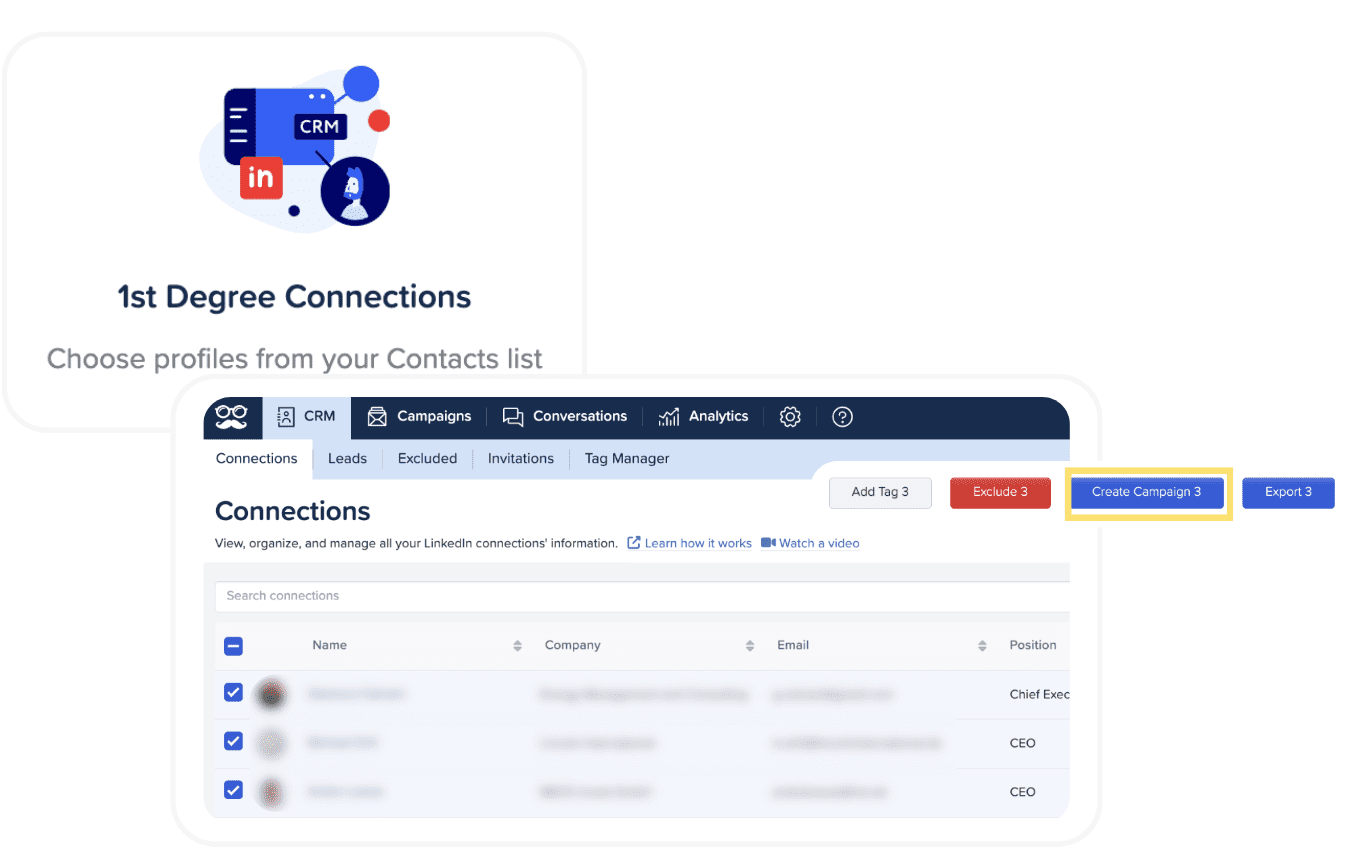
MeetAlfred is a cloud-based sales outreach platform designed for LinkedIn, email, and X outreach.
Pros
MeetAlfred is different from other multichannel sales outreach tools in that it also integrates with X (formerly Twitter). As such, you can use it to automate different activities on three fronts: LinkedIn, email & X.
The tool’s campaign builder allows for adding infinite steps — from profile views and invites to connect to follow-up messages, inMails, emails, and X DMs. At the same time, it lets you set up delays between steps and personalize your messages with customizable templates and variables.
We also found it convenient how you can connect the tool to your Facebook and Instagram accounts. Although MeetAlfred can't be used to message prospects on these platforms, you can use it to create and schedule posts.
Cons
Unlike Skylead, MeetAlfred doesn’t have smart sequences. It also doesn’t support campaign creation from Recruiter search, nor does it support sending paid inMails.
Consequently, the software’s integrated inbox only shows your LinkedIn/Sales Navigator messages. If your campaign includes emails and DMs, you must manually check for new ones.
What others said about MeetAlfred
Martin P. considers MeetAlfred a perfect sales tool for someone with experience using this type of outreach software. He is fond of its simple interface and lots of customizable templates. Nevertheless, he believes it might be difficult for beginners to use.
Pricing
- Individual: $59/mo per user
- Business: $99/mo per user
- Agency: Contact sales (includes 10 users)
Rating
- Capterra: 2.8 (13)
#23 LeadConnect - Best outreach solution for following up on LinkedIn
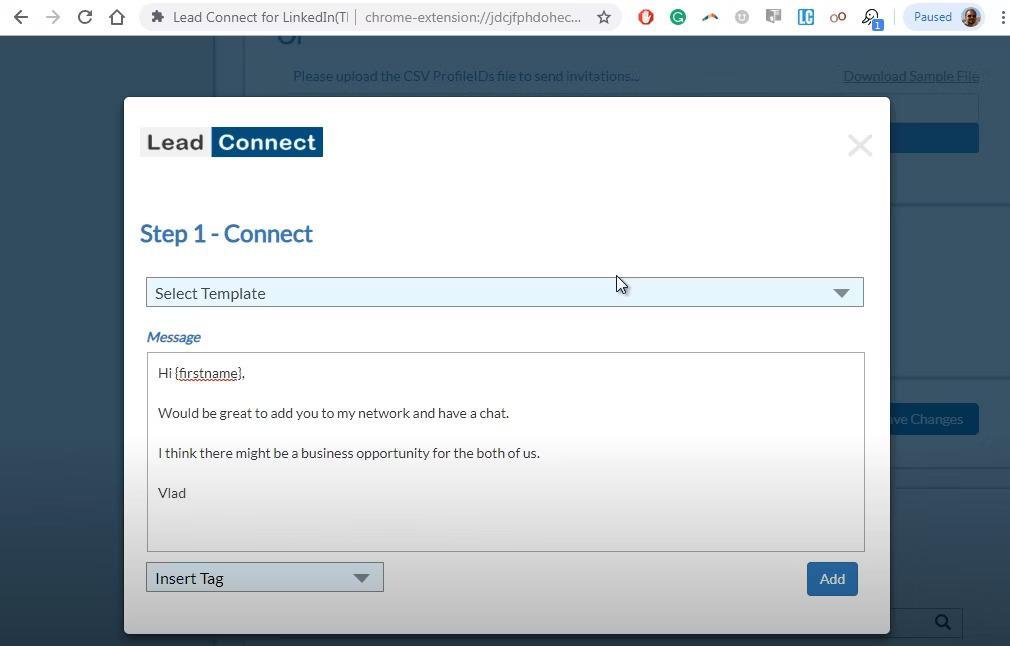
LeadConnect is a Chrome extension used for prospecting and outreach on LinkedIn.
Pros
LeadConnect connects to LinkedIn Basic and Sales Navigator accounts and pulls leads’ information from a LinkedIn search or a CSV file.
This tool lets you send personalized connection requests along with up to 6 automated follow-up messages.
Additionally, thanks to its native integration with HubSpot, pushing leads and conversations to the latter is as simple as a single click.
The tool also works with Findthatlead, Hunter.io, and Anymailfinder to discover your prospects’ email addresses. This is especially handy, as it gives you another channel to contact users who haven’t responded: email.
Cons
You can only use LeadConnect to contact users via LinkedIn. The tool doesn’t support sending inMails and emails, either.
The platform works only with LinkedIn Basic and Sales Navigator accounts. It cannot be used by anyone subscribed to LinkedIn Premium or a Recruiter plan.
With LeadConnect, you can only automate connection requests and LinkedIn messages. This makes it fairly primitive compared to Skylead and its multichannel smart sequences.
Plus, given that LeadConnect is a Chrome extension, it could lead to account restrictions.
What others said about LeadConnect
In Sheryl S.'s opinion, LeadConnect is a great sales outreach platform for growing her LinkedIn network. She also mentions that it's quite easy to use. The only issue is that when there are a lot of prospects to discover, she sometimes has to refresh the URL.
Pricing
- Free Forever: $0
- Professional: $ 25.95/mo per account
- Grow: $ 45.95/mo per account
- Ultimate: $ 85.95/mo per account
Rating
- Capterra: 4.4 (98)
#24 Evaboot - Best tool for scraping leads from Sales Navigator
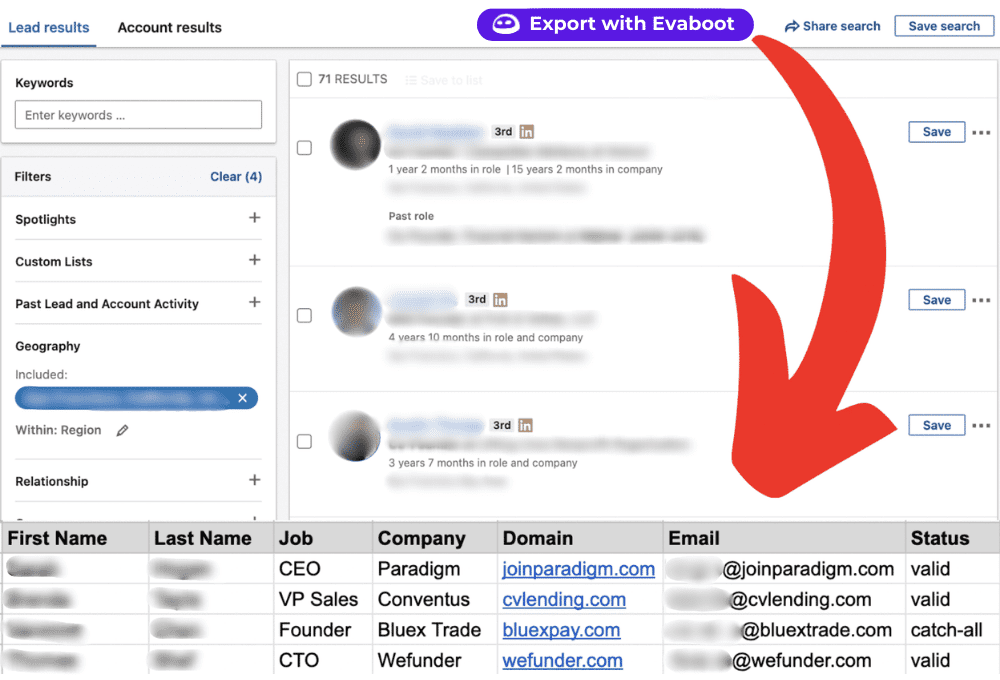
Like Wiza or Lusha, Evaboot is a Chrome extension for Sales Navigator prospecting.
Pros
Evaboot allows users to build lead lists from Sales Navigator in seconds and export them to CSV.
In addition to scraping leads, the tool can also find and verify professional emails.
Cons
Evaboot is only compatible with Sales Navigator, rendering it useless for LinkedIn Basic, Premium, or Recruiter subscribers.
Furthermore, this is a Chrome extension that, as you already know, can harm your Sales Navigator account.
We’ve tested the tool and can also tell you that their email discovery feature frequently provides inaccurate information or no information at all.
Lastly, this isn’t an email automation tool or any other type of outreach software. Yes, you can use the information gathered to contact leads. However, you’d need to subscribe to another sales outreach tool to do so.
What others said about Evaboot
Ky K. says Evaboot is easy to use and effective at what it does. The slight downside is that it doesn't allow him to select the number of leads to export.
Pricing
| LinkedIn data & professional email finder credits | Price (monthly / per account) |
| 500 | $29 |
| 1,500 | $49 |
| 4,000 | $99 |
| 8,000 | $149 |
| 20,000 | $299 |
| 50,000 | $499 |
Rating
- Capterra: 4.9 (13)
#25 Dux-Soup - Best LinkedIn automation tool for sending free and paid inMails
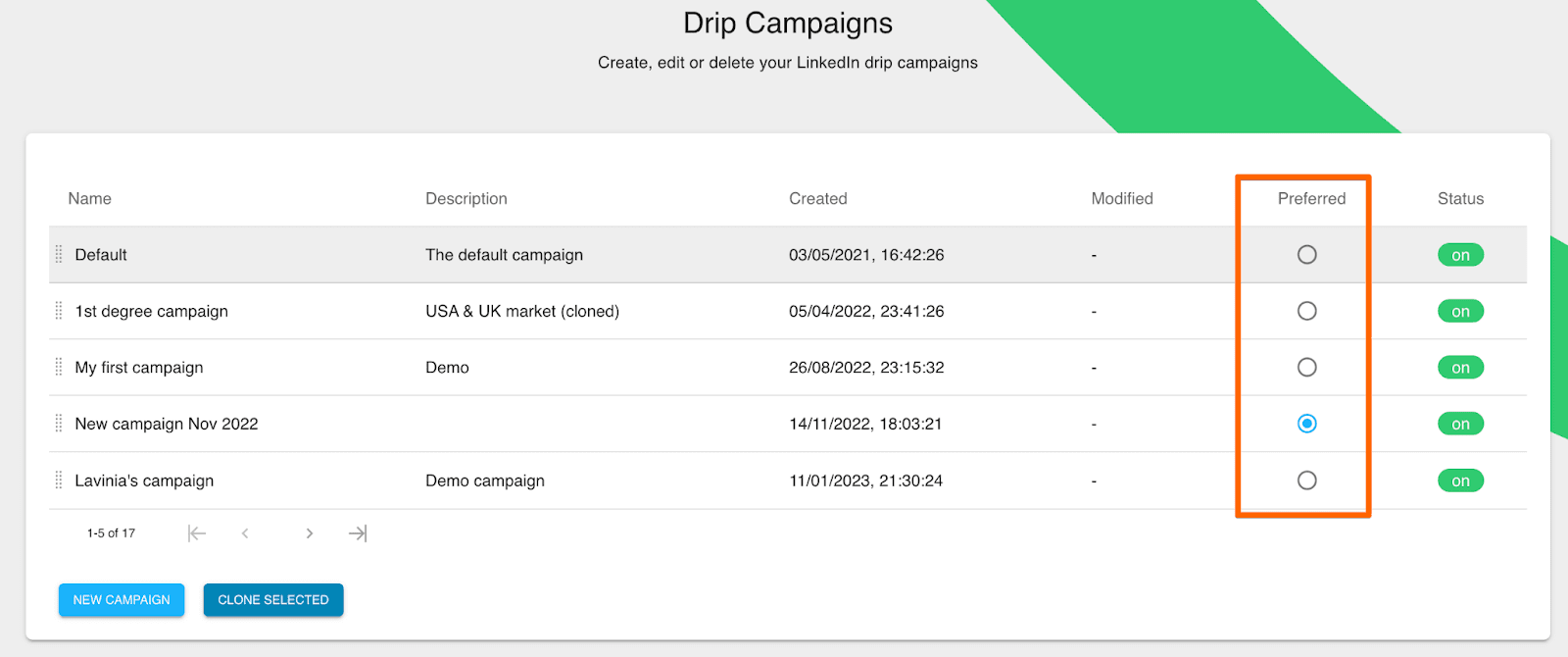
Initially a Chrome extension for LinkedIn automation, Dux-Soup now also offers a cloud-based sales outreach solution.
Pros
Dux-Soup can automate the following LinkedIn, Sales Navigator, and Recruiter actions:
- Endorsements
- Follows
- Profile visits
- Personalized connection requests
- Personalized messages to 1st connections
- inMails (free & paid)
With it, you can mix and match different actions to create unique drip campaigns that stop once your prospects’ respond.
We like that you can also customize time delays between individual steps and monitor campaign statistics once the campaign is live.
The software natively connects to Pipedrive, Hubspot, and SharpSpring. Nonetheless, you can also connect it to another CRM using Zapier webhooks.
Cons
Dux-Soup has a cloud-based solution for LinkedIn outreach, but it’s only available under their most expensive subscription plan. Those on lower plans have to rely on their Chrome extension for automation, which could compromise their LinkedIn accounts. Not to mention, the tool can only run while the browser is open.
Moreover, the software can’t be used for email outreach or any other type of outreach.
What others said about Dux-Soup
Leilani S. finds that Dux-Soup simplifies prospecting on LinkedIn. Her favorite feature is the X-ray tool, which enables her to discover LinkedIn profiles via Google. However, she notes that the software occasionally disrupts her workflow by randomly refreshing her page.
Pricing
Individual & Team Plans
- Pro Dux: $14.99/mo per seat
- Turbo Dux: $55/mo per seat
- Cloud Dux: $99/mo per seat
Agency Plans
- Pro Dux: from $337.50/mo for 30+ seats
- Turbo Dux: from $412.50/mo for 10+ seats
- Cloud Dux: from $371/mo for 5+ client seats
Rating
- Capterra: 4.0 (14)
#26 Salesloop - Best for expanding your LinkedIn network on autopilot
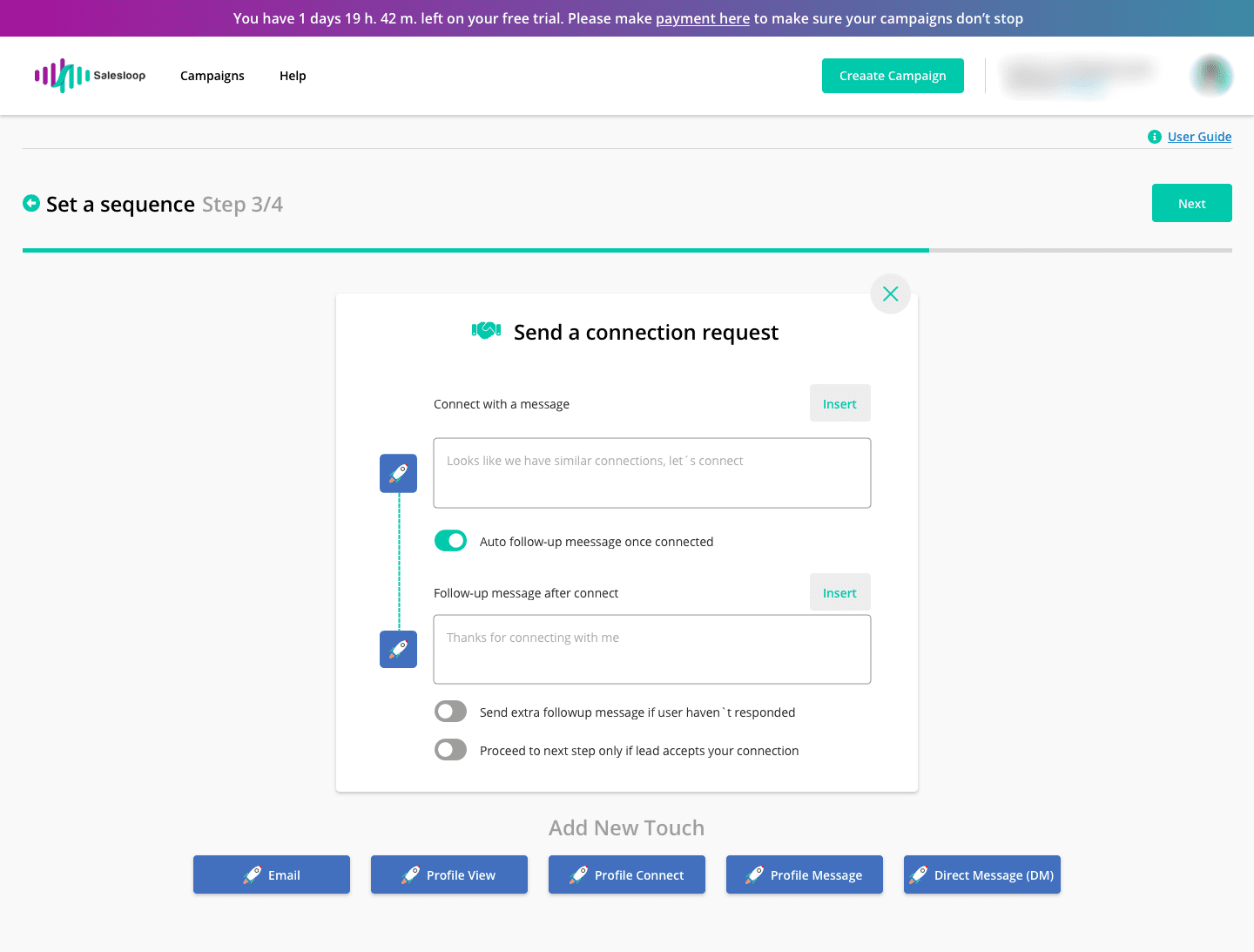
Pros
Salesloop is designed to work with all types of LinkedIn accounts: Basic, Premium, Sales Navigator, and Recruiter.
The software allowed us to build campaigns using LinkedIn search and by uploading lead lists in CSV format. Should you decide on the latter, you can enrich your messages with custom variables for an added dash of personalization (on top of pre-set ones).
To make campaign tracking easier, Salesloop lets you download CSV reports.
Cons
Currently, the software supports LinkedIn automation only, although email and X (Twitter) integration are supposedly in the works. It also misses out on smart sequences and, instead, relies on simple campaigns for its automation.
Additionally, Saleloop doesn’t integrate with any CRM natively. We were also disappointed to find out you can’t connect it to other tools via webhooks or API.
Lastly, unlike Skylead, which is one of the best sales outreach tools to support image & GIF personalization, Salesloop doesn’t currently offer this feature.
What others said about Salesloop
Krishan Kant S. is grateful for Salesloop because it improves his productivity and increases business performance. On top of that, it brings about financial benefits. He doesn't think the tool has any flaws.
Pricing
- Solo: $49/mo per 1 user
- Team: $199/mo per 6 users ($39 per user with a minimum of 3; tailored plans for more than 6 users)
- Managed Service: $2,000/mo
Rating
- G2: 3.5 (3)
Frequently asked questions (FAQs)
Are sales outreach tools the same as CRM?
No. Sales outreach tools are designed to automate the initial contact with potential customers through various channels (e.g., email, LinkedIn, phone). On the other hand, CRM software is all about tracking interactions, managing sales pipelines, and storing information about leads and customers.
Can you use sales outreach tools without a CRM?
You can definitely use sales outreach tools without a CRM, especially if your business is small or just starting to build its sales process. Nonetheless, pairing these tools with a CRM is a smart move as your business grows and interactions with customers increase. This combo ensures a smooth workflow.
How do sales outreach tools ensure data privacy and security?
Sales outreach tools use various methods to safeguard sensitive information. This includes data encryption and compliance with GDPR. Many tools also manage consent and preferences to comply with privacy laws. Furthermore, trustworthy vendors have clear privacy policies and security protocols displayed on their websites.
Select the perfect tool and seal your sales deals easier than ever!
Here's the thing: the sales game has seriously leveled up from the old-school days. Today, we've got a whole arsenal of sales outreach tools at our disposal. Sure, choosing the right one from the bunch can feel like finding a needle in a haystack. But that's what you've got us for! If you feel indecisive after all this talk about the top software on the market, choose Skylead.
Start your 7-day free trial now and close more deals than ever—way faster!
Social Selling or Old Sales Approach?
You are standing at the crossroad in the middle of the field. On the left, there is a sign “The old ways of sales” loosely dangling from the barren tree. A trodden path beneath the sign leads to the campfire in the night. Crows are cawing at you like the alarm, as you approach the tree hole they guard.
Towards the other path hangs a neatly hammered sign saying “Social selling”. Sun shines upon it, and you hear laughter echoing in the valley. You notice something else in the distance: the mountain, tall as the sky itself, and people climbing it.
Which way will you go?
The crossroad choice seems pretty obvious, doesn’t it? Give crows bread crumbs, grab the notebook they were hiding in the tree as your foundation. Let us take your hand as we walk towards the valley and train you for the mountain climb.
What is Social Selling?
Social Selling definition
Let’s start with the basics. Social selling is a lead generation strategy where you should connect with prospects and develop deeper relationships before leading them further down the sales funnel. In general, it can take place online or offline, but due to recent events, it is more of a social media thing now.
A big part of B2B social selling is constantly listening, understanding the prospects’ pain points, educating, and providing tailor-made value. What does this mean for SDRs? Prospects come first - their pain points, worries, and sales reps as company representatives should offer empathy and help in the form of a solution.
Here is how it differs from the old sales ways:

According to LinkedIn, 78% of social sellers outsell their peers who do not use social media.
It is important not to confuse selling on social media with social media marketing and advertising. Social selling means direct and personal interaction with customers via their social media activity to create a sense of credibility and establish a relationship. Social media marketing, on the other hand, means conducting promotional activities using the company's social media accounts and building brand awareness that way.
As social selling is a fairly complex strategy, with a web of possibilities and outcomes, we are creating a two-part blog series so you can easily master your social selling skill to boost sales. Let’s first dive deep into how you can measure the effectiveness of selling on social media.
How to measure Social Selling success
Before sharing social selling tips, we must emphasize how important it is to track and measure social selling activity. With documenting and tracking, you will know where you succeeded or what needs adjusting to improve selling on social media. Here are the top 8 social selling metrics which will help you out.
#1 Social Selling metric: SSI
As one of the most popular selling on social media metrics, LinkedIn’s Social Selling Index (SSI) proved to be a great indicator of your social selling status on LinkedIn.
LinkedIn found a way to measure how effective your presence on this platform is by building your brand, connecting with the right people, engaging, and establishing relationships.
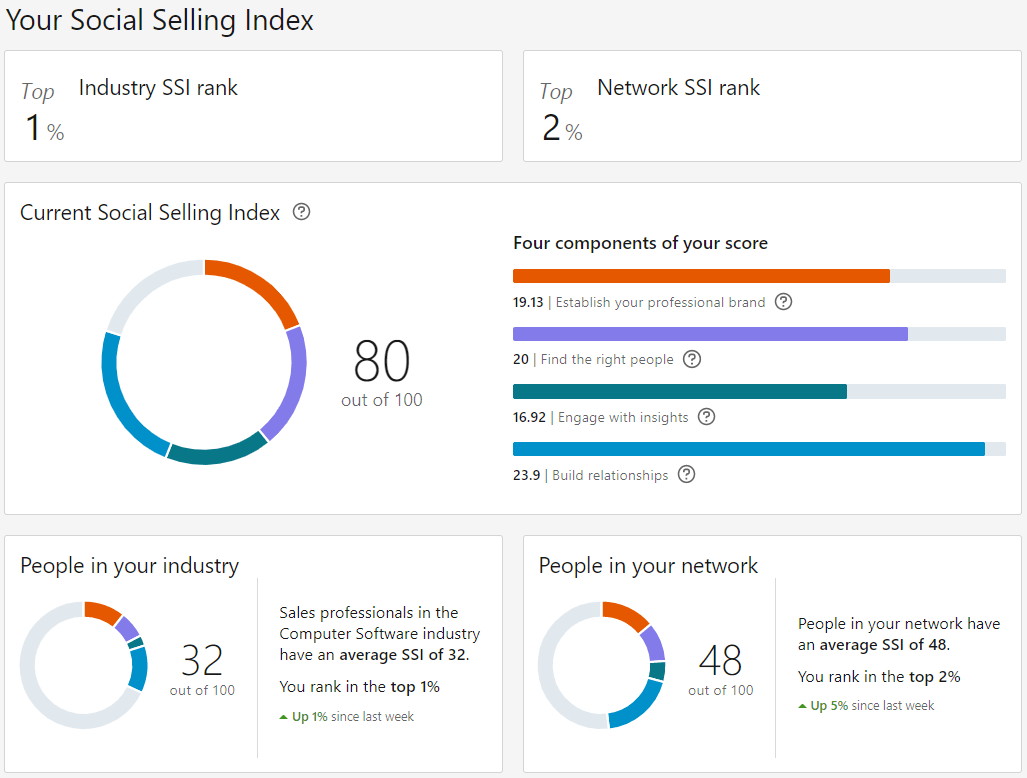
The Social Selling Index is free and available anytime, and it is updated daily. If you wish to see your Social Selling Index, click here.
In general, SSI provides insight into where you currently stand within your network and industry. If you wish to check your Social Selling Index out and improve it, head over to our blog post on how you can improve your LinkedIn SSI Score, and we will tell you all about it.
LinkedIn’s Social Selling Index is not the ultimate metric for social selling as a whole, but it does provide an excellent insight to start with and measure the success on LinkedIn. As LinkedIn is the best social network for B2B sales, it makes sense that you would want to take a step up in your efforts to generate more opportunities there.
Naturally, the social selling index only works on LinkedIn, and you cannot use it across all platforms and activities. What you can measure instead are the metrics below.
#2 Social Selling metric: Message response rate
The goal of social selling has always been quality over quantity and to create a more refined path to conversions. Yet the number of responses stays vital as it mirrors your ability to do the prospecting on LinkedIn, and identify an ideal prospect profile who will respond to you. It's best to track the response rate on each social media account, as it can also indicate your social skill to approach the prospect and which platform works better for you.
How to calculate the message response rate:
(Number of messages responded / Number of Total Messages) x 100
#3 Social Selling Metric: The number of warm leads generated
Since social selling emphasizes building and nurturing relationships, it is only logical to measure this process.

The ability to start a conversation, engage and warm up qualified leads is crucial for the sales funnel and can indicate social selling success. Each warm lead equals an opportunity to present your product or service. To achieve this, you need to have a prior honest and genuine conversation with the prospect to figure out how you can help them. This warm-up needs to be kept track of as they indicate your skills to conduct the beginning steps of selling on social media.
Warmed-up leads are a vital element for generating social selling ROI. Acquiring those types of leads and strengthening the relationship between you and the prospect, will help you during the sales process.
But there is one other benefit. When prospects who you build a strong relationship with become clients, the stronger the relationship is, the longer they will stay as a client, which will generate higher customer lifetime value and lower churn rate.
You can measure warm leads generated by counting the conversation in which you established the relationship, figuring out their pain point, or if they showed initial interest in your company.
#4 Social Selling metric: Social network growth rate
Selling on social media is also about growing your network as much as you can so you can have more opportunities to create warm conversations and develop a valuable relationship with the prospect. That's why social network growth rate is an important metric to track.
The more suitable people you have on your network, the more reach you will have to create opportunities and succeed in selling. You will have a greater chance for your content to be seen by a larger number of the target group members for your business and develop a relationship with them.
The size of the social network plays a massive role in the strategy's effectiveness, but you shouldn’t measure it alone. It should be analyzed along with other metrics, such as engagement rate, to see the complete picture. SDRs who center their efforts around growing their network and not providing value, won’t reach the same results like the ones who do both activities.
How to calculate social network growth rate:
Social Network Growth Rate = (Number of new followers / Number of existing followers) x 100
#5 Social Selling metric: Content engagement rate
The content you share is the foundation of selling on social media. Sharing valuable and relevant, and educational content with your network can position you as an expert in their eyes.
The content with the highest engagement rate is usually the one most valuable to your network. These metrics also show how engaging your audience really is. If the engagement rate is low, you need to get back to the drawing board and think twice about the content you are sharing.
Engagement rate shows whether you are providing the right information to your audience. Type of engagement you need to check out is:
- Likes
- Comments
- Shares
- Saves
How to calculate Engagement Rate:
Engagement Rate (%) = ((Likes+Comments+Shares+Saves) / Total Followers) x 100
#6 Social Selling metric: Number of referrals
One of the main benefits of selling on social media is Word of Mouth, aka referrals. As you build up your network, show your expertise, and engage with leads, you are being positioned as the qualified person to be recommended and referred to. Whatsmore, people will bind your company brand to your name, therefore you will become somewhat of a synonym. You will want to position yourself as a valuable source of information for them to share with others.
The number of referrals is an important metric to track since it shows the exact state of your skill to gain somebody’s trust and provide the right value directly and indirectly to the warm leads connections.
#7 Social Selling metric: Number of booked meetings
The second most important metric to track - the number of demos booked - demonstrates the ability to build a relationship and securely set appointments with the prospect. As leads sometimes tend to vanish before the meeting and never appear, this number should be increased after the meeting finishes.
The higher the number of meetings held, the chances are that the higher number of purchases will be.
#8 Social Selling metric: Average time spent until conversion
Have you ever wondered how much time passes before your warm leads finally convert and pay for the product or service? If not, it’s time that you do.
Analyzing the current time you need to guide prospects through a sales funnel using different social selling activities shows the average time you spent engaging and building relationships across platforms, which ultimately led to conversion. You need to keep track of activities such as the average time:
- Between the first cold approach and response
- To warm up the lead
- To accept a meeting
- The average time to nurture leads
- Overall average time up until the conversion
Being able to see how much time has passed between the activities in total up until the conversion and in combination with other metrics points out shortcomings in your approach and where you can improve your approach. Keep in mind that your approach should be timely and balanced so you can have time to build a relationship, but do not take it too long. Time spent until the conversion is best analyzed with other metrics to show what you are doing wrong.
Experts advise: Social Selling tips to boost sales
Now that we’ve talked about metrics let’s talk about tips and tricks of social selling. Selling on social media channels is not only an activity but much more. It is a strategy to find and convert high targeted leads. There are many tips over the internet, but they are all based on these five basic pillars of social selling:
- Finding the right leads for your business
- Establishing your personal, professional brand
- Engaging with others
- Providing valuable content
- Building a relationship with the prospect.
Let’s check the tips and tricks from experts around the globe and the ones that proved useful here at Skylead.
1. Optimize social media profiles for Social Selling
Before building your network and sharing content, you must first fix your social media profiles. If you ignore this step, you will jeopardize your credibility and most likely waste your efforts on social selling activities.
If we take LinkedIn for example, this is what you need to do:
- Add profile and cover image
- Create a catchy LinkedIn headline for LinkedIn lead generation
- Add a summary
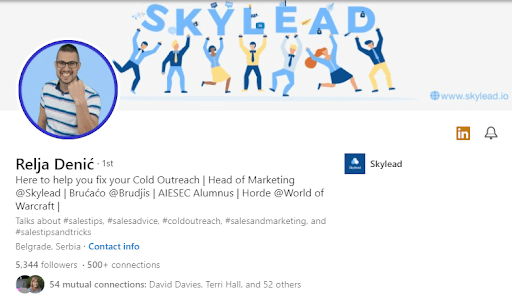
2. Extend your LinkedIn network
As a thought leader, you would want your content to be seen and heard by others, right? That is why the first advice is to extend your social media networks as much as possible and add the right ideal customer profiles at that.
As LinkedIn is the No1 B2B social media network, use it as a base and build other socials around it. You can extend your network by adding second or third connections. The more connections you have, the more you will be able to add other people since the base of the second and third connections will be enriched.
When you send out LinkedIn connection message requests, pay close attention to the note you are sending. Take time to personalize it as this is a crucial step in building the relationship. There are a couple of things you can use here:
- Mention mutual contacts
- Refer to their content piece
- Emphasize the post you both commented
- Mention mutual interests, events you attended, or experiences
Overall, try to form a connection by offering genuine conversation starters.
An example would be:
Hey Stephany,
I’ve noticed that we both attended the “How to define lead generation strategy in 2022” webinar. I saw your awesome profile and wanted to connect and share thoughts and experiences.
You can send connection requests by yourself or you can use a LinkedIn Automation & Cold Email Software such as Skylead to do all the work for you. Here is what a simple, smart sequence for an invite to connect looks like in Skylead:
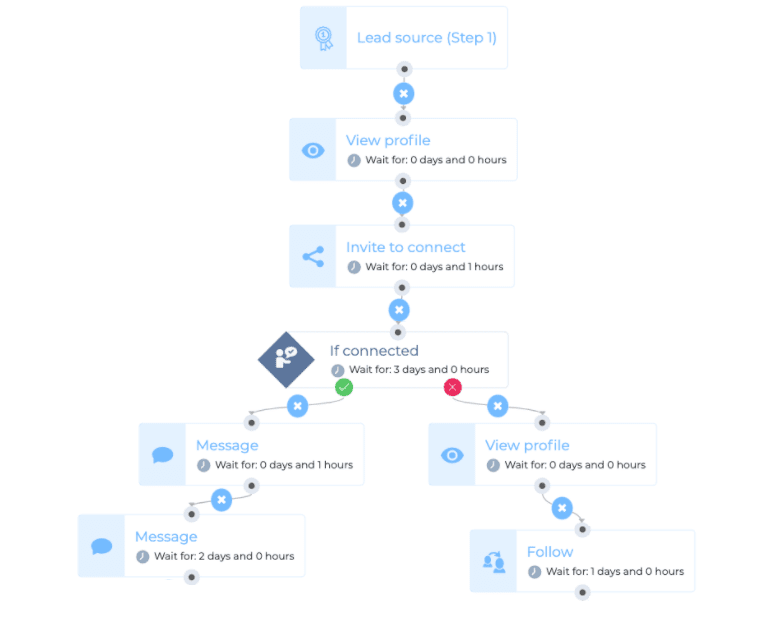
Be sure to check out the DOs and DON’Ts of LinkedIn networking.
3. Build your credibility
Your company has an established brand and credibility on social media. For social selling, you need to do the same. You can build and develop credibility and personal brand with each post, share, comment, or discussion on Social Media.
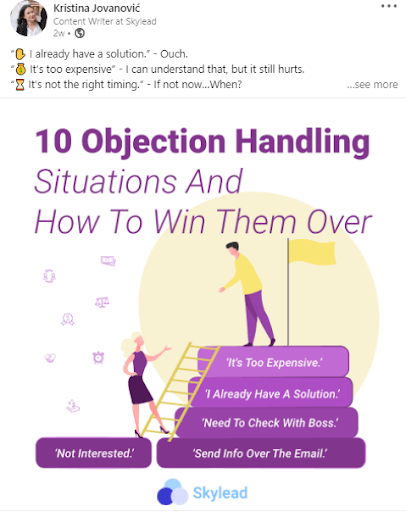
This way, you can showcase your involvement in the industry, demonstrate your expertise and offer value to your prospects. Share your insights, case studies, and success stories. The key here is to be consistent and never to forget to stay active. Always be providing value.
Additional tip: A great conversation starter is to see who liked your post, scrape the data, send them a message and ask for their two cents on the matter.
Example:
Hey John,
I’ve noticed you liked my post on objection handling situations. I was wondering what your experience is in that matter. What objection did you come across the most?
You can also build your credibility by asking for recommendations or endorsements from your network, be it your colleagues or people from the same industry.
4. Participating & engaging in groups
Another way to reach a wider audience is mingling in various social media groups, and the ones outside them, for example Slack or web-based groups, such as GrowthHacker and IndieHackers.
All you need to do is research the groups on every social media channel you use and join them. Once accepted, you can share your posts, chat with other members and find your ICP there.
This relationship that you’ve formed with relevant prospects through groups is an important step for nurturing them as prospects and warming them up. You can start with sharing valuable content, and then introduce them with your product or service, product launches.
On LinkedIn and Facebook, you can search groups easily with keyword search and group filter, whilst Slack groups are a bit harder to find, meaning you would need to Google them. LinkedIn has a vast base of groups, but keep in mind that only some groups on LinkedIn are active, and niche ones at that. Other LinkedIn groups are not active at all.
If you have something to contribute to the group, and you see how you can genuinely interest someone in your product, by all means, do so, but do not copy/paste salesy comments that have no context to the post or prospect’s comment alone. It will only irritate other members. Progress in the conversation in a more natural, push-free way.
5. Researching the prospects
When you handpick a prospect to reach out to, and go all social selling on him, stop and prepare. You need to do the research beforehand.
Social media channels alone are a great way to find out more about someone’s interests, work, and hobbies, so use them. See what they are:
- Reading,
- Sharing,
- What they value most,
- What their thoughts and feelings are.
For example, you can use Twitter to find out about their feelings and trending topics they casually talk about, Facebook for their interest, and LinkedIn for their work. Once you find the necessary information, write it down, and create a personalized outreach based on it, to start building a relationship.
Example:
Hey Mike,
I noticed you openly talked about how patience and long-term planning are crucial for employee retention. Cheers for that, I agree completely. What would you say if I told you that both patience and long-term vision could be easily transferred to employees, so they stay in the company longer?
6. Engage to nurture prospects
If creating content is not your virtue, fear not. If we talk about social selling, one of the main activities, besides publishing your posts, is liking, commenting, and sharing other people’s content.
Pay attention to what others are saying. If you have anything to say, comment and engage with your ICP. Be observant - read, listen, and always keep learning since this will give you greater opportunities to approach your leads, build relationships and nurture them. Your daily social selling activity should be liking, sharing, or commenting on your ICP’s post. When you engage like this, the prospect will see that you are interested in them and be more open to continuing the conversation with you.
7. Nurture existing customers
If we talk about social selling, we simply cannot neglect the existing customers. According to European Business Review, acquiring new customers is five times more expensive than keeping the existing one. After all, existing customers are essential for your customer lifetime value.
The happier and more engaged your existing customers are, the more chances you will get to upsell them and retain them, not to mention the higher the average lifetime value is. Even though they are now in the customer success realm, you as a salesperson cannot forget them because of it, so it is important to engage with them every now and then. Since sales folk have a lot on their plate, they still need to choose where to focus their efforts. That’s where individual customer lifetime value comes into play and analyzing whether the extra action is needed.

8. Keep it real - Create relationships not pushing sales
If we hadn’t emphasized enough so far, let’s do it again - build relationships instead of solely trying to sell. Not a single soul likes being sold something, as everyone ends up feeling manipulated, to say the least. Check it yourself - wouldn’t you feel this way?
Instead, ask what they do, gain full interest in it, make a conversation, and joke here and there, naturally as a human conversation goes when you first meet someone. Be a real person before pitching. Whether you have the best service or a product out there, your job as a sales rep is to make relationships first.
Social selling experts say that even throughout making a relationship you constantly need to provide value to someone to prove your expertise and that is the key to gaining their trust.
After you establish this, listen carefully to what their pain points are and reply to their exact problem. How? With a tailor-made response to present your product.
In addition, if you are not the best fit, be real with yourself, let it be, and move on to find a better ICP.
9. Personalize with GIFs and images
Even though it still isn’t a popularized approach, it always works. Finding the perfect GIF or image and putting your face on it with a custom message will make the prospects loosen up and make them like you even more.
Here is an example of how you can personalize your GIFs and Images in Skylead.

10. Keep it real, but enjoy the process
Social selling is about mingling with people, hearing their stories, learning about new experiences and trends. Remember, people come to social media to relax and escape boredom. They always want to see nice things or interesting videos. So to stay on top and succeed, you need to follow it. This means sharing witty posts or videos from time to time. Find your unique voice in the sea of posts and develop your personal brand.
The key here is to have fun, enjoy interacting with people and build an audience that will remain loyal to your brand.
Summary
Sales really did go far from the old ways, and social selling was a natural evolution step as opposed to a pushy, one-dimension approach. That means things got a bit complicated, but more fun. Here are all the tips formed in one checklist:
1. Optimize social media profiles for Social Selling
2. Extend your LinkedIn network
3. Build your credibility
4. Participating & engaging in groups
5. Researching the prospects
6. Engage to nurture prospects
7. Nurture existing customers
8. Keep it real - Create relationships not pushing sales
9. Personalize with GIFs and images
10. Keep it real, but enjoy the process
When executed together, these tips can improve your sales. You just need to keep in mind that all of the above won’t help you if you do not change your mindset. Empathy is everything and the key to successful social selling. If you do not genuinely care and do not wish to help others, all the battles are lost.
Prepare - the next step is drawing out a social selling strategy, for which we will create another blog post soon.
Wish to personalize your approach and automate a part of your social selling tasks? Check out Skylead and enjoy the ride.
2020 and 2021 were the years that baffled all of us. It was like playing a B2B sales outreach card game.
You are sitting in the darkroom, at the round green table. Across from it, there is your competitor, sweating just as much, trying to keep a straight face. Prize? Leads. A handful of them. Card after card, it appears you have rotten luck. As your coin pile gets smaller, you wonder how you can make a fortune smile at you.
If you missed your opportunity to keep up with the market changes in 2021, here comes another chance. Let’s go through the key tips that can be your aces in a sleeve to stay on top of your B2B Sales outreach game.

How has B2B sales changed over time?
In the past, the B2B sales process was pretty simple. A company would recognize the need, identify a solution through Word of Mouth, and contact one or more providers. After a couple of meetings, the deal would be made.
But in recent years and globalization dramatically entering through the big door and competition getting wider, the providers were left riddled about which approach to use to get a bigger piece of the market cake. A vast number of opportunities opened up: the importance of the company’s content, review websites, social media, or paid ads all flooded the world, which made jobs harder not only for the providers but for clients, as well.
Overwhelmed, clients were getting more suspicious of services’ credibility that they decided to do the research themselves. This ultimately decreased SDR’s opportunity to influence the client's decision.
According to TrustRadius, 78% of B2B buyers are spending equal or more time researching the product or service by themselves.
Outcome and changes
Consequently, the idea of sales and marketing merging and working together became a priority task for the companies and ultimate sales strategy.
Another considerable change that globalization and 2020 events brought to the table is the importance of remote communication itself, thus online meeting software usage, such as Zoom or Google Meet skyrocketed. This made it easier for clients to meet with providers without wasting time.
On the other hand, providers finally got the chance to improve their conversion tracking, but the sales team had the new challenge at hand: improving presentation skills for online time-limited meetings to listen to pain points, showcase personalized benefits and install confidence and expertise in prospects.
So with the new 2022 just getting started, we have yet to see the new B2B sales trends develop. Alas, due to recent changes, some ways to master your sales outreach are here to stay, so let’s get through all of them.
#1 Social selling in B2B sales outreach: The new normal
Assertive selling methods are long out of the picture, thanks to Social Selling. As a new way of the sales strategy, social selling requires narrowing down the niche prospects and developing relationships first, before leading them further down the sales funnel. Developing the relationship will allow you to place the idea into your prospects’ heads and nurture it throughout the buying experience steps.
Today Social selling often takes place via social media channels such as LinkedIn. For example, LinkedIn established a Social Selling Index in which users with higher SSI are better positioned to make new lead connections, and therefore more likely to succeed in closing the deal. Consequently, many SDRs' main mission was to improve their Social Selling Index (LinkedIn SSI score).
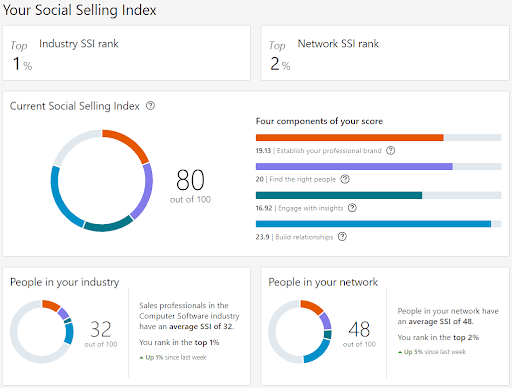
Social selling is a delicate business, and it took sales teams a while to wrap their heads around it. As time passed by, it proved to be effective, so in 2022 social selling is a must for your sales strategy to stay on top.
#2 Understand where your leads came from
It’s 2022, and it is high time to step up your lead organization game. This is where CRM comes in handy. By inserting all the lead information in one place, you will be able to categorize them later on, depending on where they came from. Why? Because the way you engage with them should be different based on where they originated from to personalize their buying experience.
There are no one-size-fits-all categorizations, but the ones that we found useful are:
1. Hand raisers
Hand Raisers are the leads that have reached out to support or schedule a demo via the website. They already know who you are and are halfway to the conversion, which makes your sales approach easier.
2. Custom leads list
Custom leads were found and added to the system manually by an SDR. These leads can be sourced from personal connections on LinkedIn, Sales Navigator Search, or scraped elsewhere online. With this categorization, you can narrow it further by industry, pain point, and so on to further personalize your cold outreach.
3. Educatees
Educatees are the prospects who downloaded some sort of educational material from your website or signed up for a webinar and left contact information for it. Extra attention is needed here as not all of them are your niche leads, so you need to segment them carefully.
4. Lead warmth
One of the simplest ways to categorize your leads is by warmth. Some may be further down the sales funnel than others, and some might not have that much interest as others.
- Cold Lead - Prospects that are right at the beginning of the sales funnel or have little to no interest in engaging with SDRs.
- Warm Lead - Warm leads have expressed some interest in speaking to or needing your company by perhaps contacting customer support via chat or contacting you via Social Media channels. Alas they are not ready for a conversation with an SDR. This lead will typically need a nurturing campaign or direct assistance to move further down the funnel.
- Hot Lead - These leads explicitly said they’re ready to speak to your company or are asking a lot of questions to support this claim.
The good thing about categorization is that you can use one system or combine them to further personalize your approach. All in all, with lead categorization and labeling, you’ll be able to track your KPIs better, understand your LinkedIn lead generation activities, what leads to lead conversion and know what works best and where you should change your approach.
#3 Use video format
As what feels like an everlasting trend, video format continues to amaze with its effectiveness in 2021, not only in marketing but also as a sales strategy. So in 2022, leverage video and step away from long texts to demonstrate the value of your product or service.
According to Wyzowl’s research, 84% of people say they’ve been convinced to buy a product or service by watching a brand’s video.
A brief video can show prospects how the product is used, showcase benefits, short reviews, and set the tone for your sales pitch better than a text format. Incorporating videos into your B2B sales will increase engagement and lead to more sales.
Current trends show that animated explainer videos are a perfect way to demonstrate your product or service, features, and benefits. What’s great about the video format is that it can be used at all stages of the sales funnel.
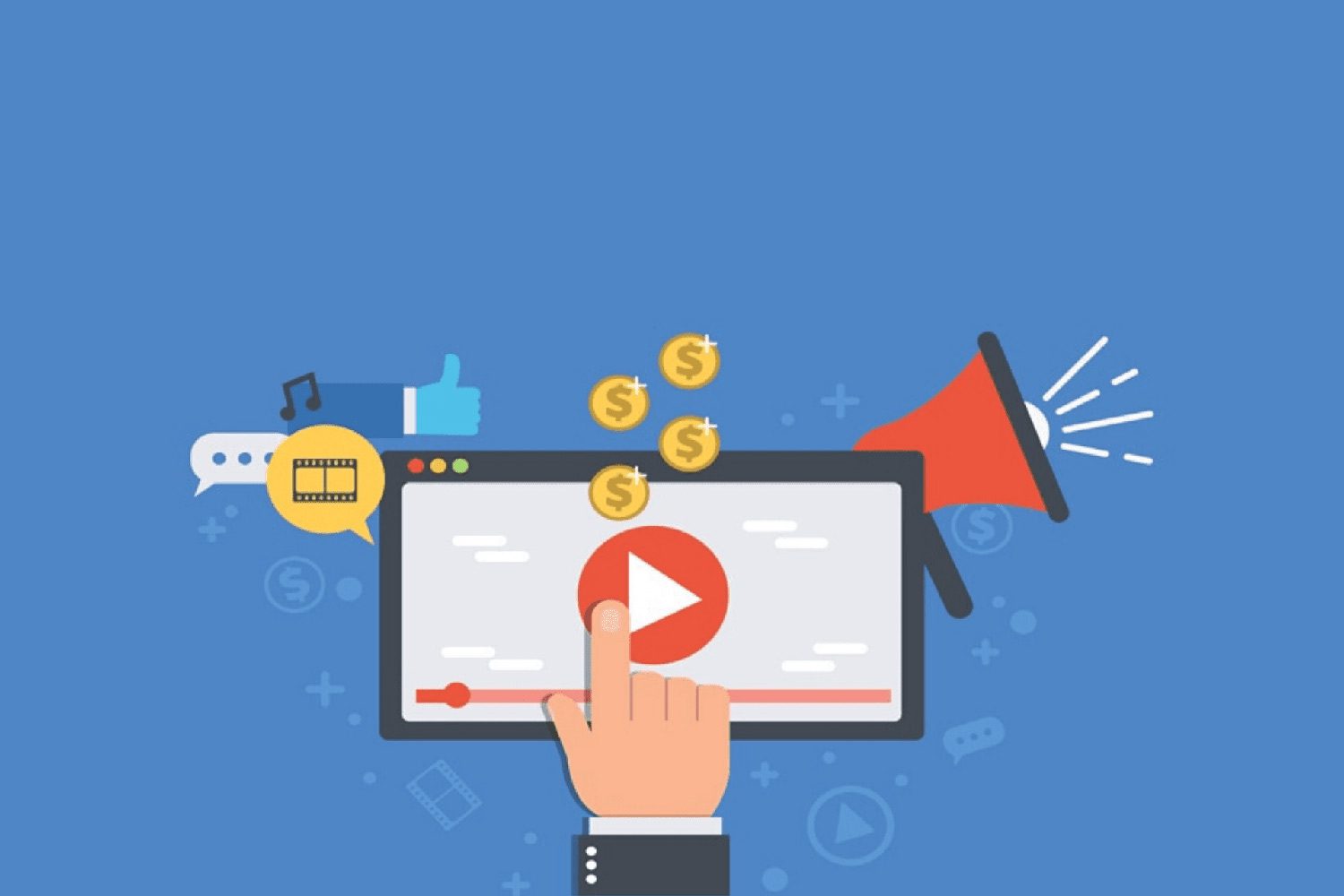
In addition, videos help the B2B prospect to organically conclude that your product suits them best on their own. It builds trust, especially in cold leads, and fosters further education.
#4 Build trust through education
The world has changed. As we mentioned, it's important that you nurture relationships and build trust with your leads, and one of the great ways to do that is through education.
Think about the content the marketing team produces. Mark them for the sales strategy, and use blogs, webinars, whitepapers, or videos to help educate your prospect on what your organization offers.
Remember when we talked about Social Selling? This is one way to do it. If you help to educate them first, guide them towards your solution, and enable them to make their own decisions, they will begin to trust you. Once you gain the trust, you will nurture a relationship to conversion with more ease.
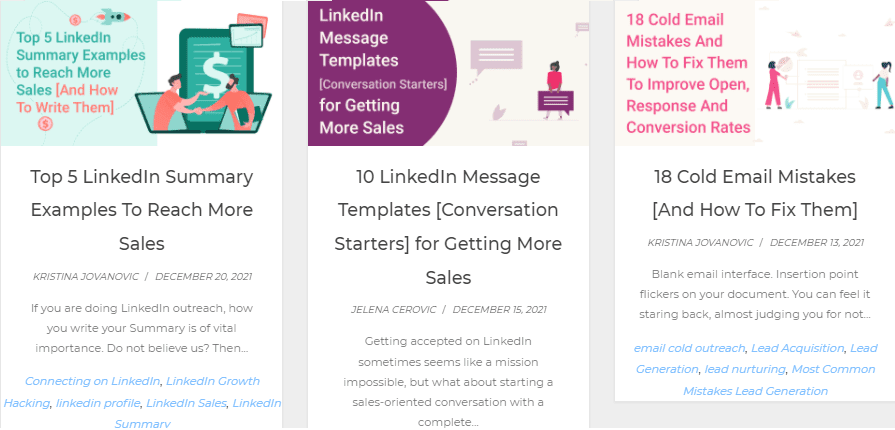
To get the most out of your educational outreach, personalize it further. Instead of sending an entire blog or webinar by itself, take a quote from them, and send them a linked snippet. Trust us, they will be grateful, and the percentage of objections will be by far decreased.
#5 Update the B2B sales outreach process
In recent years, one of the most popular business mantras you could find was to work smarter, not harder. This meant finding alternative ways to simplify the process while getting the best of it and easily scaling it up. This formula was to be applied to the B2B sales process, as well.
But how were people able to do it? What is their Sales strategy? They implemented sales engagement tools.
With the rise of LinkedIn as the most effective way to find B2B leads, along came various tools to help your LinkedIn outreach out, so you can invest the time in more important matters, such as nurturing your leads to conversion. It allows your sales creativity to bloom, delegates and routine tasks to the software itself.
How to master your sales outreach with it?
1. Multichannel approach:
Some sales engagement tools allow you to use a multichannel approach. This means that several channels are working in synchronicity to maximize sales efficiency. Therefore, you can reach your prospects via multiple channels, such as LinkedIn and email. After all, the multichannel approach does bring the best results to the table.
2. Sequences:
If the Multichannel approach is a strategy, then sequences can be the means by which you achieve it. Smart sequences are the future of lead generation, as you can combine different actions in one campaign, define the time delay between them, and send it out to the prospect. The tool will follow the steps and send out outreach you’ve prepared, so you need not worry if some steps slipped between the cracks.
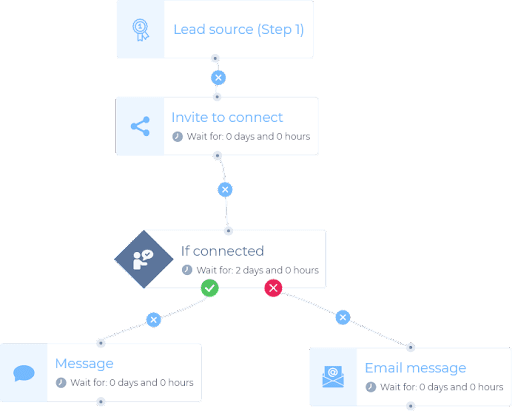
3. Personalization at scale:
Another trend in the B2B sales process became personalization. You need to get as personal as you can with your leads, mentioning their name, interest or company to develop a relationship, show that you care for them, and wish to solve their issue. Naturally, sales engagement tools became a smarter and easier choice to personalize your cold outreach at scale.
To quote Daft Punk with the twist:
“Work it smarter, make it better, do it faster, make it stronger.”
In conclusion
B2B sales outreach is ever-changing, and it always will be. That is why you need to stay on top of trends and best practices to stay in the game.
There are still many paths to follow to master your B2B sales outreach, but the core ones are:
- Update The Sales Process
- Improve Social Selling
- Understand Where Your Leads Came From
- Use Video Format
- Build Trust Through Education
You don’t have to implement every tip that we mentioned. Choose the one, A/B test it, and then apply which one works best for you. Own it, win it!
Let’s win 2022 together! Check out Skylead, a LinkedIn Automation & Cold Email Software that thinks for you and try it out for free.
Multichannel outreach implies using different channels to get in touch, connect, and engage with your target leads.
First and foremost, it is important to find out what platform your prospects prefer to use when interacting with other brands and businesses.
Clarifying your message and communicating it in the way your leads want to hear it will make them interested in finding out more and potentially doing business with you.
As it turns out, the multichannel outreach obtains the best results.
However, have in mind the importance of seamlessly integrating different channels of communication for an optimal outcome.
Advice for a more effective multichannel outreach:
- Focus on at least 2-3 channels;
- Create personalized outreach messages;
- Set up reasonable time between sending them;
- Analyze results and stay with the strategy or change it.
What are the benefits of a multichannel outreach?
A well-planned multichannel outreach campaign will bring brand awareness, lead generation, and conversion. Also:
Your lead will not feel like some mistargeted recipient

The best case practice is to do the prospecting on LinkedIn well and know what kind of approach or content will most likely draw their attention of your target audience. Have in mind that you are the one required to know your prospects' preferences and communicate them in an authentic and trustworthy way.
Customers that notice that you “have done your homework” and reached out to them on their preferred channel will perceive you as loyal and forward-thinking. Additionally, if you share targeted content (as you should be doing) you are giving your leads an extra opportunity to engage valuable information.
Excuses, excuses!
Exactly, no more excuses!

Let’s say you choose to reach out through LinkedIn, but your lead does not answer for whatever reason. You always have the option of sending a follow-up Email and checking up on your prospect.
Maybe they did not see the first message. Or LinkedIn is not their preferred platform. Have you ever thought that their LinkedIn or Email is overloaded and therefore it makes it hard for you to get noticed among numerous messages? The reasons are infinite.
Skylead, for example, has LinkedIn Messages, Emails, and LinkedIn InMails integrated and at your disposal at any time. The additional benefit lies in the automated messaging stopping at each platform the moment the lead answers. You have the option of replying manually or getting the prospect back to the campaign.
Furthermore, Skylead has an advantage of an all-in-one-place chat room filtrable by the campaign and conversation independently from the channel you used. No need to log in and out of a LinkedIn account, Sales Navigator, or Email Inbox to manage different conversations, just switch from one lead to another and see where you stand.
By knowing their interests you will conquer their hearts
Using different channels allows you to get to know your leads’ habits, interests, and preferences. Sending targeted content via messages, Emails, LinkedIn InMails, or other channels, such as social media, will increase customer engagement and conversion rates.
Why is customer engagement so important, you might wonder.
Let’s say you publish a post on LinkedIn and lots of people comment, share, or like it. Thanks to Skylead’s “Post Engagement” campaign, where just by copying the URL of the post, you can collect the available leads’ data and connect to those interested in this type of content. Every now and then take some time to send out similar material via Email or LinkedIn messages. Feed your prospects’ interests.
By building this kind of relationship, your clients will feel loyal to your business. Therefore they will be more prone to purchase from you than from your competitors. There is nothing more valuable than conquering your prospects’ loyalty and keeping your brand on top of their minds. And that's part of generating leads on LinkedIn or via email done right.

Patience, patience, please!
Multichannel Outreach is especially useful if you are a small business and don’t have many resources to invest in advertising. The multichannel approach allows you to broaden your reach to an enviable number of clients with little or no extra cost.
If you are a small business indeed, here is an extra tip to make your outreach campaigns stand out.
Think about some creative ways to draw attention to your product/service and make your outreach fun, easy, and moving! Check out Skylead’s Image and GIF hyper-personalization feature and let your creativity flow.
Analyze and adapt
By reaching out through multiple channels you get the chance to analyze which one of them brings the best results and if they interfere with each other in any way. You will easily spot where you need to make improvements or maybe even consider removing a channel that continuously underperforms.
Extra tip: Whatever channel (or more) you opt for, make reasonable time in between messages. You don’t want your leads to know that you are using an automation tool or bombard them with content and make them mark you as a spammer.
Are you tired of having to sign up to different platforms and then merge them for a successful sales engagement?
Do you get headaches from rarely being sure what step you are at and what your next move should be?
How often do you wish there was one Sales Engagement Software that already has all the necessary features for successful and smoothly operating campaigns?
Well, there is!

Let us show you how Skylead replaces multiple different tools and generates and nurtures leads while saving you time and money.
1. Email outreach feature
Unless you use a Sales Engagement Tool that is as versatile as Skylead, you will most likely need to go through different steps before starting a campaign. Down below we will present different types of platforms as necessary stages to complete the process of outreach.
1a. Phantombuster (Growth Hacker Package, $30/month) + Hunter.io ($49/month) + NeverBounce ($10/month) + lemlist ($59/month) = $148/month
The flow would go as follows:
- Sales Navigator Search
- Paste URL to Phantombuster
- Paste results into a downloadable CSV file
- Subscribe to Hunter.io and upload CSV file to scrape emails
- Upload CSV file to NeverBounce to verify emails
- Send emails through lemlist or any other outreach tool of this kind.
1b. Skylead’s All-in-one plan ($100/month)
With Skylead, not only do you have an Email Discovery Feature, that finds and verifies business email addresses, incorporated but you also need just an URL from LinkedIn Search/Sales Navigator Search to obtain all the necessary data for personalizing your outreach. You have an option of running a campaign through Emails, LinkedIn Messages, and LinkedIn InMails.
2. LinkedIn outreach via image and GIF hyper personalization feature
The majority of Sales Engagement Tools outsources the Image and GIF hyper personalization feature, while Skylead has it integrated.
2a. Expandi ($99/month) + Hyperise ($99/month) = $198/month
Expandi outsources Image and GIF hyper personalization feature to Hyperise that is limited to 10 templates and 10 000 impressions (counted each time an image is viewed).
2b. Skylead’s All-in-one plan ($100/month)
Skylead’s Image and GIF personalization feature offers an unlimited number of templates and impressions as part of its All-in-one plan.

3. Multichannel outreach
3a. Lemlist ($148) + Expandi & Hiperise ($198/month) + Zapier ($39/month) = $385/month
When you use multiple different tools for your outreach, you will need a software, such as Zapier, or any other of its kind, to “glue” them together. This will allow you the Multichannel Outreach and the Image and GIF hyper personalization feature.
3b. Skylead’s All-in-one plan ($100/month)
LinkedIn Messages, InMails, Emails, and Image and GIF hyper personalization feature are all incorporated into Skylead’s All-in-one package.
Plus, have you heard of Skylead’s Smart Sequences?
Skylead’s Smart Sequences are groundbreaking algorithms that allow you to use Multichannel Outreach and personalization to its maximum potential.
Due to the newest LinkedIn restrictions, Smart Sequences are actually the only effective way of generating leads on LinkedIn and via email. They combine LinkedIn features (LinkedIn InMails, Connection Requests, Messages, Follow) with Emails (found and verified by Skylead) and create the highest possible number of personalized touchpoints with your Prospects.
While the old Skylead’s predefined threads are still available, now you have the option of making an entire branch of steps and operations the way you think it will work best for your business goals.
Find out more about it here.

As far as an Email Discovery feature is concerned…
Skylead can discover emails in two ways - either collect the already existing email from the profile when connected with the lead, or discover and verify an email before connecting to the prospect or engaging with him/her in any way.
If you opt to reach via email by doing the search on LinkedIn or Sales Navigator, all you need to do is copy/paste the URL (once you finish prospecting on LinkedIn or other LinkedIn solutions) and use the following procedure:
- For 1st degree connections on LinkedIn - first “View Profile” step and then “Send Email”;
- For 2nd degree connections on LinkedIn - first “Send Request” step to connect and then “Send Email”.
If you opt for a campaign by importing a CSV file, Skylead only requires your document to have a column named “email” (lower case!). You can start an email sequence right away.
With other tools, you either need to collect emails manually or choose to reach out via LinkedIn and then email them as a follow-up. Skylead gives you the option to launch a campaign on LinkedIn and through Email at the same time. Basically, “Email Step” is part of the sequence.
4. Outreach to leads interested in a certain topic
Let’s say you would like to reach out to all people who liked or commented on a post/any type of published material on LinkedIn.
4a. Other tools
The flow would go as follows:
- Phantombuster Post Likers first scrapes names of the people who liked the post and their LinkedIn URLs
- LinkedIn Profile Scraper extracts their names, professions, contacts etc
- Paste results into a downloadable CSV file
- Subscribe to Hunter.io and upload CSV file to scrape emails
- Upload CSV file to NeverBounce to verify emails
- Send emails through lemlist or any other outreach tool of this kind.
4b. Skylead
- Take URL and post it to the “Post Engagement” campaign type, then:
- For 1st degree connections on LinkedIn - first “View Profile” step and then “Send Email”;
- For 2nd degree connections on LinkedIn - first “Send Request” step to connect and then “Send Email”.
Have you noticed how everything with Skylead is just so much easier?
As I said, one tool to rule them all, indeed!
Explore all the benefits that Skylead offers by contacting our customer support team. Discuss how you can make the most out of our product and find out how you can benefit from Skylead the most.
Skylead’s Smart Sequences are groundbreaking algorithms that allow you to use multichannel outreach and personalization to its maximum potential.
Following the trends of LinkedIn’s newest restrictions and changes in their policy and with Lead Generation moving to other channels (such as Email for example), Skylead’s Smart Sequences are undoubtedly the most innovative and exhaustive path to reaching your Prospects and increasing conversion rate.
Not only.
Due to the previously mentioned LinkedIn restrictions, Smart Sequences are actually the only effective way of generating and nurturing Leads. They combine LinkedIn features (LinkedIn InMails, Connection Requests, Messages, Follow) with Emails (found and verified by Skylead) and create the highest possible number of personalized touchpoints with your Prospects.
As you may see, Smart Sequences bring the Lead Engagement Process to a whole new level.
Possibilities. Yes. So many possibilities!

Before introducing Smart Sequences, your options were, more or less, limited to predefined threads.
Now you have the possibility to combine the same features and operations you had before (and some new ones) in an unimaginable number of ways. That means using the potential of every channel to its maximum, within the safe limit range.
While the old predefined threads are still available, now you have the option of making an entire branch of steps and operations the way you think it will work best for your business goals.
Consequently, just when you thought your communication cannot get any more humanized, Smart Sequences give you a Super-duper-hyper-personalized outreach!
Let’s see how it all looks in practice.
Smart Sequence N1 (The Simple One)
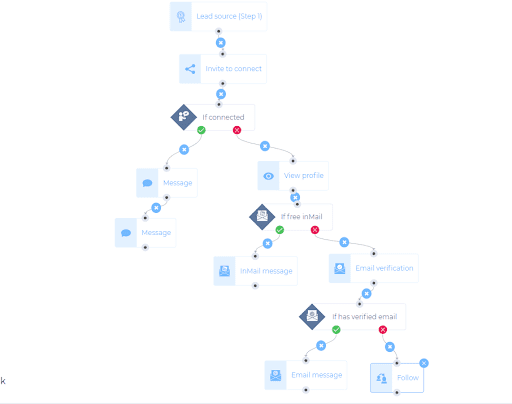
As you may see from the algorithm’s diagram, after the Email Verification step, this Smart Sequence is set up for several options.
In case Skylead discovers and verifies the Prospect’s Email, we can continue our communication through the email channel. If not, the sequence will proceed with the Connection Request. If the Prospect accepts it, the LinkedIn branch of communication will send a Message, and if not, there is always the option of Following the Lead just as a subtle reminder to our attempt to connect.
Email Verification Step
Skylead will try to find and verify Business Emails from your list of Prospects BEFORE connecting with them. The success rate varies between 20 to 40% which is 500 to 1000 valid Business Emails from one Sales Navigator Search that generated around 2500 prospects.

Smart Sequence N2 (The Post Engagement Campaign)
NOTE: It has been proven that Post Engagement Campaigns have been extremely successful when it comes to acceptance and response rate (ranging between 75-90%). They are an excellent ice-breaker, as you start your conversation with Prospects with a topic, interest, or connection that you have in common.
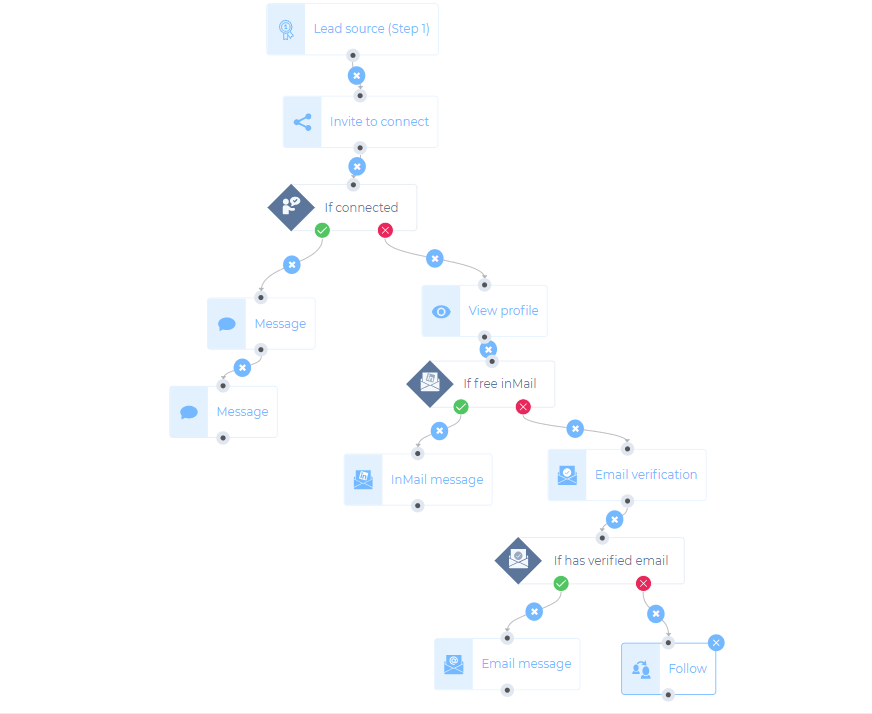
As you may see from the algorithm’s diagram, after the Connection Request, this Smart Sequence is set up for several options.
The thread will check if the Prospect’s profile is open to Free InMails. If yes, the right branch of our Smart Sequence will proceed in that direction and send InMail #1, and then InMail #2 (a follow-up).
If not, the Smart Sequence will change its direction and try to discover and verify the Lead’s Email. In case the Prospect’s Email is available, the thread will reach out through this channel. If not, it will just Follow the Lead as a “final” reminder of our attempt to connect.

Smart Sequence N3 (The Complex Sequence)
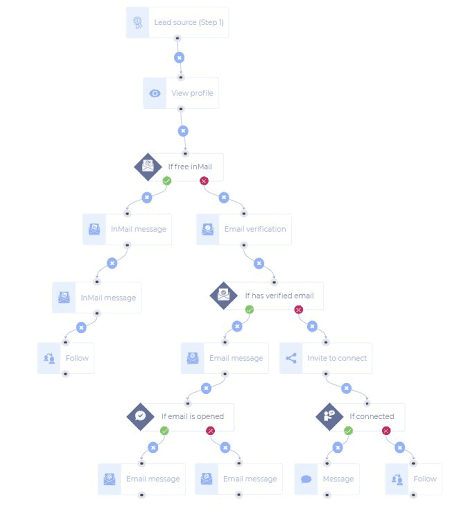
This Sequence is interesting as it diminishes the need for Connection Requests by using other personalizable channels.
First, the sequence will check if the lead's account is open to InMails (leads you found by prospecting on LinkedIn). If yes, it will continue with this option. Have in mind that with Skylead, you can send up to 800 Free InMails a month.
Secondly, if the Prospect’s account is not open to InMails, the sequence will proceed with discovering and verifying Emails. Skylead can generate thousands of emails a month just by using information available on Linkedin, which permits so many additional personalized touchpoints with your Leads.
In case neither Email nor InMail is available, the sequence will proceed with a Connection Request.

Wanna see how easy it is to make a Smart Sequence?
All you need to do is choose between elements (InMail, Email, Message, etc.) and conditions (If Email Verified, If Open to InMails, etc.) on your right and drag them to your left to create the flow.
For each element that requires text, you have the option of inserting it immediately and use all of the available tags. You also get to decide how much time you want it to pass between sending that particular InMail, Email, Message and the step before. The same option applies to conditions.
As simple as this. Take a look.
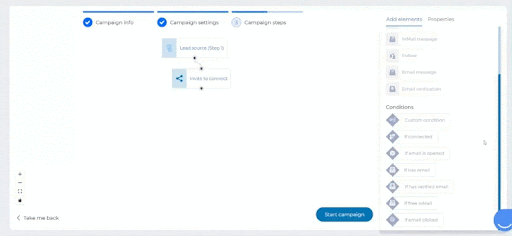
Image and GIF Hyper-Personalization Tool
Image and GIF Hyper-personalization tool is a flexible and unique feature that Skylead puts at your disposal. It is perfectly compatible with LinkedIn messages, InMails, and Emails used for building Smart Sequences.
Image and GIF Hyper-personalization tool works outstandingly when it comes to distinguishing yourself from the competition and creating a surprise factor thanks to its unconventional way of communicating what you have to say.
Due to its hyper-personalized copy and the visual effect, it is hard that it will leave any of your Leads indifferent.
Check out more about it here.
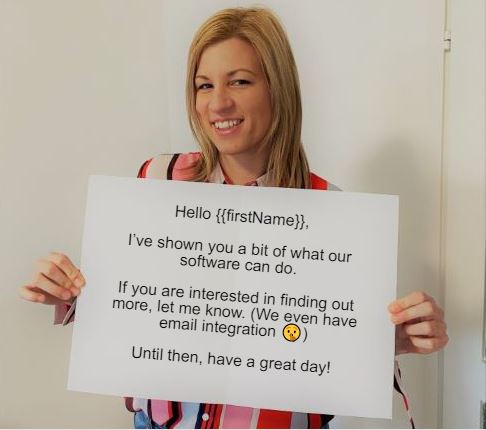
Why Multichannel Outreach?
Because a Multichannel Outreach increases the response rate by least 17%!
Is that reason not good enough for you or what?!?
Also, not only does it offer a plethora of features such as LinkedIn Messages, LinkedIn InMails, and Emails, but now it gives you the freedom to combine channels, operations, and build your threads. In other words, you are not limited to generating leads on LinkedIn only. So, go wild!
And don’t be afraid of LinkedIn jail and restriction or that your Emails will finish in your Prospects’ Spam folder. Skylead has your back. We always monitor your campaigns and make sure that they stay within safe limits.
That’s right! You are safely hyper-humanizing communication with your Leads while being fully protected.

What is hyper personalization and why is it so important nowadays?
Explained in a simplified way, hyper-personalization is the use of data to ensure more targeted and meaningful interactions with customers that lead to delivering relevant content, products, and service information to each user.
In a world where automation started to result in generic and impersonal outreach, personalization helps you differentiate from your competitors and connect to your future leads and/or clients on a higher level.
That being said, Skylead goes far beyond mere automation software. It takes personalized marketing a step further and helps humanize one-to-one communication.
Wanna know how?
1. Define who you are trying to communicate with.
Targeting is the first and most crucial step of every personalized outreach, LinkedIn lead generation, and finally a successful campaign.
Skylead is no exception to that rule.
So, define your audience to start with!
LinkedIn, Sales Navigator and Recruiter give you a rather convenient option for filtering your potential leads and perform prospecting on LinkedIn. You can do it by any keyword, geography, postal code, first and/or last name, school, seniority level, years of experience, etc.
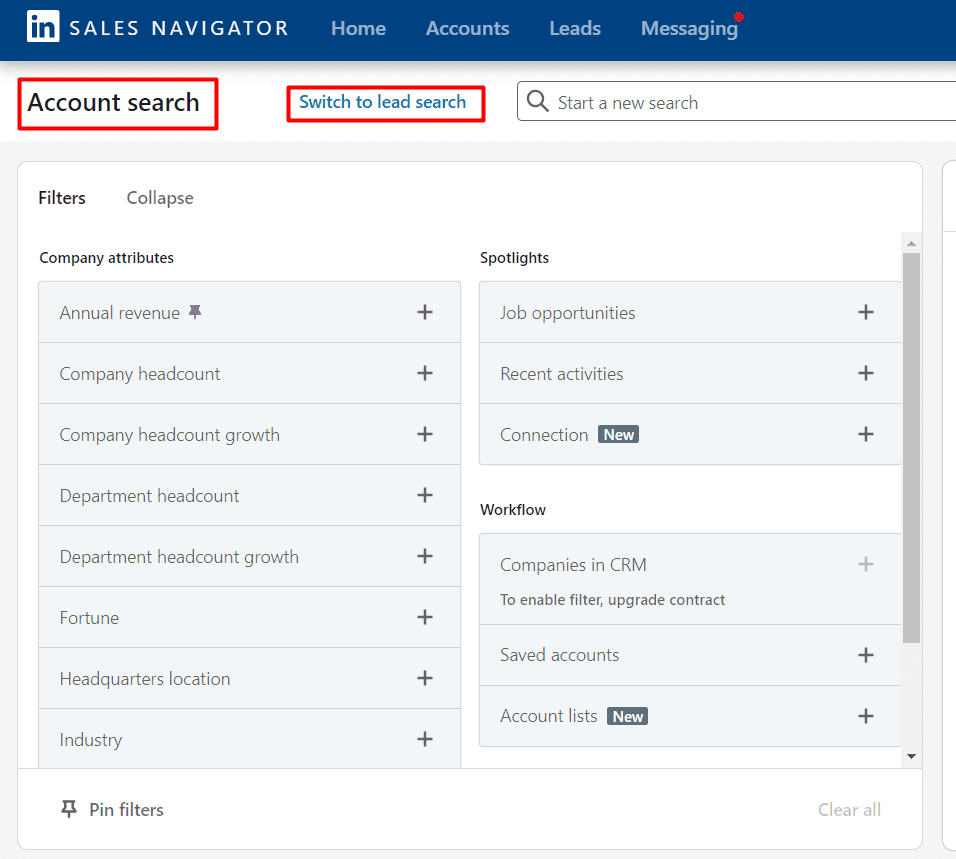
However, there is more to it!
Let’s say you have your private lists of contacts and their email addresses and/or LinkedIn profile URLs. These people are your target group and you want to take advantage of the existing files.
No problem!
Skylead supports importing CSV documents and it automatically extracts all the necessary information for your campaigns.
Voilà!
No need to insert that super long list of names and other info manually!
2. Now use Skylead to conquer that personalized mass outreach!
Once you have identified or imported your target audience, it’s time to choose among numerous variables and personalize the first wave of your mass targeted outreach.
How do you do that?
There are 8 basic variables to insert and combine in your messages:
- First name;
- Last name;
- Current company;
- Years in the current company;
- Total Career Position Count;
- Position;
- Total career years;
- College name.
However, if your CSV document contains extra data on your leads, use them as custom variables when reaching out.
You write out a message, insert basic or custom variables where you need them, and information gets automatically pulled from the selected accounts/CSV files.
In case some of them are not available, there is an option of manually filling in the replacement.
See? We have a solution for everything!
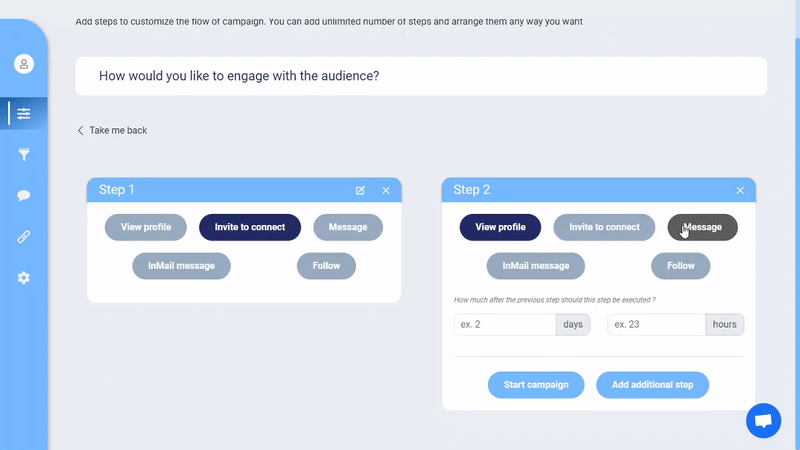
3. New emailing feature alert! New emailing feature alert!
Aside from sending connection requests with personalized messages, follow-ups, LinkedIn InMails, Skylead now has the option of reaching out by email in case your contacts don’t reply on LinkedIn!
You can run, but you cannot hide!
Set up one email template, personalize it like you would have done it with LinkedIn messages and InMails, and just like that create workflows for different scenarios!
Plus, if you don’t have your target audience’s emails, thanks to Skylead’s Discovering Emails Feature, there is always an option of automatically extracting their emails and building your own extensive contact list of potential clients.
Let’s sum it up for a moment.
Now you have the option to:
- Discover business emails and collect personal ones;
- Send follow-ups via email;
- Keep in touch with leads and keep them updated via emails;
- Use our Image and GIF personalization feature for fun occasions – wish them a happy holiday season, birthdays, anniversaries, and so on.
4. Unless you want to be taken for a creeper, timing is everything!
Whether you are reaching out to your clients for the first time or you are following up with them, set up a reasonable time in between messages. Not only will it give the impression of manually-performed communication, but you won’t seem pushy and obnoxious. You want your future leads to confide in you and your product/service, not to try running away from it as far as possible.
Extra tip!
Pay attention to your and your client's time zone, work hours, holidays, and similar. It will give that extra touch of manually-performed communication.
Fortunately for you, all of this can be automated on Skylead. Several clicks and you won’t need to keep track of it on the side.


5. Stand out with Image and GIF hyper personalization.
Are you in a creative business? Or do you just want to spice it up and break the monotony of the dull, old-fashioned messaging?
If yes, we, of course, have a solution for that too!

Whether you would like to wish your clients happy holidays or make a fun campaign/job opportunity announcement, your interaction can get more interesting and appealing by adding hyper-personalized Images and GIFs.
Why do we call them “hyper-personalized”, you wonder?
Because it is such a flexible tool that can import and include the previously-mentioned basic and custom variables and place them on Images and GIFs. These appear right after the text and are there to spice up the message, make your recipients smile, feel taken care of.
Show them you went that extra mile for them!
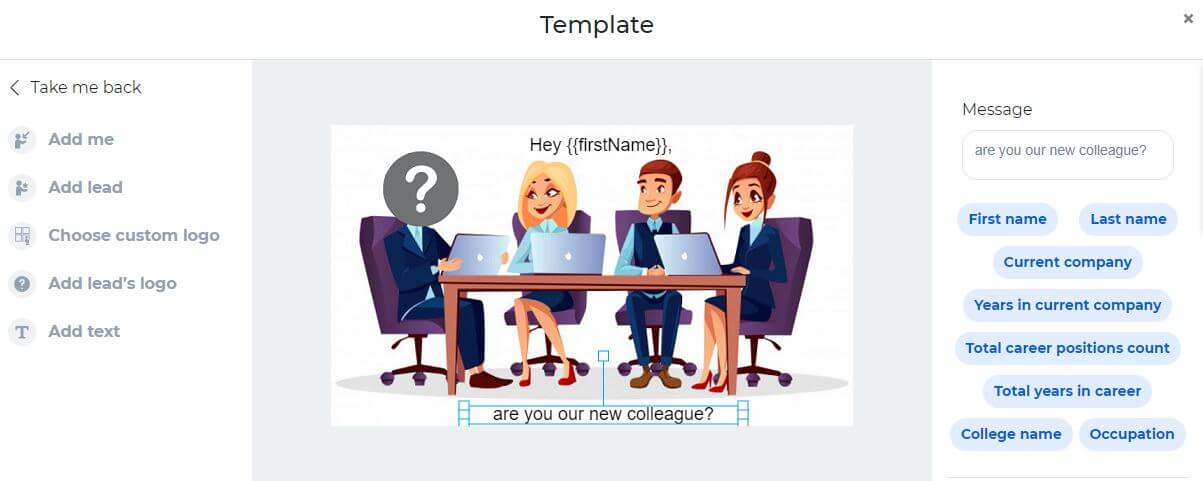
Can you imagine how much you would stand out virtually in the always more competitive world of marketing and communication?

Wanna know more about how Skylead will help your business skyrocket?
Feel free to reach us out on the Support Chat and we can schedule a Success Call to discuss how you can benefit from Skylead the most.
In case you are our new potential user, chat with our Customer Support Team and they will be more than happy to find a solution that fits your needs best.

